AN AMERICAN COMEDY
PROLOGUE
Dear Reader,
This book took me a very long time to write, and a very long time to decide to share it with people.
The genesis of this book was my sophomore year of college. I was attending a private Christian university in Seattle, WA. I grew up in a Christian family in Fullerton, CA. My dad worked for the largest church in town: The First Evangelical Free Church in Fullerton. Up until college, I was a very devout Christian.
Ironically, it was at a Christian university that my faith, and much of my identity, began to unravel. During my sophomore year, I began taking lots of Bible classes. Growing up, I was encouraged to study the Bible, to read it devotionally. But, in college, I began to read the Bible academically. I learned about textual criticism, studied contexts and cultures of when the Bible was written, how it passed through scribes and editors, how a group of clergy decided, hundreds of years after it was written, which books were to be included, and which excluded. To make a long story short, I began to question the Bible as God's infallible word.
To an average college kid, such thoughts might seem normal, even boring and irrelevant. But to me, a sincere, devout, bookish 20-year-old Christian, my doubts and questions were devastating.
My solution to my doubts was to read more, to study more, to grasp at the truth that was crumbing beneath my feet. And the more I read, the deeper my doubts became, and the once solid ground beneath my feet gave way, and I fell into a deep and dark depression. I began having severe stomach pains, intense loneliness, and a level of inner suffering I had never before felt.
In the midst of this, I began to write.
I had always been a pretty shy kid, quiet and introverted. The only outlet for my suffering and confusion were the pages of my journals. Writing became my voice. Quiet and alone, in the throes of pain, I became a writer. I wasn't seeking fame or money. For me writing was, and continues to be, a method of survival. At the time, I wasn't thinking about writing a book. I was just writing.
When my depression became more than I could bear, I returned home to Fullerton, utterly broken inside. But I continued to write. As I went to twice a week therapy, as I tried various anti-depressants, as I started taking art classes at Fullerton College, as I took long, lonely walks through suburban neighborhoods, as I accompanied my parents to church (feeling utterly detached), I wrote. I wrote everything down. One thing that depression can do for you is destroy your ability to lie to yourself. The writing style that worked best for me, that alleviated some my pain, was brutal honesty.
I continued reading, took literature courses, and found, in the voices of writers like Dostoyevsky and Shakespeare and Hemingway and Plath and Achebe and O'Connor and Blake and Byron, kindred spirits, fellow suffering humans trying, in their different ways, to find meaning in this big and lonely world.
Somewhere along the way I began to think about turning my journals into a book. They were personal and weird and tormented, but reading lots of classic literature helped me understand something that had eluded me in 18 years of public education: most of the really good books, the ones that meant something, were about suffering humans trying to find meaning in their lives.
That's what I'd been doing all along. And so, around age 22 or 23, I began compiling my journals into a story, a memoir of sorts.
My biggest problem, for a long time, was that my journal entries were so fragmented and random that they seemed to lack what writers call a "narrative thread." There was no "story arc" that I could see. It was pages and pages of observations, feelings, ideas, drawings. It was, like my head at the time, a mess.
And then I discovered Dante. I had actually read Dante's Inferno in college. Most people are at least aware of that book. It's a 13th century epic Italian poem about a man's descent into hell, the stuff of horror films and goth music…and depressed people.
What many people don't know is that Dante's Inferno is only the first third of a three-part epic called The Divine Comedy. The second part, Purgatorio, is about Dante's slow ascent up an allegorical mountain, as as reaches nearer and hearer to the heavens.
The third and final part of The Divine Comedy is Paradiso, about Dante's journey into heaven, into paradise.
The Divine Comedy is not a comedy in the modern sense. It's not funny. It's filled with suffering and angst and frustration, but it ends well. The classical idea of a comedy is basically a story that begins in misery and ends in happiness.
Something about Dante's epic rang true with me. He wrote it in the midst of a long and lonesome exile. My story, this far, felt like Dante's. I'd been to hell. I was in the process of slowly ascending the mountain of purgatory, of healing. And though I was certainly not happy at the time, the idea of happiness in life gave me hope. I began to believe that happiness was possible, not in some distant afterlife, but here, now, in this life. For a 23-year-old suffering a major depression, this was a revelation.
And so I took the three-part structure of Dante' Divine Comedy and applied it to my book. My experiences in Seattle were hell, a slow descent into torment and loneliness. My experience in therapy, in art classes, in my decision to major in literature, post-hell, were my purgatory. And paradise? When I began compiling my book, paradise was a distant dream, a whisper of hope. Paradise was, to quote the Bible, "a still small voice," a voice that told me, "Don't give up. Keep trying. Keep writing. The story is not finished. This is a comedy, you dummy, not a tragedy, even though it feels like one."
As I continued through college, got my degree, and began teaching college English, I continued writing. Many times, I found myself thinking, What am I doing? I'm not happy. I'm functional, but I'm not happy. For me, purgatory lasted a very long time. About seven years. Interestingly, in those years, as I moved into my own apartment in downtown Fullerton and became an "independent adult," many of my experiences mirrored those in Dante's purgatory. On his journey up the mountain, Dante encounters people with all the classic human flaws and weaknesses, people looking for happiness in all the wrong places…in sex, in drink, in petty jealousies, in power, in wealth. I tried all these avenues (except wealth), and always found myself miserable and empty.
For me, paradise, real happiness, began when some friends and I decided, against all "good judgment" to open a small art gallery in downtown Fullerton. This was in 2008. At the time, the downtown was dominated by bars. Our gallery was a weird little anomaly. But, through the gallery, I found myself starting to share all the passions I'd picked up on my journey of suffering. We had poetry readings, art exhibits, live music performances. And, from the very beginning, our little gallery became a catalyst for artists and writers to come out of their lonely cocoons of torment and see that they were not alone.
The real test, and the real turning point on my journey came about six months after we opened the gallery, when the initial excitement wore off and the financial reality hit. our rent alone was $1500 a month, and there were many months when we didn't sell anything. People came to the shows, but they were mostly like us, poor artists.
It was around this time that a new passion began to stir in me, an idea that changed my life and has made me happier than I ever dreamed I could be. It was not an original idea. It was, in fact, a very old one, an idea the stretched back to my Christian upbringing, to my earliest identity, an idea that would ultimately lead me back to a faith I had long thought impossible.
The idea was this: It is better to give than to receive.
Simple. Cliche. But revolutionary for me.
I began to view the gallery, and other involvements in the downtown community, not as avenues for making myself wealthy, but as gifts, gifts I had been especially well-equipped to give, precisely because of my journey of suffering. The art, music, and literature I'd absorbed like a sponge for years became the substance of my gift.
Now, as part of a vibrantly creative downtown scene, I get to experience paradise every day, in the relationships I've made, in the coffee shops and galleries and poetry and music I hear. The first night of the Downtown Fullerton Art Walk, an idea I'd cooked up a year before, I walked around downtown, past families and students and artists and folks interested in art, and I thought, "For me, this is heaven."
This is not to say that I'm happy and ecstatic all the time. I still suffer depression more often than I'd like. As the wise old Gandalf said, "That wound will never fully heal." But now, in a strange way, I am thankful for my years of lonely exile. C.S. Lewis once said, "The pain then is part of the happiness now."
This is my story, An American Comedy, a journey from hell to heaven, and other places in between. You may be wondering, why does every chapter begin with a letter to someone named Beatrice? Who is Beatrice? In Dante's epic, Beatrice is his muse, a woman who represents love. For me, Beatrice is based on a young woman I met up in Seattle, a woman I actually exchanged letters with for years. The letters to Beatrice are my invocation of the muse, the one who represents the hope of love and happiness in the midst of great suffering.
Sincerely,
Jesse La Tour
Fullerton, CA
December 31, 2011
BOOK 1: HELL
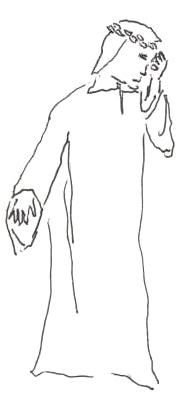
"In the middle of the journey of our life, I came to
myself in a dark wood, for the straight way was lost.
Ah, how hard a thing it is to say what that wood
was, so savage and harsh and strong that the
thought of it renews my fear!
It is so bitter that death is little more so! But to
treat of the good that I found there, I will tell of
the other things I saw."
--Dante, Inferno
CHAPTER 1
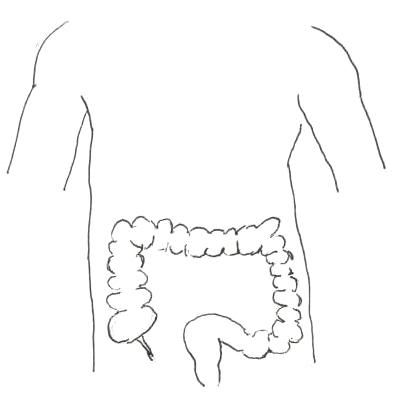
“Father, father, where are you going
O do not walk so fast.
Speak father, speak to your little boy
Or else I shall be lost.”
--William Blake
Dear Beatrice,
I feel compelled to write tonight, I guess because I’m a little scared of death. For the past four months, my health has been getting steadily worse. First it was asthma, and now a mysterious intestinal thing that makes me wake up most mornings in significant pain. I went to our family doctor over Christmas break, Dr. Ogden, but I don’t think the medicine he gave me is really helping. I hope it is.
I suppose it is the chronic pain that has prompted me to ask the question: Why? What is the cause? Is it psychosomatic? Is it a result of all the psychological/emotional/spiritual problems I’m having? It is stress? A lack of love, of significant relationships, of real human contact? All of the above? All I know is that every day, in the midst of pretty severe abdominal pain, I bow my head and beg God to take this from me, whatever it is, to make me whole again.
I am losing weight. I am losing energy. I can’t remember the last time I actually went out with friends. I mostly just lay around a read and pray that one day I will be able to look back and say, “Man, age 20 was a rough one, but I made it through. Look where I am now. I’m happy. I feel close to God.” I’m actually living each day with that hope in mind.
Sincerely,
Jesse
My dad is a thin man, which is interesting because he comes from Wisconsin, which is full of fat people. But we have lived for many years in Orange County, which is not full of fat people. My dad is driving me back to Seattle for my third semester of college. I go to Seattle Pacific University, a private Methodist University. We are not Methodist. We are Evangelical.
I’m wearing a well-worn gray zip-up sweatshirt, old blue jeans and no shoes. My dad wears cargo shorts, sandals with white socks, and a t-shirt tucked into his shorts. We prefer different styles of clothing.
In our room at the Hi-Lo Motel, My dad and I lay on our beds reading. I’m reading Dostoyevsky’s Notes From Underground. My dad is reading the Bible. And then my dad begins writing in his brown leather-bound journal. I wonder what he is writing. He writes for a living. He is the “communications director” for the First Evangelical Free Church in Fullerton. He’s “ghost written” a couple books for the pastor. I begin writing in my black notebook.
I lay awake in bed in the darkness of this hotel room, pressing a hand against my side to suppress the pain, and thinking about an article I saw in a Newsweek magazine in the waiting room of Dr. Ogden’s office. It was called “Colon Cancer: A Silent Epidemic.” Colon Cancer. The words stick in my mind like a thorn. Colon cancer. Cancer of the colon. I press my fingers around the area where my colon is. Are there lumps?
My dad is snoring peacefully in his bed. I stand up, put on my shoes and sweatshirt, and slip out the door into the cold night air. I lean against a metal railing and look up at the sky full of stars. I close my eyes and grip the metal railing tightly.
Yesterday was a little sunny, but today is bleak. It reminds me of last winter, my first Seattle winter, the rainiest winter in 40 years. It rained for 90 days straight. It was during the winter that I obtained an original Nintendo Entertainment System and played and passed all the games I had never passed as a child: Metroid, all three Super Mario games, Mega Man II, and Contra.
That winter, I played a lot of video games, listened to “emo” music, which was a relatively new genre at the time (this was 1998), viewed porn on the internet, got drunk occasionally, made the transition from a “social smoker” to a full-blown regular smoker, took walks alone downtown, stopped going to church, read The Plague by Albert Camus, and secretly pined for Beatrice.
I remember, near the end of last semester, we were all sitting in the Stearns Cafeteria, and Nathanael blurted out that Beatrice liked me. Beatrice, who I had pined for all year. We lived on the same floor of Hill Hall, she on the girls’ side, and me on the boys’. But, in short, I was too shy and afraid. In retrospect, it sounds so childish, so juvenile, but at that moment, in the Stearns Cafeteria, eating a soggy turkey sandwich, I felt the first chill of despair. She is gone. She moved back to Minnesota, which probably has a lot of fat people too, because it is the midwest and people are less concerned about their weight in the American midwest. Beatrice, however, is not fat. She is just right.
“Goodbye, bud,” my dad says, embracing me.
“Goodbye, Dad,” I say quietly, lamely returning my dad’s embrace.
I watch my dad climb into his white Toyota Camry and drive away.
CHAPTER 2
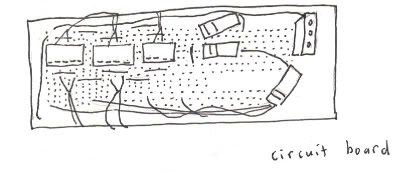
“From then on it was probably necessary to begin to think that there was no center.”
--Jacques Derrida
Dear Beatrice,
I am afraid I am losing my faith in the God of Christianity. I certainly believe in God, because I see no other reasonable explanation for the origin of the universe. Out of nothing, nothing comes. But what reason do I have to believe that Christian doctrine and tradition and the Bible are the true representations of God?
My claim that the God of Christianity is true makes all other expressions of God untrue. The Allah of Islam is false. The gods of the thousands of tribes throughout Africa and Asia and Latin America are false. Not only this, but those people, and the generations of people before them, are destined for eternal suffering in hell. Common sense tells me that this is not fair. What if the only truth is that all cultures develop their conception of the divine?
But, if God is spirit, my experience of Him/Her/It cannot be wholly rational. It must be, in a sense, extra-sensory. But this seems like mere speculation. Have I ever experienced God? Do I really believe in an afterlife? I don’t know. I am terrified to find out. And yet, in the midst of suffering and loneliness, my first instinct is to cry out to God. But it could be reasonably argued that this practice has been built into my psyche since I have been cognitive.
I am utterly frustrated that everything is so uncertain. All I know is what I feel and what I think. And, if these are my guides, I feel I am doomed to perpetual speculation and uncertainty. Some say that God finds us. If so, I say, “Here I am, God. Do you care that I am doubting you? I don’t want to let you go, but my mind is a slave to reason. Save me from myself!”
Sincerely,
Jesse
I walk down 3rd Avenue, down Queen Anne hill. The sidewalk has cracks. Don’t step on a crack or you’ll break your mother’s back. At first I try to avoid the cracks, like a little game with myself. Then I step on a crack and I imagine my mom, way down in Orange County, spasming in intense pain and writhing on the ground. One minute she’s at a garage sale, looking at a pair of Guess jeans, trying to get the owner to accept a quarter instead of fifty cents for them, and the next she’s convulsing on the driveway. I broke her back, by stepping on this crack.
My first class is called “The Latter Prophets.” It’s an upper division Bible class that I’m taking not because I need it, but because I really just want to understand the Bible, apart from memory verses and Sunday school stories.
Last semester I took this class called “Christian Scriptures,” which was basically the whole Bible in one semester. That class sort of like “whetted my appetite” for biblical studies. I read and studied the Bible with new eyes. This book, this painfully familiar book, became unfamiliar, bizarre, awful, beautiful, challenging. Many nights I would sit alone in a corner of the library until closing hours, studying my Cambridge Annotated Study Bible, trying to make sense of these complex, weird stories. The stories they didn’t teach me in Sunday school.
For some reason, my asthma really bothers me in this class--a tightening in my chest and a scary feeling like I can’t draw a full breath. This is how I remember this class--taking detailed notes on the Bible and struggling to breathe.
I walk into my “Latter Prophets” class and take a seat near the middle. A young man with a beard and glasses is sitting in front of me. I recognize him from my “History of Christianity (Early to Medieval)” class last semester. His name is Alex or Allen or something. A_____ turns around and says, “What’s up?”
“Hey.”
“Have you had Dr. Vanderhoven before?”
“I have not.”
“He’s a trip. He’s sort of like the black sheep of the biblical studies department.”
“How’s that?”
“Well, pretty much all of the professors here are ‘canonical critics’ but Dr. Vanderhoven is a ‘textual critic.’”
“Interesting,” I say, pretending that I know what “canonical critic” and “textual critic” mean. (I do not).
Then a chubby, middle-aged man with gray, thinning hair and an almost like unnaturally pale complexion walks in. He’s wearing a t-shirt (one of those “nature“ shirts that has a picture of a wolf in a forest scene, that you get from like a gift shop in Yosemite) that exposes more of his pale body than I would like to see, and shorts that expose more of his stubby, corpulent, pale legs than any man of this man’s age, weight, and complexion should expose to the public, in my opinion.
“Good morning, class,” the man says in a tone that seems, also, oddly inappropriate for the setting. It’s this cheesy, cheerful tone, like the way you might expect elementary (or Sunday) school teachers to talk to their classes.
“My name is Doctor Vanderhoven and this is the Latter Prophets, as opposed to the Former Prophets.” I can’t tell if this is meant as a joke.
“But before I get into the syllabus and all that, I’d like to give you all a little ‘heads up’ (he actually makes quotation signs with his fingers) on my health situation. For the past four years, I’ve been afflicted with a rare disease in which my gallbladder has dried up to something like a bag of sand. Thus, I’ve lived the past four years of my life in a state of chronic severe pain.”
“I’m telling you this,” Dr.Vanderhoven continues, “So that if I am forced to miss any class, you will know the likely reason why. I will either be confined to my bed, or in the hospital.” There is, I suspect, in Dr. Vanderhoven’s cheery voice, more than a hint of weary irony. Dr. V then explains how, although the class is entitled “The Latter Prophets,” the focus will be exclusively on the book of Isaiah, which happens to be Dr. V’s area of specialty. He passes out the syllabus and gives a general introduction to Isaianic studies and textual criticism. I’m paraphrasing and condensing here, because Dr. V is not exactly what I would call “a riveting lecturer,” so I will not try your patience with more of his actual words.
In this first class, I learn that the book of Isaiah probably had at least three authors, who wrote in different centuries, and that most, if not all, of the “Messianic” prophecies that Christians like to point to in Isaiah as proof of the Bible’s divine authority, actually refer to socio-political events from the time of the various authors, and therefore not to Jesus Christ.
I listen to all this with rapt attention, scribbling notes furiously in my spiral notebook.
When Dr. V‘s class ends, I walk toward the door with A______ trailing behind me. He’s trying to kindle some kind of theological discussion. I’m not in the mood.
“Hey, Jesse. What do you think of this? If the Messianic prophecies refer to events from Israel’s history, is it possible that they have like a dual fulfillment in Jesus?”
“That’s an interesting question.”
As I descend the stairs in Tiffany Hall, surrounded by students, I feel something like a small burst in my intestines, followed by a brief, searing pain. I almost fall, but catch myself on the railing.
“You alright?”
“Yeah, I just tripped.”
In the cafeteria I am greeted by the dull roar of hundreds of indistinct voices. I take a tray from a large stack and approach the salad bar. Though I’ve eaten nothing yet today, I have like no appetite. I am eating because I know I need to eat to live. This is survival. I fill my plate with spinach leaves (for iron) and egg (for protein). I find a seat beneath a large window. Suddenly, from behind, I hear a voice, “La Tour!”
Turning around, I see two of my dorm-mates from last year: Clark and Randall, both electrical engineering majors and both missionary kids (MKs) and therefore both pretty socially retarded. Mark refers to them simply as “The Nerds.” Randall is actually carrying some sort of circuit board in one hand and a tray of muffins in the other.
“Hey guys,” I say. Somehow their presence, their total lack of self-consciousness about their uncoolness, has a sort of calming effect upon me.
“Mind if we join you?” Clark asks.
“Not at all.”
As we eat our cafeteria food, we make small talk, catching up on living conditions and how we spent our Christmas breaks (Randall visited his family in Taipei; Clark stayed in his room and played role playing games [RPGs] online). We reminisce on the good old days in Hill Hall (our dorm). I wonder if Randall and Clark are suffering like I am.
My next class is entitled simply “World Literature.” There are only three required texts: Homer’s Odyssey, Dante’s Inferno, and Dostoyevsky’s The Brothers Karamazov.
“This is so typical,” I hear a girl next to me say not too quietly to the girl next to her, “We’re only reading texts by white, western men. This is world literature? I thought we were past this sort of hegemony.”
Dr. David Thornton is a thin, balding, bearded man who actually looks like the portrait of Dostoyevsky from the copy of Crime and Punishment that I read over the summer. Dr. T says, “Now, who can give me a definition of an epic?”
For me, a book store is one of the best laxatives around. Whenever I enter a book store, I inevitably have to shit. And so, as I walk down an aisle of the SPU bookstore, scanning the titles of books, I really have to go. This is amplified by the already-present pain in my bowels.
But this bookstore does not have a bathroom. I know this because last semester, when I was buying my books, I (of course) had to shit, but had to walk all the way back to my dorm, and then come back to buy my books.
I can hold it. I will just get my books and get out. Ten minutes. Fifteen max.
My eyes catch the title of a book: Toward a Theology of Beauty. That sounds interesting.
I find the biblical studies aisle and my books: Isaiah 1-39 by R.N. Whybray, Deutero-Isiah by J. Barton, and Trito-Isaiah by A Winterson.
In the literature section, I find copies of The Odyssey (it has waves on the cover), The Inferno (it has flames on the cover), and The Brothers Karamazov (it has a cross on the cover).
Fuck. The line is so long. As I stand in line, holding my stack of books, and testing the tensile strength of my rectum, I hear a familiar voice behind me, “Little La Tour!” I turn and see Simon McNulty and Brad Sanders, two of my brother’s old roommates. It was with these characters that I first got drunk in college, on cans of Miller High Life, at a poker party, and after just four cans I ended up on the floor of a dirty bathroom, vomiting into a paper Thriftway bag.
“Wazzup, little La Tour!” Brad Sanders says, clapping me on the shoulder, so that I almost drop the stack of books I am carrying, and a little shit actually escapes my butt. I can feel it in my underwear. Shit. Does anyone smell it?
“Oh, not much. Just getting my books.”
Brad is tall and thin and blonde-haired and, by conventional standards, quite a good looking guy, though he is kind of a bro. Once, I heard him talking about his girlfriend “tossing his salad” and so that’s the mental picture that usually pops up when I run into Brad Sanders. A girl licking his butt-hole.
“Aiight, take it easy, Little La Tour.” I don’t like that nickname. It literally belittles me.
The pain is still there, and I am trying like hell to contain it. This shit wants out.
CHAPTER 3
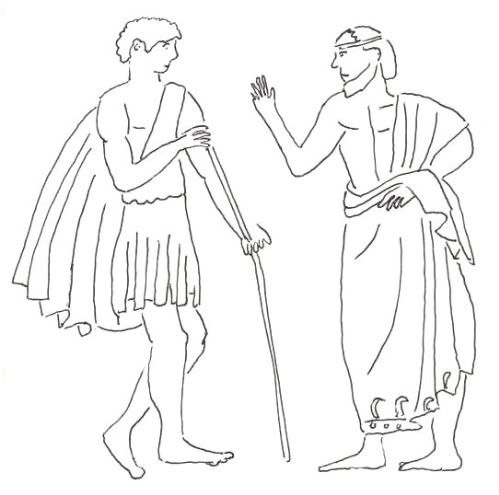
"And I will show you something different from either
Your shadow at morning striding behind you
Or your shadow at evening rising to meet you;
I will show you fear in a handful of dust."
--T.S. Eliot
Dear Beatrice,
I’ve been reading about Greek mythology. The Greek gods were so human. Everything hinged on the individual, the frail and helpless individual. I feel like like Daedalus, trying desperately to fashion wings of escape from the maze of my own confusion. But I am fumbling in the dark, pursued by monsters, wondering how I got here, and how I will escape.
Sincerely,
Jesse
I’m trying to put the events of The Odyssey in sequence in my head. The council of the gods. Circe’s island. The Lotos Eaters. The Cyclops. Scylla and Charybdis. Helios and the bulls. Or is that after the Cyclops? My head feels light and cloudy. I struggle to force clarity of thought. This mental exercise-a simple arrangement of events-will prove that my brain still works. But something is wrong. I’m too cloudy.
What is wrong with me? Last semester I remember walking along this same canal, my mind reeling with thoughts so clear and deep and beautiful and complex, they felt more real than the trees and sky and water and geese that surrounded me. I thought wonderful things, intellectual things, as if using my wonderful mind for the first time. Last semester I wrote in my journal, “To fly out of the maze on wings of my own creation!” as I struggled to breathe.
But something is clouding my mind. Like the thing that is laying hold of my gut and making me shit blood and double over with pain. Last semester I thought, Let my body suffer. I have my mind. But the thing in my body has found my mind. And, walking alone across Fremont Bridge, looking through fearful eyes at the dark waters below, I shiver.
I work in Puget Consumers Co-Op (PCC), a posh health food store similar to Trader Joes or Whole Foods, but less corporate. I am a stocker and occasional bag boy. The store has a health foody smell, like spices and patchouli. The smell is half from the products in the store and half from the customers and employees who populate it.
As I enter through the automatic doors and am greeted by Jeff, the pot-smoking juice maker, I feel an emergency in my bowels, a churning and an expanding.
“Hey Jesse,” Sarah, the overweight goth-girl checker says as I wave awkwardly and walk briskly past her toward the bathroom. I feel the handle. The door is locked. Oh shit. It takes all my force of will to keep the shit from escaping my bowels. The pain is significant. I wince and stare at the bathroom door. Someone has put a sticker on it that reads, “The only Bush I want is my own.” I get this image of a puff of curly hair wearing a suit, sitting in the oval office. President Bush. That’s kind of funny, but a searing wave of pain that starts in my abdomen and pulses outward to my extremities rips my mind from all things funny and forced it to focus only on itself.
Finally, when I’m certain I can no longer contain the volcano in my gut and that I will spray blood-red shit into my jeans and down my legs, I hear a flush inside, and the running of water. Hope.
The door opens and Charlie (who works in produce) walks out. Charlie and I exchange awkward wordless glances--the knowing glances of two people who know and recognize the stinking waste their bodies produce, and are embarrassed.
I rush inside, lock the door, fling my pants down, sit down (without using the seat cover--rare for me) and liquid explodes from my colon. When it is finished, I peer down between my legs . The water is a dark red-brown. The sight of it makes me more light-headed.
When finished, I stand up and watch as the red-browm mass swirls down and is replaced by clear water. I stand looking in the bathroom mirror. I look very pale.
Telemachus gets the message. Goes to seek his father. Penelope and the suitors. The island of Calypso. The swineherd. Oh, my swineherd. Wine-dark sea. Wine. Swine. What comes next? Was Calypso before Telemachus? My head, my head.
I am stacking cans of gluten-free soy giblets onto a metal shelf. I hold the can in my hand and a familiar thought enters my mind: What if I just throw it? Just fling it across the aisles and maybe hit some unsuspecting shopper in the head, or at least scare them? It’s a familiar impulse--to do or say the unthinkable. Like in high school when I worked at Longs Drugs and once, opening a box of stationery with a razor box cutter and an old woman with fat, wrinkly legs walked by, and I thought of making just a little slice on the back of her white leg, so thin she would not notice until maybe someone pointed out that there was blood running down her leg.
And now I am stacking cans of organic low fat low sodium black beans. The fight with the suitors, and reclaiming the throne. And that moment when Penolope looks upon her blood-soaked husband and maybe she is horrified and maybe she is glad, or maybe both. What were those lines? I am forcing my mind to recall Odysseus’ first words to his wife, but I cannot. I want to cry. What is wrong with my head?
And then I am filling plastic bins with various grains-spelt, wheat, whole wheat, millet, barley, rye. And, frustrated, I try again to put the events in their proper order: The council of the gods… As if my sanity depends on it. But the pain in my gut returns, and I press my hand to my side and hunch over. I feel another emergency approaching. When I stand up, I see stars. Little flashes of silver are exploding all around PCC. I feel faint, as if I will fall over. As if my head is detaching from my body. As if I am disappearing. I clutch my side and think/pray:
Please don’t let me disappear.
I touch the tops of the grain bins, feel the plastic on my fingers, seek refuge in the world of objects. But my gut still burns and my head still detaches, and my body looks unreal, as if it is another person, as if my head has disappeared. And the emergency is imminent.
In the bathroom, more dark brown-red liquid. Am I dying? Is this cancer. Cast all your cares upon him, comes the voice of my mother. I cast my terror upon him. But those are just words in my head. I cannot literally take my pain or fear and put them on God. I still feel like I am dying, and I bury my face in my hands and, after wiping, when I stand up, the stars are blazing all around inside my eyes.
The face in the mirror is a ghost-face.
I find my manager Tina, a middle-aged lesbian with cancer, and say I feel sick and want to call my brother and go home. Tina says okay.
I am standing outside PCC, under the awning because it’s raining, and it’s also damn cold. It’s really damn cold and all I have is this thin little jacket--just like a half a millimeter of cloth between me and this cold. It’s not enough. I hug myself with my arms, but I can’t keep myself warm.
Finally, Seth arrives.
I run quickly through the rain to his car and get in quickly to avoid the rain. Inside it is warm and music is playing. It’s Counting Crows--Seth’s favorite band. The singer sings, Step out the front door like a ghost into a fog where no one notices the contrast of white on white.
“Hey bro,” Seth says.
“Hey.”
“How are you feeling?”
“Not too good.”
“What is ‘Not too good?’”
“Like digestive problems.”
I think that, after children’s cancer wards and like the slums of Calcutta, and some parts of Africa, emergency rooms are like the most depressing places on earth.
I think it’s funny how that show “ER” represents emergency rooms. I guess I mean maybe there’s some drama in those places, but my experience of ERs has been hours and hours of monotonous, uneventful waiting and waiting, and then hasty treatment. I think there should be a show called “ER Waiting Room.” And it’s just like four hours of people sitting in chairs, watching like “The People’s Court.” Maybe one guy is holding an ice-pack to his head.
So me and Seth are sitting in this ER waiting room and the only thing breaking the monotony is the rising and falling pain in my abdomen. But it’s not exactly entertaining.
Seth is doing a crossword puzzle. He is amazing at crossword puzzles. I suck. My brain doesn’t work that way, or I just don’t have the patience for them.
“Hey bro, what’s the book before Psalms, in the Bible? Three letters.”
“Job.”
“Nice. Thanks.”
A nurse calls my name, and leads me to a room.
I’m standing outside my apartment building and of course it’s raining. I hug my bookbag to myself to protect the books, but nothing protects me.
Then Seth pulls up and I run through the rain to his car.
“Does it ever stop raining here?” I ask.
“Yeah. Give it a few months. How’re you feeling?”
“Okay. A little nervous, I guess.”
“You’re gonna be alright.”
He sings along to the song, I said momma, momma, momma, why am I so alone? I can’t go outside I’m scared I might not make it home.
“C’mon,” he says, “Sing along.”
“I’m really not in the mood.”
“You’re too moody. Sing it out, bro: I belong in the service of the Queen. I belong anywhere but in between. Cus I-y-I am...the Rain King.
“So, how’re your classes?” he asks.
“Okay.”
“You reading anything good?”
“The Inferno.”
“Oh yeah, that’s right. You have Thornton. I had that class.”
“Yeah.”
“Are you reading the Pinsky translation?”
“No, it’s this new one, Martinez.”
“So, what’s your favorite part?”
“I don’t know if I have one. I mean it’s all really good, but I wouldn’t exactly call it an enjoyable read.”
“Yeah, it’s kind of a downer.”
“Literally.”
“Hey, good one.”
Seth parks and we walk inside Virginia Mason Hospital. The electric double doors open and inside is the buzz of activity. Everything is flooded with fluorescent light. It bothers my eyes. A nurse wheels this really fat guy past me in a wheel chair. A man stands by the elevator coughing violently. A very old man is helping a very old woman walk slowly, slowly down a hallway. A baby is crying somewhere. It’s all too much. I can’t sort through the chaos of this world, and my head starts to detach. I am an unreal person amidst real people.
Then I feel my brother’s hand on my shoulder.
“This way, bro,” he says, and leads me to the reception desk.
Inside the elevator is a middle aged woman wearing overalls and a boy of perhaps nine years (She is not wearing the boy; she is with the boy.). The boy’s eyes are red, from either tiredness or crying or both.
We take the elevator to the third floor and find Dr. Samuels’ office. The sign on the door reads:
Gasteronology
Dr. Wayne Samuels, M.D.
Dr. Claudia Jervis-Shin, M.D.
These words flash through my mind: Abandon all hope, ye who enter.
We open the door and enter a fairly ordinary-looking doctor’s office. The paintings are pastel beach scenes. There are plastic plants in decorative pots. It is meant to evoke peace, serenity. But I am aware of its artificial construction. Aware that, beyond this world of beach scenes and fake plastic plants and Better Homes and Gardens magazines lies a world of metallic equipment, machines and devices for probing, penetrating, and cutting flesh. I cannot take comfort in this artificial world.
The girl at the reception desk is very pretty.
“Is this your first time here” she asks.
“Yeah.”
She hands me a clip-board with forms on it.
This bureaucratic necessity makes my head detach more. I am in this waiting room.
“Jesse, you were grinding your teeth again last night,” Mark (my roommate) says.
“Was I?”
“It sounded awful, like you were ripping your jaws apart.”
I nod and walk out of the room.
I step out of the apartment into another overcast day. The rain falls from the opaque gray clouds above. The clouds cover the city like a canopy. I can’t remember the last sunny day. The water pelts my head and drenches my hair, like a baptism I don’t want.
By the time I reach the chapel, I am thoroughly soaked. Students walk by on either side, holding umbrellas and folders and backpacks over their heads to block the rain. My hair is dripping. I think of using the Bible tucked under my arm to block the downpour, but I do not.
Inside, it smells of mildew, incense, and that strange blend of perfumes and colognes that people use to hide their natural stench.
I take a seat in the back, as usual. I look around, at the people still filing in, at the backs of peoples’ heads seated in the pews before me. I look up at the stained-glass window depicting Christ’s crucifixion. I stare at it for a long time, as a man in a Hawaiian shirt gives a talk about missions, as a young man with styled blonde hair leads college students in praise choruses. I stare at Jesus, alone, the suffering Christ, the dying God.
CHAPTER 4
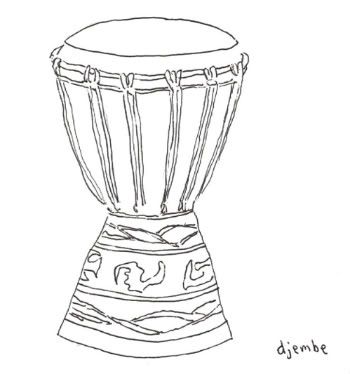

"They fell in, soon enough, with Lotos Eaters,
who showed no will to do us harm, only
offering the sweet Lotos to our friends--
but those who ate this honeyed plant, the Lotos,
never cared to report, nor to return:
they longed to stay forever, browsing on
that native bloom, forgetful of their homeland."
--Homer
Dear Beatrice,
I tried pot for the first time last night. I wanted to feel something different from pain, and I thought pot might be just the thing, but it was not. Last night was the first time I ever really feared for my sanity. The pot changed something in my head, something that did not change back, even after the “high” wore off. I feel somehow detached from nyself. I look at my hands, my body, and it feels like another person. Oh, Beatrice, this is really terrifying. If you still believe in God, please pray for me.
Sincerely,
Jesse
Inside Sam’s house it’s dark and smells like strange incense. The only light is the shifting flicker of the television. Two men sit on the couch--one drinking a beer, the other smoking what I believe to be a marijuana pipe. The coffee table is littered with beer cans and little piles of ash. They’re playing a video game, a fighting game in which the winner gets to actually kill his opponent by tearing out his heart, or his spine, or perhaps by slicing him in half with a sword. Loud rap music blares from two massive speakers on either side of the television. The blending of the rap music with the grunts and wails of the video game creates a chaos of noise. It’s dark in here. I want to leave and I want to stay. The young men do not acknowledge us as we walk past. Their eyes look dead.
“Let me show you my room,” Sam says.
Sam’s room is in the basement of the house. We descend the stairs, and when we enter the dark room, Sam flips on a black light. There’s this huge Bob Marley poster on the wall, and another fluorescent poster with a picture of a colorful mushroom that glows strangely in the black light.
“You wanna see my djembeh?” Sam asks.
“What’s a djembeh?”
He pulls out a large, bongo-like drum from behind a dresser.
“This is a djembeh.”
“Oh, a drum, cool.”
“I take it downtown sometimes when they have drum circles,” he says, rapping the jembeh with the palm of his hand, making a series of booming sounds.
“That’s neat. Can I try?”
Sam hands me the djembe and I rap on it a few times.
“Cool,” I say, and hand it back to Sam.
“So, you wanna smoke some pot?” Sam asks.
“Sure.”
Back upstairs with the loud music and video games, Sam slowly rolls a joint, in deep concentration, as if constructing some delicate and precious thing. I’ve seen this done once, in a Cheech and Chong movie that I watched at my friend Luke Smude’s house in ninth grade.
Then Sam lights the joint and takes a “hit” and then smiles and then hands the joint to me. What am I doing here with these guys? Do I have dead eyes?
“Take a hit,” Sam says.
I put it in my mouth and suck in the smoke, and then take a deep breath, holding it in for a long time. It’s not like cigarette smoke where you can feel the smoke go down. It’s real smooth, and almost undetectable, which makes me wonder if I did it right. But then I breathe out the smoke and I know I have taken a big hit. I hand the joint back to Sam.
We pass around the joint until it’s gone. I take three more hits. On the television, one character is biting the head of another character’s head and there is blood coming out.
At first, I feel nothing, sitting in my chair, staring at the television. Then, slowly, the room around me starts like moving. Is the room moving or am I moving? Does the world move or do I? There is Sam. I cannot hold my eyes on Sam. Everything is moving. That’s nice. Then, it’s not nice. Do I have a fever? What is this room? I don’t want this fever. I don’t want this fever in my brain. It’s not stopping. I am in this chair. I am here. In this house. There is Sam. There’s the TV. There’s that guy. There’s that guy ripping that guy in half. Why is he ripping him in half? I will bring myself back to myself. I cannot.
“How does it feel?” Is that Sam? Who is Sam?
“Alright.” Is that me? Who is me?
No. Not this now. Not this thing in the stomach too. I am doing this thing with the smoke to get away from that.
Now they are passing around a pipe. I take a hit of the pipe. It comes fast this time. It feels good. Thank God. Pleasure. Pleasure is good. But then there is too much pleasure. I am dying of pleasure.
“Hey Jesse, you wanna play me?” That’s Sam. He’s offering me a controller. That’s nice Sam. Sam is nice.
“Okay.” How am I talking? How does that work with the brain and the mouth? And the arms. How do these arms work? That man is stabbing that man with a spear. That man is me. He is bleeding to death.
Why am I smiling and laughing? I just died.
“I can’t.” That’s me. Sam and Joe and that guy are laughing. The room is laughing.
There are chemicals in my brain. Just these little chemicals. Pretty chemicals. Happy chemicals. Sad chemicals. Pain chemicals. That’s all it is. Just chemicals.
In Nathanael’s car, loud music is playing. Love...Love will tear us apart...again. We park on the street in a suburb. The night air is cold, but it’s not raining. We approach an old house. Young people stand on the porch, talking, and smoking, and the upstairs window glows with a strange blue light.
I follow silently, waving at a girl I recognize from my Romantic literature class last semester. She has a cute face and a fat body. She is sitting on a couch on the porch, holding a bottle of beer in one hand, and a cigarette in the other, and talking loudly to a young man who sits beside her.
I follow Nathanael and Mark into the house and we enter into another, darker, warmer world, more alive with sound and movement.
Many dancing bodies. A very crowded room. Show me show me show me how you do that trick. The one that makes me scream she said. The one that makes me laugh she said. O Beatrice. Nathan dances and weaves through the crowd. Matt and I follow in his wake, not dancing. It smells of beer and perfume and bodies.
The kitchen is light and crowded. A few girls lean against the counter by the sink, talking and mixing cocktails, and others sit around a table, eating chips and salsa and drinking shot glasses of tequila.
Nathanael walks toward the girls by the sink and begins talking to them as if he knows them very well (he does not). He is mixing drinks. Then he hands one to Mark and one to me.
“Tequila Sunrise,” he says.
We stand awhile drinking our sweet cocktails, listening to Nathanael talk to the girls.
Back in the living room. Punctured bicycle on a hillside desolate. Will nature make a man of me yet? Nathanael and Mark dancing with the girls, me sitting in a chair by myself, against the wall. Nathan keeps giving me these “Get your shy ass out here and dance” glances. I’m sitting and sipping my Tequila Sunrise.
Oh, my fast beating heart. The dancers, the pulsing music, the darkness, the smells. The bodies and the music move together.
I find a bathroom. My shit is blood.
I can’t bear this fear. I stare into the toilet bowl at the red water, and I see a faint reflection of my face in the water--the ghost-face. I flush the toilet and watch the red wash away and return to white again.
My face in the mirror. I look older and thinner and more tired than I’ve ever looked. I’m an old man, sickly and frail, staring at himself. I will die soon. Who is that man? The muffled sound of the music from the living room. Loud knocking on the door.
“Just a moment,” I say weakly. I splash some water on my face, run my fingers through my hair, and open the door. It’s a girl, waiting. The putrid, lingering smell of my shit in the bathroom and I am embarrassed. I catch the girl’s eyes for a moment, blush, and then look down, and walk past her back into the living room and the loud music and the darkness and the dancing people.
Mark and Nathanael are still dancing with the same girls. They are attractive and youthful and full of life, thinking only of dancing and music and kissing and the tingling desire for the touch of another young body. Why ponder life’s complexity when the leather runs smooth on the passenger seat?
I am a thing cut off, an objective observer. Do they understand the importance of these moments? Are these moments important?
Mark and I are sitting at the kitchen table and we are eating tofu stir fry that I made. It’s my first time making tofu stir fry and it’s not very good. Mark is writing in a notebook.
“What’re you doing?” I ask.
“Working on my philosophy paper.”
“Oh yeah? What’s it on?”
“My working title is ‘God is not omnipotent.’”
“Interesting.”
“Yeah, I’m basically arguing that the Christian notion of an omnipotent God is rationally untenable. I’m using Cartesian logic and a bit of Kant.” These names mean very little to me.
“So, why isn’t God omnipotent?” I ask.
“I guess my argument is a more complex version of the ‘Can God create a rock so big He cannot lift it?’ paradox. Or, can ‘God create a square circle?’”
“It does seem impossible.”
“Exactly. There are things even God cannot do.”
“Do you believe in God?” I ask.
“Of course not,” he replies, as if the question is ridiculous.
“So what does it matter whether God is omnipotent or not if you don’t even believe He exists?”
Mark brushes his long black bangs from his face with the back of his hand and says, “It’s not about God. It’s about making a fucking argument.”
I sit there processing this statement, and chewing a piece of bland tofu. Then I try to imagine a square circle. And then I imagine God as a man, like a body builder, struggling, struggling to lift an enormous rock. And I think of Atlas holding the world, and it toppling off his shoulders. And I think of Sisyphus pushing that big old rock in Hades, and hard as he tries, he cannot push it all the way up the hill. And I think of the song, “He’s got the whole world in his hands.” And I imagine these enormous hands, the hands of God (They look like the hands of my father), struggling to bear the weight of a very heavy world, and then dropping it and it falling, falling, into the infinite black abyss of space.
CHAPTER 5
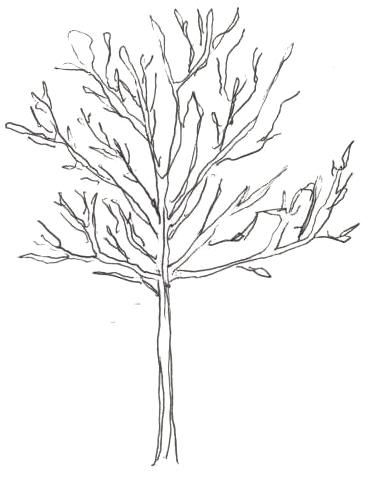

“He was in full possession of his physical senses. They were, indeed, preternaturally keen and alert. Something in the awful disturbance of his organic system had so exalted and refined them that they made record of things never before perceived.”
--Ambrose Bierce
Dear Beatrice,
People tell me that sin is cultural, that we have created the concept of “sinner” and “original sin” through a long tradition of Judeo-Christianity. Once, when I was 14, I pointed the barrel of a pellet gun at a small finch and blasted off half its face. But then I cried.
I have done things that have made me feel guilty. But, if I’m honest, that’s not all of who I am. I have walked alone along a boat canal in the evening. I have cried at the words of Ernest Hemingway. I have cried myself to sleep at night for no other reason than a general feeling of sadness. I have felt genuine compassion for an old man for reasons I couldn’t understand. I have been aftraid to fall asleep at night for fear I would not wake in the morning. I have played frisbee with my brother on a crisp morning when the grass was white with frost.
I will say that I am incomplete, that I have never known “completeness.” I want to find it in God. I want to raise my hands and finally and really understand this grace I’ve heard and talked about all my life, but sometimes it just seems so unclear, and of a different sort than I understand. I expect it to be unexpected, and I desperately want it to be real. But I am afraid that this “real” might be quite different from what I suppose it should be.
Sincerely,
Jesse
I’ve heard about students who visit their professors during office hours and have terrifically interesting conversations. My brother is one of these students. I’ve seen him walking across campus with professors, engaged in what I presume to be terrifically interesting conversations. I am not one of those students. In my college career thus far, I’ve felt pretty intimidated about talking to a professor in a one-on-one setting. I have trouble holding conversations with my friends. How could I hold a conversation with the possessor of a doctorate degree? What would I say? I would sound like a dumb-shit.
But today I am visiting a professor during office hours and I don’t completely understand why. I don’t have a class-related question. I don’t have a gripe about my grade. And yet I am ascending the stairs of Tiffany Hall toward the office of Dr. Luke Reinsma. I guess I just want someone to talk to. A confessor of sorts.
“Jesse! Come on in!”
“Hello, Dr. Reinsma.”
“Have a seat.”
“Thanks. Are you busy?”
“Nope. What’s on your mind?”
He has this like nervous habit of messing up the hair on the front of his head as he’s talking, so it looks like a big gray poof.
“I just sort of wanted to chat.”
“Splendid. Let us chat. How’s life?”
“Okay, I guess.”
And then I say, “There’s this thing, like a question, that’s been bothering me.”
“What’s that?”
I look at my shoes as I say, “Well, I think I’m in the midst of, like, a crisis of faith.”
“Meaning what?” He messes up his hair for the third time.
“Meaning I’m having pretty serious doubts about Christianity.”
“Okay, like what?”
I think a moment, playing with a piece of rubber from the sole of my shoe, and then I say, “Like I’m not so sure about the idea of hell. I mean, what do you think about hell?”
And then he messes up his hair and says, with a kind of strange conviction, “I stopped believing in hell ten years ago, when I visited China.”
“Really?” My abdomen cramps badly.
“I was working with these wonderful Buddhists, and getting to know them pretty well, and I just refused to believe that these people, and all the billions of people in places like China who believe things different from me, are going to hell. It seemed morally absurd.”
I sit for a moment, nodding, and registering the fact that a professor at a Christian university has just confessed to me that he doesn’t believe in hell. I was kind of expecting some sort of comfort. I wanted an educated man, an older man, to affirm that he was still a believer. But Dr. Reynolds was instead reinforcing my doubt. I was not comforted. I felt more alone.
I’ve got this idea for a story. I think there’s something important in my head. I’ve been thinking about death lately, like the thing in my gut is colon cancer and I might die young. I feel I have to write. I imagine writing a great story--a story that will live after I die. So, I take out my black notebook and pen and write.
The temperature is brisk, borderline cold. The chill air stings my face and hands. There’s the soccer field. A layer of white dew on the artificial turf looks like frost. Seth and I played frisbee there. How long ago was that?
There’s the university, good ol’ SPU. What’s Professor Vanderhoven doing today? Maybe bedridden, with his gallbladder problem. It’s cold and the sky is cloudy. I look for patterns and recognizable shapes in the clouds. There are no patterns or recognizable shapes.
The boat canal is lined with dying sycamore trees and a bike path runs along it. This man and woman zoom by me on fancy Trek mountain bikes. They are wearing skin-tight biking gear, like scuba divers, with these hoods that conform snugly to their heads. A long, skinny crew boat glides past me on the canal. I like how they all row in unison, but I don’t like how there is a man who is not rowing just sitting on the front of the boat and barking instructions at the crew. And how there is another man in a small motor boat riding beside the crew boat, shouting at the crew with a bull horn.
Canadian geese peck the grass beside the bike path. They’re pretty big and scary, like if they all decided to attack, they could eat me alive, so I keep my distance.
If you squint your eyes and look at these trees, they look like giant people, like ghosts, reaching their arms to the sky. My breath exhales white mist into the cold air.
The ground beneath my feet. Rocks and grass and sticks and dirt. Each individual rock, each blade of grass, each stick, each piece of dirt, every molecule is separate. I can’t fit them together. There are too many things in this world. Millions of things. I close my eyes because it is intense to look things.
“Watch it, Mack!” I walk into a jogger.
“Sorry.”
I feel my abdomen, which hurts. Are those lumps? Maybe it’s just the muscle or organs. Colon cancer. I’m going to die. I will die before the semester ends and people will go to my funeral. What will they say about me? My brother will find that story I wrote and send it to a literary journal, and it will be published. I’ve got to leave something behind.
Geese honk noisily overhead. They are perched on the branches of the sycamores, and sometimes they defecate into the water, making little splashes.
Standing on Fremont bridge, watching a giant barge pass underneath that is filled with fragments of broken cement. How do those pieces fit together? And what do they make?
The neon sign says Public Market.
It’s crowded. Too many separate faces. A child atop the bronze pig statue, and his father taking a photograph. Behind the pig and the child and his father, the fish market. A crowd of tourists. The men in bright orange rubber overalls, talking loudly throwing fish to each other. The crowd smiles and laughs and claps their hands as if they are at a magic show and not a fish market.
I walk past the crowd, past the fruit stands and flower shops and food vendors, past a man who is selling many varieties of flavored honey. Open jars on the table in front of him. He is saying, “Free samples, taste nature’s goodness, fresh honey!” The old Asian women at the flower stand cutting the stems of flowers and making bouquets to sell for five dollars, talking quickly among themselves in speech I do not understand. Not beautiful. Painful. Each face, each flower, each piece of fruit, each color, each item separately. I cannot form them together into a complete picture, into a coherent whole. I see in fragments. I feel compelled to close my eyes.
I’m hungry. Three dollars in my pocket. I’m usually pretty short on cash. An old hot dog stand. An old man wearing a paper hat. A hot dog and a Pepsi.
The boats and the houses and the buildings on Puget Sound. The light scatters and plays upon the surface of the rippled water.
A young couple leaning against the metal railing, embracing each other, talking close and occasionally kissing.
An old man, a bum, vomiting into a trash can. Quietly. White vomit dribbling into the open trash can. He is very dirty, and his hair and beard are disheveled and gray, and now with dribbles of vomit in his beard. My abdomen hurts.
3rd avenue. McDonalds. Another homeless man sitting on a bench. The man’s eyes meet mine and he extends his hand.
“Could you spare some change?”
The man’s sad, intense eyes. What oceans of woe surge and swell behind those eyes? The thousand yard stare. You get it when you’ve been in the shit too long. I am in the shit. Two quarters in the dirty, outstretched hand.
“Thank you, God bless.”
Pine avenue. The individual cars. Toyota Camry, a Chevrolet minivan, a Buick Le Sabre. The advertisements on the buses creaking and stopping. McDonalds: I‘m Lovin’ It. Enter the Matrix. Just Do It. The squeaking brakes. My head, floating above my body. My side. This is my body. This is the world. The buildings. Citibank. Travelers. Merril Lynch. The faces, the people streaming past, all around, the endless distinct faces. The lines on the sidewalk, the pieces of garbage, the shop windows with bright signs (Mitso Sushi, Panda Express, Watches Repaired, Closet World, Live Nude Girls. Nude Nudes.). What are nude nudes? People with no skin? Their organs and blood exposed. Even the air hurts. The poisoned air. A crow in the sky. I wish I had a video camera, then I could at least capture it all, and then later go back and try to make sense of it. It’s all too much. I have to close my eyes. Something has happened to my eyes. My eyes and the world.
CHAPTER 6
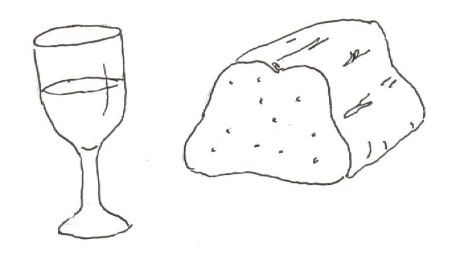

"You show us hard things. You make us drink the wine of astonishment."
--Psalm 60
Dear Beatrice,
When my brother found me, I was shaking. My thin hands balled into pale fists. My eyes pressed firmly shut. A look of anguish. Lines formed here and there on a face once smooth. The sound of grinding teeth.
I was not the brother he knew. I was frail and weak and doubled over and unable to stop from shaking.
I felt his hand on my hand.
“Brother, are you okay?” he asked.
“No, Seth,” I said, “I am not okay.”
When I opened my eyes, I could see that he was crying.
Sincerely,
Jesse
I’m laying awake in bed and it’s late morning on a Sunday. I’m not sure what time. My mom just called and left a message that went something like this:
“Hey bud. Just calling to see how you’re doing. You’re probably at church. But give a call back whenever you can. (And then to my dad: “Say hi to Jesse.”) My dad: “Hi bud.” My mom: “We love you.”
And then I sort of come apart. As a kid, I was a real crier, a real sensitive type. But some time around junior high or high school, for whatever reason, I just stopped crying. I can’t really remember the last time I cried. But now I start crying, and I’m afraid Mark will hear me on the bottom bunk. I smother my face in my pillow and just let loose. Through my tears, I start whispering into the pillow, “Oh God, Oh God, Oh God.” It is more than I can bear.
I lay awake in great pain and my abdomen is cramping very badly. I take two of the anti-inflammatory pills the doctor prescribed, but they do not help. I slide down from my bed and stand a moment staring at my dresser, and the wall above it, where I taped pictures of my family.
I go into the bathroom, fill the toilet with more blood, look at it with benumbed horror, and wash my hands. I take a shower, get dressed, grab my backpack, and walk outside into the cold rain.
I enter the chapel and sit near the back in my usual place. After scanning the familiar sights--the stained-glass window, the cross, the backs of peoples’ heads’--my eyes fix on the wooden engraving of the Last Supper behind the pulpit.
I am started from my thoughts by the sound of a voice coming from the front of the room. A familiar man in a polo shirt holds a Bible and reads. The words are so familiar that I do not even listen, I only catch fragments:
... He reclined at a table ... eat this Passover ... I suffer ... I shall never again eat ... the kingdom of God ... a cup ... fruit of the ... some bread ... He broke it ... This is my body ... in remembrance of Me ... My blood.
I stare at the stained glass window depicting the crucifixion.
When the man in the polo shirt finishes reading, he invites the congregation to take communion. Two young men stand at on either side of the stage, holding loaves of French bread and bowls of grape juice for dipping. A praise band takes the stage and begins playing various contemporary praise songs.
I slowly walk toward the front of the chapel, with my head lowered. I want to double over and lay on the ground. I clench my fists and bear the pain and whisper to myself, “Let this cup pass from me.”
Finally, I reach the young man and tear off a piece of bread and dip it in the juice and put it into my mouth, almost mechanically. And yet, as I chew it, the pain in my side is so great that it takes great effort to keep from crying out.
I lay awake in bed. I am curled up in a ball, clutching my pillow to my abdomen in a vain attempt to suppress the pain. I’ve just taken three times my normal dose of anti-cramping medicine, and it does nothing.
In times of trouble, my mom often quotes the verse, “Let your requests be made known to God.” I pray, “My request is that You would take this pain from me. And don‘t let me die.” But God either does not hear, does not care, does not exist, or simply chooses not to answer my request. I am deeply disturbed by all of these possibilities.
I am lying on an operating table on my side. Dr. Samuels is ramming a three foot lubricated flexible scope deep into my colon. I am awake.
The nurse gave me Demerol and said I wouldn’t feel anything and would probably be asleep. But I am awake and I feel everything. Every twist of the scope. Every poke against the walls of my insides. And sometimes it is excruciating.
A monitor behind Dr. Samuels shows the inside of my colon as the scope probes deeper. I see little traces of shit. I see blood. This is my body.
“And we’re comin’ round another corner,” Dr. Samuels says in a sing-song way , almost to the tune of “She’ll be comin’ round the mountain.” It hurts real bad, like someone is stabbing me.
Do I have cancer? I crane my neck to see the screen. Is there black? What is that? Blood? It looks like hamburger.
“Just relax there, Jesse,” Dr. Samuels says in his nonchalant way, and a nurse places a hand on my head, gently forcing it away from the monitor.
But I have to look. I struggle against the hands that won’t let me look.
I cannot form the thoughts in my head into sounds from my mouth. It feels like that dream where you are being chased by monsters and you try to run but you are in slow motion. Do you know that awful dream?
I have to force my thoughts into my mouth, but it is so very difficult, like speaking underwater. Finally, in fragments, I hear myself say:
“Do I…have…cancer?”
And Dr. Samuels does not appear to hear. Why can’t they hear me? All around are lights and machines and masked faces and instruments and the monitor. The monitor contains my fate and I cannot see it. My eyes roll around inside my head.
I am falling.
And then the dream with Kermit the Frog.
Kermit the Frog is standing outside an industrial building and he is in his reporter’s uniform and he says, “Kermit the Frog, here!” and he gives his report but the words don’t make sense and I only know that something bad is inside the building.
And sometimes I think that Kermit the frog is my father and sometimes I think he is me.
And now I am inside the industrial building and Kermit is still reporting, cheery and charming as ever, but his words don’t make sense.
Inside the industrial building is a big vat of fiery chemicals with a monster inside who looks like a Sesame Street character, all dopey and shaggy and puppet-like, but he is covered in fiery chemicals too, so he is terrifying.
I am being lowered into the vat of fiery chemicals. And I can still hear Kermit the Frog reporting--just sounds that are not words, or maybe I cannot remember the words.
I am being lowered lower and lower and I think I might die of fear. I do not want to die from chemical burns.
This is where the boy wakes up. Just above the vat. Just out of reach of the fiery monster. The boy forces his eyes open and lies awake in his room shaped like the letter “L” and takes comfort in the sports figures who populate his wall: Magic Johnson, Bo Jackson, Nolan Ryan. The boy may not fall asleep again, but he is safe from the monster. He thinks the monster lives in a real place--in another world he enters when he falls asleep. He does not think the monster is inside his head. The boy wakes up and forces his eyes open.
But the young man does not force his eyes open. He descends into the vat of fire and chemical and monster. And it hurts like hell. It is bitter as death. But he does not die, though his body is enfolded in flames. The young man knows that the monster is inside his head and so he faces the monster. And he does not die.
CHAPTER 7
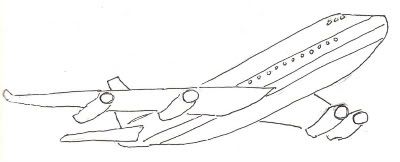

“He looked up to the sky, doubting whether there really was a heaven above him. Yet there was the blue arch, and the stars brightening in it.”
--Nathaniel Hawthorne
Dear Beatrice,
It’s really quite amazing what the body will endure. I’ve learned that about myself. I can bear a lot of pain for a long time. My mind sort of detaches itself from my body and, though I can still feel the pain, I can like mentally distance myself from it, so it’s like another person’s body. In psychological terms this is called dissociation or depersonalization. It’s what rape victims and victims of abuse and war and torture often do. It’s ironic that, once the physical pain stops, this dissociation becomes a new kind of torture.
Sincerely,
Jesse
When I wake up, I notice two things. First, my mom is sitting beside my bed. Second, I am not dead.
And then I notice everything, like all at once: the fluorescent lights that bother my eyes, the lime green paint on the walls, the beeping, tubey, metallic medical equipment, the woman laying across from me in another bed, her head lolling to one side and her mouth opening and closing wide, but no words emerging. God, do I look like that?
My mom is saying something, but the words are far away. I strain to hear, but catch only fragments: “Bless ... healing hand ... mercy.” Oh, okay, she is praying. I close my eyes, out of respect, until I hear “Amen.”
When I open them again, Doctor Samuels is standing at the foot of the bed. I am embarrassed because he might have seen my mom praying. I want to apologize, but my mouth will not form sentences, only sounds that no one understands.
Dr. Samuels is talking to my mom, but his words don’t make sense. Again, I catch only fragments: “Ulcerative colitis ... scar tissue ... inflammation ... comfortable .. wakes up.”
A needle is stuck in my wrist. I hate needles.
I am surrounded by people I know-family, friends, acquaintances. I am here. Alive. It's my brother's engagement party. Seth is standing a ways away, beside a small park bench overlooking Puget Sound. He is on one knee in front of Christine. She is holding her hands in front of her mouth. All these people are watching this private moment, and my dad is taking pictures.
And now all these family and friends and acquaintances are making a tunnel by connecting hands. My hands are touching my Aunt Mary’s hands, and through the tunnel I can see Seth and Christine running across the street, holding hands, and I think Christine is crying. And now they are running through the tunnel of people and Seth is smiling and Christine is smiling and crying and sometimes making little wails.
My brother is engaged to be married. I will never be married.
I wonder if anyone notices the distance in my eyes, if I look thinner than before.
“Jesse, hey big guy!” my grandpa Glenn says enthusiastically in the way he said to me when I was a child. Grandpa’s t-shirt reads: America: Love it or Leave it.
“Hey grandpa,” I say, trying and failing to match his enthusiasm. My attempt comes off forced and fake-sounding to me. It’s still so hard to appear to be feeling okay. I still want to close my eyes and go to sleep and disappear. I am exhausted.
The pain has moved from my abdomen to my head.
And now Seth and Christine are standing in front of me. And this feeling of detachment is so intense that I feel I am clawing my way through metal wires just to converse, just to stay in reality.
“Hey guys, “ I hear myself say.
“Hey Jesse,” Christine says.
“Hey bro,” Seth says.
“Congratulations,” I say.
And now we make a three-person group hug and, for a moment I close my eyes, only feeling their hands on my back and I am reminded that this is me, I am here, and for a moment the pain subsides.
But then my parents walk up and I find it hard to look them in the eyes. I force myself to look at my dad and the detachment intensifies so much that I don’t think I can bear it any more.
The detachment is stronger around family than around anyone else. Why? And then a crazy though tells me that it is love. I cannot bear love, so I detach. I don’t know how to feel it in my heart, so I feel it in my head, but my head doesn’t want it either. I look at my brother and soon-to-be sister-in-law. They are in love. How can they bear it?
I am with my father on an airplane--Alaska Airlines flight 132 to Orange County (John Wayne) airport. It’s a Boeing 737. As a boy, I wanted to be a pilot or a doctor or an Olympic track and field star.
My dad is writing in his brown, leather-bound journal. I watch his hands as he writes. I can see two large veins puffing out. I remember, as a boy, pushing on these adult veins with my little boy’s finger. They were soft. My dad’s hands are wrinkled--too wrinkled for his age. But, then again, so are mine. We have old man’s hands. His wedding ring is a silver band with a cross engraved on it. My fingers are ringless.
I wonder what he’s writing. My father is a writer, like me. I remember, when he edited the town newspaper in Mt. Horeb, Wisconsin, he used to write stories. Stories based on his childhood in Moose Lake, Wisconsin. In his stories, there was this kid named Fran, whom he used to bully endlessly. Like once he gave Fran these really hot peppers form his mom’s pepper plant and Fran practically puked. Another time he almost electrocuted Fran with a mini generator. Poor Fran. I always got a kick out of those stories. He wrote this one called “Warts and All” about how his hands were covered with warts when he was in the fourth grade and this girl still held his hand for square dancing. I liked that story.
I’m reading a story by Flannery O’Connor called “Everything That Rises Must Converge.” I like Flannery O’Connor.
And now the plane is taxiing onto the runway for takeoff. For some reason, I look at the side of my dad’s head, at his neatly-cropped, conservative hairdo, at his mildly receding hairline (which makes his forehead look bigger than it used to), at his glasses (the right lens is much thicker than the left--he has a “lazy eye”), at his freckle-less skin. I guess he senses me staring at him because he turns and looks back at me. There is this strange moment when we’re looking each other directly in the eyes and nothing is said. I see, or sense, the sadness in his eyes. And I feel that he sees the suffering and distance in mine. Nothing is said between us.
And now we are taking off. This is my favorite part. Many things scare me, but a plane takeoff is not one. It feels like a ride--the muffled scream of the engines, and the force pushing you back in your seat, and then the feeling of being airborne, and watching the slowly widening distance between yourself and the ground, and the ever-expanding perspective of the landscape. You are flying.
We are soaring towards the gray cloud canopy that covers the city like a shroud, and suddenly we are in the midst of the clouds. Looking out the window, all I can see is a gray fog. But we ascend higher and suddenly we are above the clouds and the sky is everywhere blue and the sun is shining so brightly that I have to shield my eyes from its glory.
END OF BOOK I
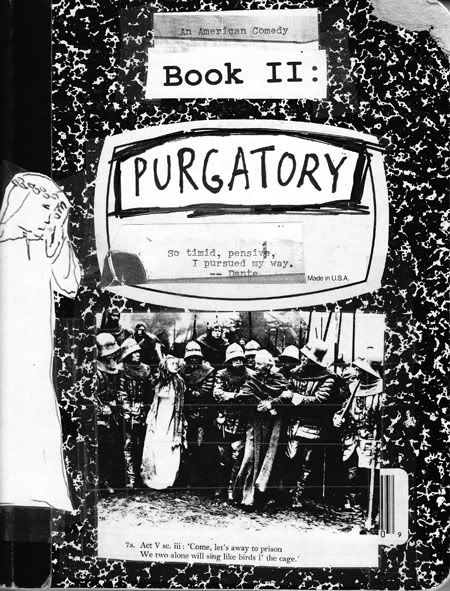
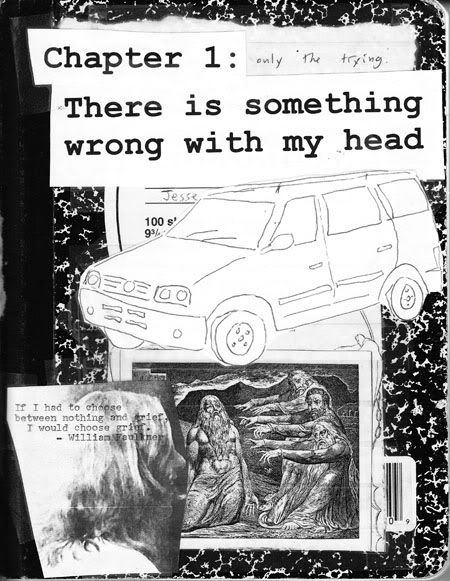
Dear Beatrice,
If I stacked these journals, notebooks, and sketches into a pile, they would form a mountain of fragmented words, ideas, images, and memories, the weight of which could make me fold my hands in despair and give up this whole fragile enterprise. But today, December 15, I sit alone in Starbucks across from a pretty girl who reminds me of you, and I begin to re-read one journal. Just one. The first of my California journals. I can handle one. And this is how I will proceed. One by one. Word by word, sentence by sentence, I will ascend the mountain that stands before me.
Sincerely,
Jesse
There’s a buzzing in my head. I can’t hear it, but it’s buzzing, like the buzzing of bad electricity. Everything is intense. I look down at my body, my torso, my moving legs, my hands and then at the sad face of my mother. Oh mother. Where is my head? What has happened to my head?
And now we are walking through the kitchen and my eyes catch the wooden knife holder. Oh God. Not that thought. But I can’t push it from my mind. It’s like a little demon voice in my head, telling me to stick that knife in my head. I could end all this pain.
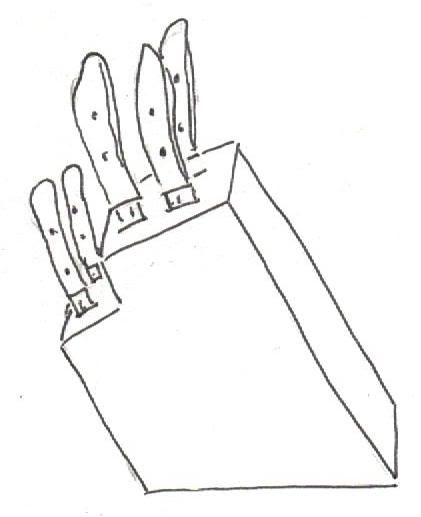
In this ordinary kitchen in suburban America, my head and my heart scream like a dying bird in a cage.
I scare myself. Because my head is so fucked up from the Demerol and I don’t trust that thing in my head that keeps me from doing bad things, from going crazy, from sticking that knife in my head. Like there is a battle between that demon voice and another voice, and for the first time in my life I honestly don’t know which voice will win.
And now I am sitting on the couch by my mom and my head is screaming with craziness and it terrifies me and I want to cry but I cannot cry.
Like a child, I lay my head on my mom’s lap and she holds it like a mother. Oh mother. Can you stop this screaming in my head? How do I tell you all these awful things I feel and think? I want to jump up and get that kitchen knife and end this. This life. What keeps me from jumping up and getting that knife? The hands of my mother.
And something else. When the pain subsides a little, I go into my room and write a poem. It’s just a list of reasons not to die. A list of beautiful things. And it saves my life.
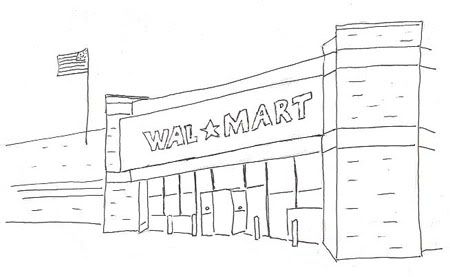
I’m in the backseat of my mom’s Dodge Stratus. We are driving down Brea Boulevard. We pass a succession of corporate retail stores: KFC, Starbucks, Burger King, Old Navy, Tower Records, Wal-Mart, McDonalds. And then the mall, with the big department stores signs: Macy’s, Robinson’s-May, Sears. And then Brea Boulevard turns into Brea Canyon Road, and it is only dry foothills and a two-lane road. Oil wells dot the landscape. Out the window, I notice three cows, grazing in sparse pastures beside the road. The cows are lean.
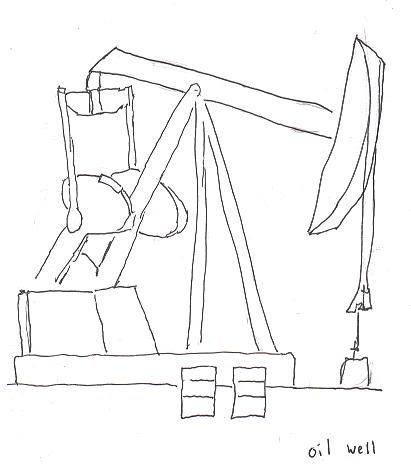
Suddenly we are in another town. The dry shrubs become palm trees and the sparse hills blossom into rows of tract housing and square office buildings. We are in Diamond Bar.
My mom pulls into the parking lot of one of these office buildings. The sides of the building are made of made of dark, reflective glass, and I can see my dark reflection approaching. It looks like another person.
Inside the building the fluorescent lights bother my eyes. We stop in front of a door which reads:
Leslie Carter, MFCC
Adult and Child Psychotherapy
I hate waiting rooms. This purgatory place filled with magazines, plastic plants, and framed prints.
We shake hands and follow her into her into a dimly lit office.
After all the getting to know you bullshit, Leslie asks my parents to describe what they have “observed” about my behavior and moods of late. My mom begins to speak and then starts crying.
“What kinds of emotions are you feeling lately?”
“I feel nothing. I’m totally numb, like emotionally. All I feel is this detachment.”
“Do you have this detached feeling now, at this moment?” Leslie asks.
“Yes.”
“And how intense would you say that it is?”
“It is very intense.”
Leslie writes something on a yellow legal pad.
I had a dream last night that was so vivid and real and emotional that I almost cried. But the more I struggle to remember it, the more it slips from my mind.
“How is your head feeling today?” Leslie asks.
“The same.”
“Why don’t you tell me how this feeling makes you feel. Try to say it with emotion.”
“I don’t feel any emotion.”
“I know, but try to say it as if you did.”
“I don’t like this feeling.”
“I think you can do better.”
“This feeling fucking sucks.”
“Good. How about a little stronger.”
“Fuck this fucking feeling! It fucking sucks shit! Goddamn this feeling in my head! Why can’t I feel normal?! When will feel like a normal fucking human being again?!”
“That was very good.”
I’ve been watching a nest of robin eggs in the maple tree in our backyard for some time. They are small and blue and speckled. I wonder about birds and other animals born in eggs. They are isolated in those shells for a long time without food or water. How do they survive? I suppose they’ve got everything they need right inside the egg.
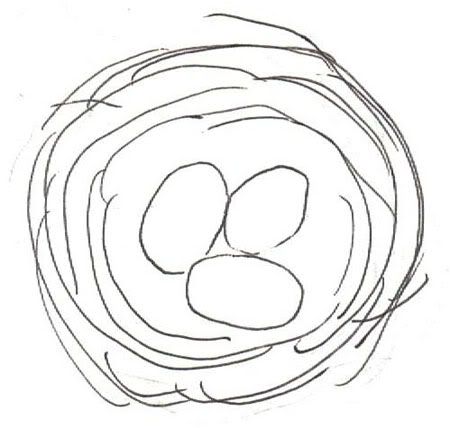
“Leslie, do I hate my father?” I ask, laying on the couch in her office.
“What do you think?”
“I don’t know. How can I hate someone if I don’t feel anything?”
Lately, I find that I feel more comfortable wearing sunglasses. It has to do with my eyes. The glasses provide a framework for the world—two little frames enclosing everything, giving structure to the fragmented chaos that drifts past my eyes endlessly, like television, or a foreign film with no plot, just disconnected streams of images. Like two paintings enclosed by frames. The whole world with its infinite variety and color surrounded by something unchanging, unmoving. These little frames remind me that I am here, that it is me looking through them. That these are my eyes looking at this world. That I am not a headless ghost. That I exist.
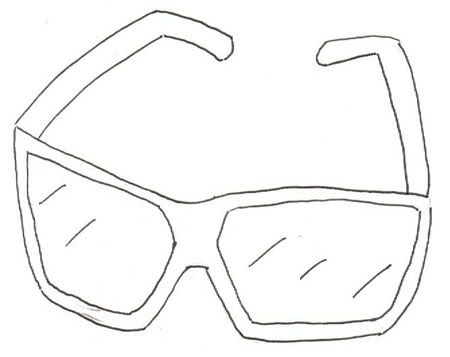
“Leslie, I think I’ve figured out what I’m angry at,” I say, matter-of-factly.
Her eyes light up a little.
“Really? What’s that?”
“I am angry at my own pain.”
“Than’s interesting.”
“ I had this idea for like a business--an anger release club, where people can come and release their anger in various, healthy ways. For example, they could smash things. They could buy a dozen eggs and throw them against a wall. There would be mannequins they could punch. They could smash watermelons and pumpkins and other things. There would be sound-proof rooms where they could yell as loud as they wanted.”
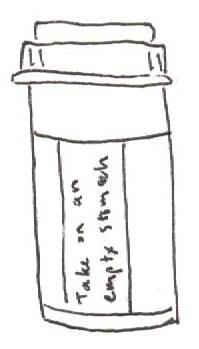
I’m in Longs Drugs, picking up my prescriptions for Asacol, Wellbutrin, Effexor, Buspar, and some toilet paper and tomato sauce for my mom. When I walk outside, a homeless man is walking toward me, mumbling something crazily. His jeans are dirty and he’s wearing several shirts of different colors and a dirty denim jacket. His eyes are deep set and dark around the edges and creased with lines. As he approaches, I move aside to give him more room, but he just stops right in front of me and looks at me and I look at him. His eyes are dark and bewildered, holding the expression of a man who is in a dream from which he cannot awake. We stare at one another for a moment, but I soon look down at the sidewalk. When I look up, the man looks deeply into my eyes and points at me and says, “Thank you very much.”
“I believe that these feelings in your head will diminish in time.”
“But it’s been so long.”
“I believe that as you connect with people, the detachment will decrease.”
“But the detachment hinders my connecting with people. It’s a catch-22.”
“Just keep trying.”
“I am trying. But it’s so hard.”
“I know it is.”
“Isn’t there a drug I can take that will just make it go away?”
“There are certain types of drugs, but they are highly addictive and dangerous.”
“I’m almost at a place where I’m willing to risk that. I just need to remember how it feels. Just a glimpse of normal. If I can remember, I can find my way back.”
“Some things are worth struggling for. Just be patient.”
There was a strong wind storm last night and some of the trees on my street, those with shallow roots, were uprooted and blown over, and lay across the street this morning. There were men in orange vests cutting up the trees this afternoon. It’s not the age or the size of the tree that matters in a windstorm, but the strength and depth of its roots that allows it to stand. I once heard that roots grow deep in places of dryness, like this Southern California desert, as they plunge deeper in search of water.
“The cure for loneliness is relationships,” Leslie says, “It’s simple.”
“Yeah, but it’s not that simple.”
It's in my way when I get into the shower. Some daddy longlegs is crawling across the tile. I'm disgusted by it, even though I know it's harmless. So I turn on the water and drown it. I watch it struggle in futility against the water. Some instinct, some nerve tells it to flee with all its strength. But it is not enough. The water engulfs it and it is drowned. As the water recedes, I look at its lifeless body on the tile, its curled legs flattened by the water. And I wonder, What is it that separates a living spider from a drowned one? For a moment, this thin line astonishes me.
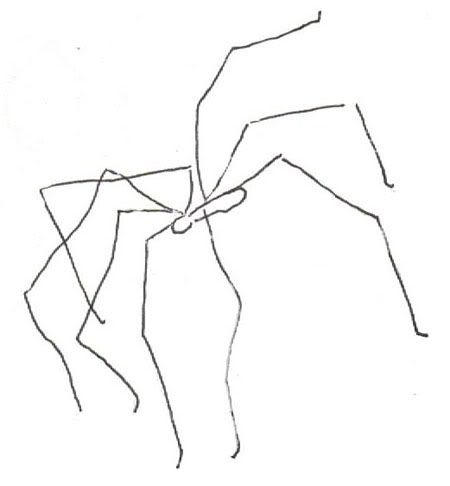
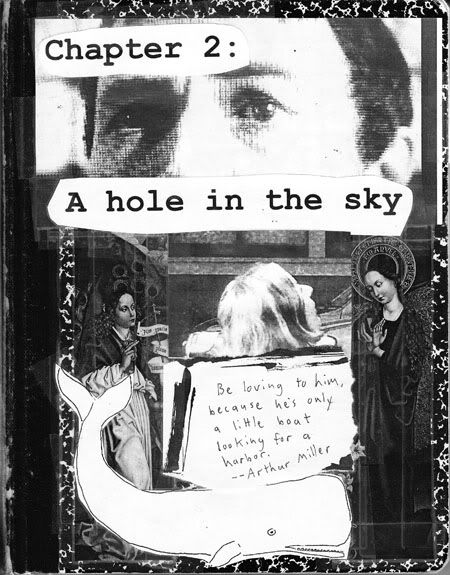
Dear Beatrice,
I like to bring my notebook to church, because for some reason, I tend to get inspired with ideas at church, and not just “religious” ideas. Sometimes I feel bad when I’m writing in church, like I should be singing and praying and listening, like everyone else. But, for me, writing has always been like singing and praying and listening.
Sincerely,
Jesse
My dad thought me and Josh, the new worship pastor at our church, would have a lot incommon. We are eating burritos at Baja Fresh Mexican Grill in Brea.
“What are you reading right now?” Josh asks.
“Moby Dick.”
“Oh…Have you ever read Experiencing God?” he asks.
“I think they tried to make us read that in junior high youth group. It’s like a devotional workbook, right?”
“Yeah. It really changed my life.”
My dad was wrong. Me and Josh have nothing in common.
And then I sort of tune Josh out as I eat my Burrito Ultimo, and I get thinking about Moby Dick. Is the whale God? Is the ocean God? What is the whale? Knowledge?
This guy I went to high school with, Dylan Brinker, just died in a boating accident. I played National Junior Basketball with Dylan. We were on the Suns. I’m at the funeral and it’s like a premature high school reunion. In the sanctuary, I run into my friends Ernie and Chuck.
“What’s up?”
“Nothin.” They look about the same. Maybe a little older.
I sit next to my friend Peter Fellauer during the service, and I remember how we used to draw funny/perverted/violent cartoons on the welcome cards during church, and then try unsuccessfully to stifle our laughter, while the old men in suits would glare back at us. I think of drawing something on the welcome card, but instead I just stare at the back of this old man’s neck, which is pretty wrinkly.
On my way to the graveside service, I stop at home to use the bathroom. After peeing, as I’m walking back down the long hallway that leads to the front door, I stop. On the wall, there are all these family portraits. Some of them are pretty old. I look at all the old men who were my ancestors: Clifford La Tour with a camera around his neck, Ted Morey as a little boy in the 1800s with his hand tucked into his coat like Napoleon, Glenn Steffen in a Navy uniform. A portrait of my family circa 1990. I’m about 13. My brother with his high school basketball team, The Indians. Seth’s basketball coach, coach Reeve, is now dead. I can see my face in the reflection of the glass of these photographs.
And then, for some reason, I sit down in hallway beneath all these photographs and cry.
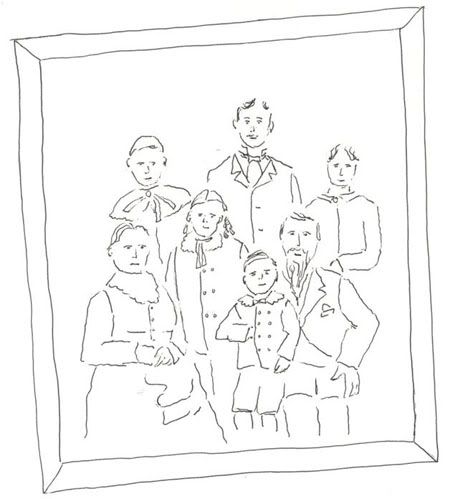
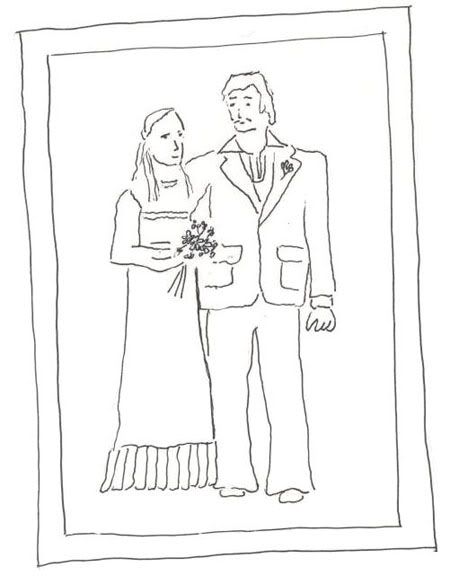
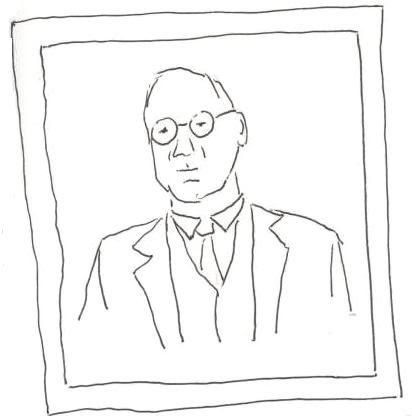
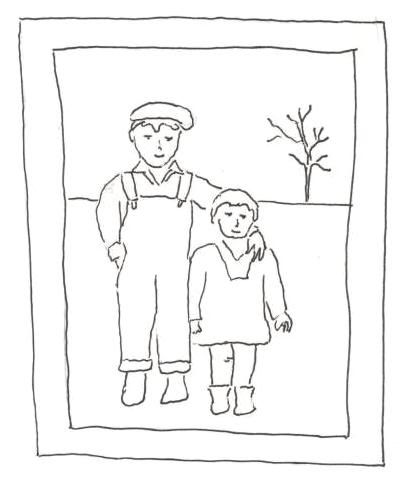
Sometimes I take walks. Through these suburban neighborhoods, past the well-groomed lawns and neatly-spaced houses. Past the driveways with two or three new cars, maybe a Lexus or an SUV.
I trespass into gated communities, where every other house is literally identical, and I imagine starting fires. Mom used to say that gated communities were unsafe because fire trucks could not get into them fast enough.
Today I am walking to a park. A little bit of artificially constructed “nature” in the midst of this suburban sprawl.
I walk past a house where there’s a middle-aged woman sitting by the window with a pug on her lap. She’s talking in his ear and rubbing his legs. Then she notices me and looks embarrassed. And that makes me embarrassed.
A man is shoveling an enormous pile of dirt, bit by bit, into a dump truck. It seems an everlasting task, like the myth of Sisyphus.
I walk past a man who always seems to be outside doing something to his lawn. It’s like his lawn is his life’s work. Eight times out of ten, when I’m passing this house, that old guy is outside like pruning his bushes or hand-pulling weeds, or trimming hedges. Today he’s sprinkling some kind of fertilizer on his grass.
There is a middle-aged man riding a little girl’s pink bicycle along Brea Boulevard.
And now I’m walking through the park, past racquetball courts and basketball courts and volleyball courts that mom never let us play in because she said there was broken glass in the sand. I follow a cement path, a walking trail that circumnavigates the park. I’m looking for a nice spot to sit. I wander.
And then I find my spot--a bit of grass beneath a transplanted weeping willow tree beside an artificially constructed stream. I sit and pull out the little blue pocket Bible I always carry with me now and begin to read the book of Lamentations. I fall asleep under that tree and dream that everything in the world is synthetic, even the trees.
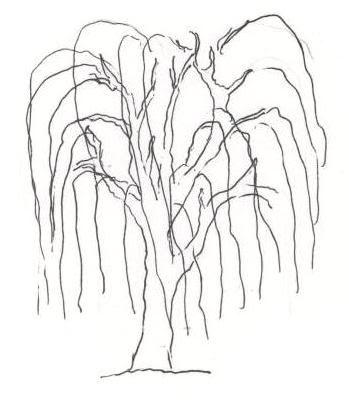
I feel an intense heaviness in my chest and my abdomen gurgles and my head starts detaching from my body.
“So what’s going to happen?”
“Well, they caught it early, so the prognosis is very good.”
“Do you have to get radiation, chemotherapy, surgery, what?”
I can’t believe I’m asking my mom these questions.
“I have options. I can get radiation, or chemo. But the only fool-proof way to get rid of it is surgery, what they call a mastectomy.”
“That’s where they cut your boob off, right?”
“Yeah, actually both boobs. I’m getting a double mastectomy.”
I look down at my peanut butter toast. I’m not hungry.
I watch the doctors roll my mom into the operating room, and she looks at me and smiles and anesthetically-induced smile.
I sit in the waiting room, sketching the other people who are waiting: my father, my aunt Mary, mom’s friend Rhonda, my grandma Sally, and various strangers: an old man in a green baseball cap, a Mexican man wearing white jeans, an Asian woman who looks nervous, and the little boy with her who will not sit still. I can’t draw that little boy because he keeps moving. All I get are rough, somewhat indistinct lines that kind of look like a person.
Four hours later, I walk into my mom’s hospital room and she looks like hell. Apparently they are having a problem with the pain medication. She says it feels like a semi ran over her chest. I don’t stay long because the nurses say she needs rest. My grandma stays the night with her.
The next morning, my mom looks weary and in pain. Apparently, the pain medication kept making her vomit, and so she just stopped taking it in the middle of the night and so she was in severe pain most of the night. I get angry at the nurses for letting this happen to my mom. I take out my drawing pad and begin to sketch my mom, but I cannot. Not like this.
I sit for a long time beside my mom’s bed, holding her hand as she drifts in and out of consciousness. She’s pretty out of it now from the medicine and lack of food and sleep. As I look at her, I start wondering how God can allow all the suffering in the world: my pain, my mother’s pain, and all the people in this hospital and all the hospitals of the world who send up every day a cry of pain fierce enough to rip a hole in the sky.
We are on an airplane, taking off from John Wayne airport and I am sitting next to my dad. I start thinking about going backwards in time, back up to Seattle, and I’m getting younger instead of older and I’m getting healthier instead of sicker, and by going back I am able to slow things down and notice things I didn’t notice the first time around, and, by carefully piecing things together, clues, conversations, symptoms, signs, I am able to pinpoint exactly the moment I got sick, and I am able to stop it.
I stare out the window at the Orange County landscape, at the rows and rows of perfectly planned tract housing and shopping centers. I am surprised by all the green—the trees that seem to grow out of the gray and beige concrete—the transplanted trees from all over the world that people plant in their yards and shopping centers. But it feels unnatural. I imagine going backward further and further in time, to see what the landscape looked like when the first white settlers peeked over the Rocky mountains, when it was just shrubs and hills and Native Americans and some animals, and before then when there were saber-toothed tigers and prehistoric creatures, and then dinosaurs, and then everything was ice, and then everything was formless and void.
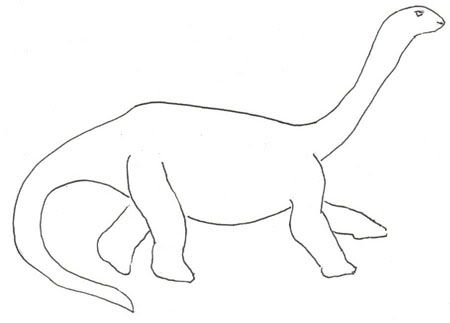
We are descending into the grayish white cloud canopy that covers Seattle like a shroud. We are in the midst of it, and then we are beneath it, and I notice things I’ve never noticed before. Like how, as you approach Seattle, there are all these little green islands, separated by these waterways. Some of the islands have only one or two structures on them. I imagine living alone on one of those islands and, sometimes taking my boat along the waterways, just to explore.
And then we are in SeaTac airport, and Seth is hugging me.
“Hey bro.”
“Hey.”
“You have a nice flight?”
“It was okay. My ears are plugged.” He sounds like he is far away, or I am far away. I follow my family outside onto the rain-soaked street.
And now we are walking together in downtown Seattle. My brother is leading the way. My mom is still recovering from her surgery. My dad, thin and strong and slightly balding, takes photographs. Christine is glowing with expectation. Grandmere is holding my arm with her thin, wrinkly, fragile arm.
Today, the day of the wedding, it is not raining. The leaves of the trees outside Bethany Presbyterian Church are bright shades of orange and yellow and red—almost like someone painted them.
I am standing amidst various tuxedoed men—the friends of my brother: James, Jon, Tom, and Christine’s brother Matt. A young woman is taking photographs. I struggle to hold a smile for such long periods of time. Grandmere’s dress is almost see-through. That’s gross. Grandpa his laughing his full-bellied laugh. He seems a bit underdressed, but I don’t think he owns a suit.
And now I am standing very close to my brother inside the church, and he is facing Christine, who looks beautiful. And the pastor is saying the usual wedding stuff and I am nervous. My legs shake and my abdomen gurgles and my head detaches from my body, but I’m used to it. They say, “I do.” And then they kiss. And then the organ music. And my brother is married.
Orange County is overrrun with bad architecture. Especially Irvine, Placentia, Yorba Linda, and Brea. There are a few places in Fullerton, Orange, and Santa Ana that have some sense of history, but not many. I’m walking in Old Town Orange, past an old movie theater that has been converted into a church called “Son Light Fellowship.” I wish it was still a theater, showing old movies. I think that an old movie house could be as important to a community as a church..
I signed up for the handbell choir at church last week, because I felt I needed to get involved in something, and our first practice is today. I stand awhile in the room, watching two women carefully setting shiny brass bells of various sizes on two long tables. I eat my fries and sip my Coke.
I am assigned the E and F# bells in the bass cleft. This first practice consists mostly of learning how to properly ring the bells. We are given the music for the first piece we are to play-- “O Come, O Come, Emmanuel.” We play the first few lines of it, somewhat off, but I can tell that it will sound pretty after some practice. The main thing with handbells is timing. You have to ring your bells at exactly the right time, or it sounds like shit.
We are walking together on the Santa Monica pier. It is nighttime and it is cold.
She brushes her hair from her eyes. Her hair is now a natural color, a brownish blonde, like mine. It is no longer dyed red, and her face seems less pale. She looks more natural, but no less beautiful. We are different people now, I guess.
She tells me she’s seeing a guy named Dave. The lights from boats shine on the surface of the water, and I steal glances at her face.
Where do I begin, and where do I begin?
We walk past a homeless man and she hands him a dollar.
And now we are saying goodbye, and I hug her and I want this moment of contact to be electrical, but my head is detaching from my body and my gut is gurgling, and I look out through my dead eyes into her alive eyes and say goodbye.
I drive home alone along the 405 freeway, watching the taillights of cars, listening to this new band called The Shins, and singing along: And if you took to me like a gull takes to the wind, then I would jump from my trees, and I would dance like the king of the eyesores and the rest of our lives would’ve fared well.
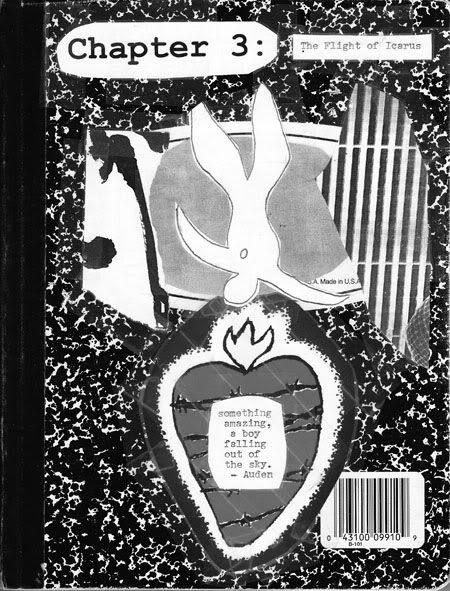
Dear Beatrice,
Because I can think of nothing else to do, I write. I can try to express things as they are, as I feel and see them. I can try to tell the truth of my life. And even if the truth does not make me happy, it might mean something. And that is something. That is a reason not to die. I think of my ancestors. I try to imagine the sorrow of their lives, and what made them go on living. I see a pattern. When Glenn Steffen thought he would lose everything, when his wife was dying from polio, he built a house. He made something with his hands. When Cliff La Tour was aching with loneliness and depression and a job that was killing him, he invented the buoy, and later took photographs of horses. When Jac La Tour, my father, was a sick young man and a college dropout, and didn’t know what to do with his life, he wrote poetry and took photographs with his father. In the midst of the Great Depression, Ted Morey built a neighborhood that still stands today. My ancestor’s hands, compelled by sorrow and pain, have made wonderful things. Things that have lasted. And so my hands will write.
Sincerely,
Jesse
I’m sitting alone in Starbucks, as usual. I’m trying to draw this old couple sitting a few tables away from me. I’m fascinated by their postures, they way their clothing falls and folds against their bodies, the complex wrinkles in their faces and hands, the depth of their eyes, the way they look at one another. I trace the outlines of their figures, trying to capture all the lines and folds. I can’t. It’s been so long since I’ve tried to draw something, Probably grade school.
When I finish, I look at my drawing for a long time. It’s rough and there are all these stray lines, and the proportions are off, but it brings me a kind of relief.
On a wall in my room, I have a framed print of “The Flight of Icarus” by Henri Matisse. It’s covered by reflective glass, which is the closest thing to a mirror in my room. I’m standing in front of it and looking at my reflection behind the cut-out of Icarus among the yellow stars, with the red hole where his heart is, my body reflected in the blackness of his body. I can also see the reflection of the wall behind me, on which hangs an engraving by William Blake of Christian from The Pilgrim’s Progress.
I pick up a large mirror and lean it against my bookshelf. I take off my shirt and sit cross-legged in front of the mirror. My torso is pale and skinny. I lay my large drawing pad on the floor in front of me, and flip it open to a clean page. Then I take a piece of black charcoal from my green tackle box and stare at my reflection in the mirror, and begin to draw.
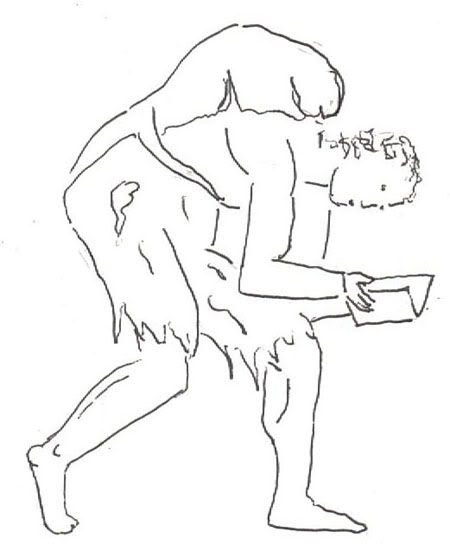
When I walk into their room with my drawing, my parents are laying side by side in bed, watching KCAL 9 news on television. There was a fire in Riverside. No one died.
“Hey bud,” my mom says.
“Hey. I want to show you a drawing I made.”
I hold up the paper for them to see. They react with sort of awkward, blankish stares.
“Is that how you feel?” my mom asks.
“I guess so.”
My dad and I are heading down the 405 freeway toward Los Angeles. I’m driving and we are listening to a Simon and Garfunkel album, “Bookends.” It’s one of those rare albums that we both like. We exit at Getty Center Drive. I ask my dad who J. Paul Getty was.
“At one time he was the richest man in America.”
“How’d he make his money?”
“Oil, I think. He was like one of those guys kids wanted to be when they grew up. They’d either say, I want to be as rich as J. Paul Getty or as smart as Einstein, or maybe as good a ball player as Mickey Mantle.”
“Which did you want to be?”
“I wanted to be an oceanographer.”
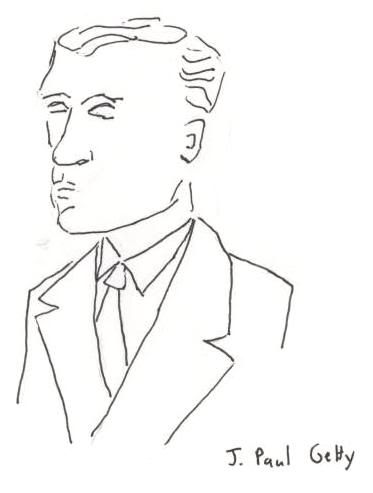
My father and I are in a room, looking at paintings by Rembrandt.
I’m in my garage, working on my triptych painting. It has three large wooden panels, and the borders are made of gold leaf, in Byzantine style. The paintings are various scenes from the life of Christ, interspersed and echoed in scenes from my own life. For example, the picture that is supposed to be Mary and baby Jesus is actually from a photograph of my mom and me. And the Last Supper scene in the middle panel is actually my family at the dinner table, my father at the center, and my brother and I to his right and left. I’m unsure about what to paint for the crucifixion scene. I’ve thought of doing a painting of me with my wrists slashed, arms spread out on a bathroom floor. But I think my mom would probably have a mental breakdown if she saw that, so I might just paint Jesus on the cross. Something more traditional, less offensive.
I’m working on painting my mom’s face. I always have trouble with faces. I can make them look like human faces, but not like the people they are supposed to be. I tell myself that this is Byzantine style, so realism isn’t really the point, but the perfectionist in me endures. I’m working on her eyes, when I turn around and see my neighbor behind me, watching me. My neighbor, Tim Fosmark, is an accountant.
“Wow,” he says, “I could never do anything like that.”
This is a common response to anyone who sees someone painting.
“You might be surprised,” I say, “I didn’t think I could, but I took at couple of classes at the junior college. It’s really just a matter of learning the principles and applying them.”
“Well, I can’t even draw a stick figure.”
He laughs awkwardly, and I laugh courteously. Then there is silence. I watch him walk back to his driveway , where his three year-old son is standing, holding a basketball, and saying something I cannot understand.
I’m sitting at the computer, writing like a madman. And then there is a knock at the door.
My mom pokes her head in.
“Could you mow the lawn before dad gets home?”
I continue typing and nod my head.
When my mom and dad and aunt Susie (who is visiting from Wisconsin) talk about money and finances mortgages and mutual funds, there is something inside me that compels me to leave and do something else, something creative, like writing or painting.
I have recently been making a film that is comprised of mostly still images of “ordinary” things—buildings, stop lights, cars, etc. And I get this feeling like everything around me is worthy of filming—all the complex minutia. But I can’t film everything. It’s impossible. This causes a lot of tension in me. I sometimes just want to keep on filming. Even in my school cafeteria, I’m looking around, seeing what things would be good to film—that Coke machine, that man, that hamburger, that worker, etc.
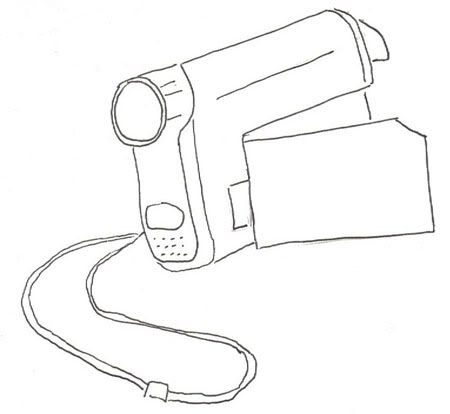
I’m working on the largest painting I have ever done. It’s eight feet by eight feet, a mural practically. I’m nailing sheets of plywood onto a wooden frame that I made. It takes up almost a whole wall of my parent’s garage.
“How are you going to move that thing?” my father asks.
“I don’t know,” I say, and continue nailing.
I’m working on a self-portrait today, and I’m frustrated because I can’t get the face right. It looks like someone’s face, but not mine. Just then, a blaring sound in my ear causes me to jump out of me seat, and I involuntarily crush the photograph in my hand, and cry out, “Aaahhhhh!”
Donovan is being me rolling on the ground, laughing hysterically, holding an air horn in one hand.
“You almost gave me a fucking heart attack!”
“That was the funniest shit I’ve ever seen,” he says.
Then he says, “Let’s get drunk.”
“Okay.”
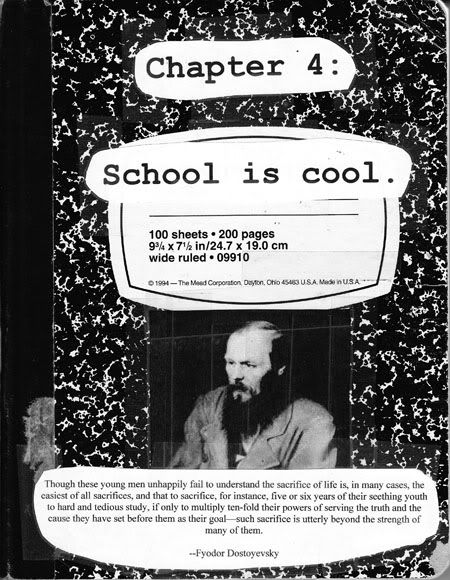
Dear Beatrice,
The journals themselves become works of art—a sprawling mass of quotes from books I’m reading or films I’ve seen, stories, drawings, pictures taped here and there, daily activities, lists, thoughts and ideas for the novel and other creative endeavors. I wish I could just reproduce the journals as they are, because they are something. But who would want to read something like that? The task of the artist is to distill beauty from the chaos. That is what I’m trying to do.
Sincerely,
Jesse
The first day of a new semester. In my world music class, I listen to a conversation between two young women.
“I’m taking physics, calculus, chemistry, and statstics.” I think, what a fucking nightmare.
The professor plays “Blowin in the Wind,” to introduce American folk music. I get goose bumps. I look at the girl next to me to see if she has goose bumps. She does not.
In my Milton class, there is an adult learner who sits in the front row and loves to hear himself talk. He is a fountain of useless and irrelevant information. I fucking hate adult learners. Just because you missed out on college as a young person doesn’t give you the right to torture us with your boring stories and half-baked ideas.
I’m sitting in my Structure of Modern English class, pretending to take notes. But I am actually compiling a list of schools I want to apply to:
Schools to apply to:
Cambridge
Oxford
UCLA
Berkeley
Duke
Harvard
Stanford
Univ of Iowa?
Other schools in England/Europe?
I am one of two males in my women’s studies class.
In my English 301: Advanced College Writing class, we do a “free write,” and I start working on my novel. My teacher tells us to stop writing and she says, “We’re not writing novels here.”
In my Shakespeare class, during a conversation about Henry IV, part I, Dr. Scott asks the class, “What is redemption?”
The class is silent.
One student says, “It’s like revenge.”
She says, “No, it’s not like revenge.” And repeats the question, more earnestly, “What is redemption?”
Finally, though I am afraid to speak in class, I raise my hand and say, “It’s a religious term. It means renewal or salvation.”
I am amazed that most students don’t know what “redemption” means. I guess most students don’t read the Bible every day, like me.
I’m filling out applications for graduate schools, and it asks for my permanent address. I leave it blank.
I finally graduated from college last weekend. My culture has no real rites of passage, and so I wonder if I am yet a man.
I’m watching Mr. Rogers’ Neighborhood. It begins, as all episodes do, with Mr. Rogers walking in the door and singing “It’s a Beautiful Day in the Neighborhood” and removing his blazer and loafers and putting on a cardigan sweater and tennis shoes. He then begins to build a fort out of large wooden blocks. It looks somehow strange to me. He’s like 60 years old and he’s building a fort out of blocks. As he builds it, he sings a song that goes something like, “You can imagine all you want, but until you do it, it won’t get done. You’ve got to do it, do it, do it, and when you’re done, you’ll know who did it…it was you.” After building his fort, Mr. Rogers sits cross-legged inside it and smiles with genuine pride in his work.
I’m re-shelving self-help books with Jennifer.
“I love Disney,” she says, pretty much out of the blue, as she re-shelves My Feelings Are Like Wild Animals: How do I Tame Them?
“Okay,” I say, re-shelving How Parents Can Help Their Children Get Organized and Learn to be Productive.
“My dream is to be a Disney artist,” she says, and then asks, “What’s your dream?”
I don’t really feel like talking about dreams. But finally, I say,
“I want to be a writer,” as I re-shelve Seven Habits of Highly Effective People.
“Ooh...Do you have like an author who inspires you? My boyfriend wants to be a horror writer like Stephen King or Dean Koontz.”
I think for another moment.
“Dostoyevsky.”
“I’ve never heard of him,” Jennifer says, re-shelving Cutting: Understanding and Overcoming Self-Mutilation.
“He was a Russian novelist.”
“Oh,” Jennifer says, “I don’t have one person who inspires me. For me, it’s just...Disney.”
I nod, and re-shelve How to Win Friends and Influence People.
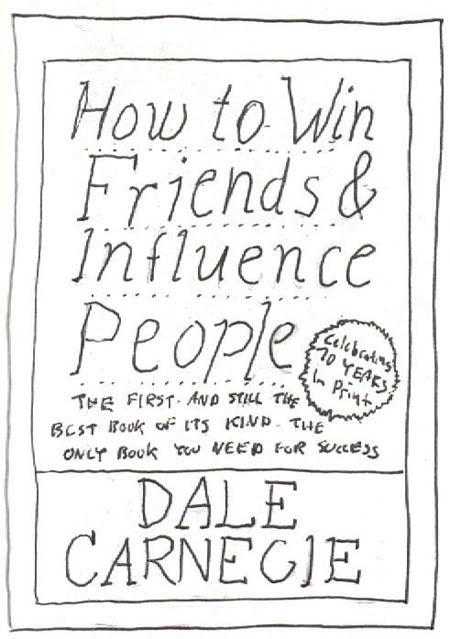
“So, do you write things now?” Jennifer asks.
“Yeah, I write stories and stuff.”
“Do you write mysteries, adventure stories, horror, or science fiction?” she asks, as if these are the four categories of literature.
“Um, I mostly just write about my life.”
“Tell me about one of your stories; give me an example,” Jennifer says, as she re-shelves Choose to be Happy.
“I wrote this one about two brothers who go fishing.”
“That’s it? Just two guys going fishing?”
“Yeah. That’s it,” I say, re-shelving Your Power Within! Self-Help Through Hypnosis.
I am glad and a little relieved when a customer walks up and asks Jennifer to help her find a book about jellyfish.
“I know the perfect book,” Jennifer says.
As I sit at Starbucks reading, in my peripheral view, I can see the world all around me, and it frustrates me, casting the novel I’m reading (The English Patient) into artificial relief. I want to cup my hands around my eyes, like horse blinders, because all I want to see are the words on the page. But I can’t deceive myself. I can’t escape the reality of my life. I cannot enter, fully, into a narrative other than my own.
Sitting in my Modern Drama class, during a discussion of Brecht, I begin making a lost of abbreviations:
-sum—some
-ppl.—people
-b/c—because
-for ex.—for example
-w/--with
-9/11—September 11, 2001
Two professors sit across from me in the alumni lounge. I record fragments of their conversation:
“Anthropological/climatological implications.”
“It’s a good idea to start out with ethnography, and then we move into some Taureg.”
“I’m going to a conference in Florida on text analysis.”
“So now they have a standardized coding system.”
“So this is trying to regain territory that we lost to cultural studies, by scientizing it.”
“In the British academic tradition…”
Walking across campus, I can hear an Army recruitment guy say to a freshman-looking girl, “We have the best language school in the world.”
In my French class, I make a list of possible titles of the French release of the movie “Batman Forever”:
-Batman Toujours (Batman Always)
-Batman Tous Les Jours (Batman Every Day)
-Batman Souvent (Batman Often)
-Beaucoup de Batman (A Lot of Batman)
Sitting in French class, tired, anxious, my head bothering me, low on medication. Heaviness, anger, creative stress. I will carry this. I will bear it.
In my parents’ garage are boxes and boxes of used books I have picked up at garage sales and library sales and estate sales. Mainly classic literarture. I want to read everything. I want to understand. I imagine, one day, I will have quite the library. For now, I have a garage full of books and slightly confused parents.
Because the thought of working a normal, corporate job is profoundly repellent to me, I will stay in school. I will get my master’s degree in literature. I will be poor for three more years. I’ve been in college six years so far, what’s another three more? Most days, reading and writing are the only things that make any sense to me. So that is what I will do.
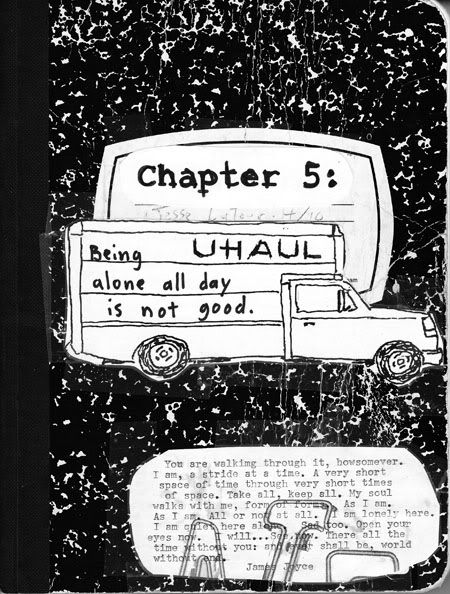
Dear Beatrice,
Will writing this make me feel better? Will it make me feel something? I don’t know. It’s funny how I do things to make myself feel good, and end up feeling bad. Or worse, I end up feeling nothing. Sometimes I think I do things to stop myself from feeling. Why? I hope, if you ever read this, that you will pray for me. It’s hard for me to pray anymore.
Sincerely,
Jesse
Our house is completely empty. Yesterday I helped my parents pack everything they own (and several boxes of my books) into a U-Haul moving truck. It felt weird to watch the rooms empty out. I don’t particularly like moving.
The first night in my new room at the Lacounte’s house. I’m laying alone in an unfamiliar bed in an unfamiliar room, surrounded by boxes. Penny stands on my stomach, trying to pick at the pages of my journal. I lay for a long time, thinking but not writing. I feel emotions. I want to write only I do not know what. My parents are 3000 miles away in Stoughton, Wisconsin. I have fears. I fear that, without the support of my parents, my colitis will flare up, my depression will return and I will not be able to bear it. I must reach out. I am not emotionally self-sufficient, even though I would like to be.
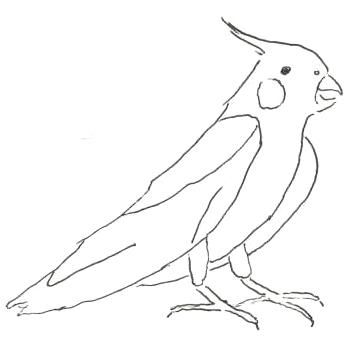
I’m hanging out at Starbucks with some co-workers on our break.
“(Humorous personal anecdote)”
“Ha ha ha he.”
“Mmm Hmm”
“(Complaint)”
“Mmm Hmm.”
“(Blah blah blah).”
“(Humorous personal anecdote).”
“Ha ha hee hee.”
Andrew and I are sitting in his room, watching The Big Lebowski, and drinking dirty martinis that he made. It tastes terrible.
“So my brother’s wife is going to have a baby,” I say.
“Babies are like aliens.”
“Some of them are cute.”
“I remember when my sister was born. She had a certain smell.”
“Like a bad smell?”
“No, just a baby smell.”
Suddenly, Donovan’s dog comes bounding into the room.
“Get the fuck out of here, Robot!” Donovan yells, and throws a book at the dog.
“I thought your dog’s name was Punker.”
“It is, but I’ve started calling him Robot.”
Three girls in a Jetta pull next to me and indicate for me to roll down my window. They are smiling. Then, when I roll down my window, they roll theirs up and laugh and drive off.
I walk downstairs, and Mrs. Lacounte is sitting at the dining room table talking with one of her friends. I’m filling a glass with ice, when Mrs. Lacounte asks,
“Hey honey. What’s the difference between an atheist and an agnostic?”
“Atheists believe that there definitely is no God, and agnostics believe that you can’t know if there’s a God,” I say.
“So, atheists are more absolute?” Mrs. Lacounte asks.
“Yes, and agnostics are more uncertain,” I say.
“Okay, thanks, honey,” Mrs.Lacounte says.
I pour a glass of orange juice.
I hear Seth and Christine’s baby’s heartbeat over the phone, from the ultrasound. It sounds like a helicopter.
Crying alone in a lonely room in someone else’s house. Fuck television. I don’t know what to do to make this loneliness and boredom go away. Even writing doesn’t help tonight.
Tonight I put on a Talking Heads record, “Little Creatures,” and danced alone in my room. It felt good.
A list of frustrations:
1.) Empty light on gas tank, no money to buy gas
2.) I’m at Albertsons buying water, and my debit card is declined
3.) I am forced to drink tap water that tastes like metal
Tonight I was angry so I took a water bottle and threw it into the pillows of my bed, but it bounced up and flew behind the bed and I had to reach really awkwardly to get it, because I was thirsty.
My first night sleeping in my new apartment, I’m laying on the couch, and I hear Landon and Jonnie giggling in the other room, and then I see them both walking out in their briefs, with it pulled up their butts like a thong and they jump on the couch with me and then prance around the living room. I walk out of the bathroom, and Landon, Aaron, and Brendan are standing at the door with their pants around their ankles, and they won’t let me pass, and I think Brendan’s penis touches my leg.
On the morning of my brother’s birthday, I awake, restless and weary. It’s my day off and I can’t sleep in. I need to sleep more. So I walk outside, smoke a cigarette, and watch the sunrise, but it hurts my eyes. I sit at a bookshelf, thinking of Seth, looking for archetypes--Jacob and Esau, Paris and Hector, James and John, Alyosha, Ivan, Dmitri. But I find nothing, except, in the letters of VanGogh:
To Theo
Nuemen, 30 April, 1885.
On your birthday I send you best wishes for good health and serenity.
But he spends the rest of the letter writing only about himself and his painting--“The Potato Eaters.”
I am cold. So I lay back in bed, pull the covers over me, and search for an image.
The posters on my wall--Matisse’s “The Flight of Icarus,” a Talking Heads album cover: David Byrne in briefs, with a globe on his shoulders, and beside him it says, “I can feel the weight of this world.” I close my eyes, scanning memories, photographs. And, at last, find what I seek: I am ten and Seth is twelve and we are at the Grand Canyon. Mom and dad are taking pictures. I am fascinated by the edge of the abyss. I step forward, and Seth extends his hand to hold me back.
I wake up cold and restless. Through the windows I can hear the loud noises of construction from the building across the street. I look over at my roommate, who is fast asleep. I envy the soundness of his sleep. This medicaton makes me restless. I pull the covers tight over my body and close my eyes, but my mind is awake. It’s no use. I can’t go back to sleep. I look at my clock--6:30. I don’t want to get up, but I can’t lay here any longer. I get up, take a cigarette and lighter from my dresser and walk out the back door, onto the rooftop of my building. It’s cold outside and the sun is newly risen. I light my cigarette and sit in a chair that is damp with dew. My head, my head. When will this feeling go away? I close my eyes, inhale smoke, and blow it out into the cold air.
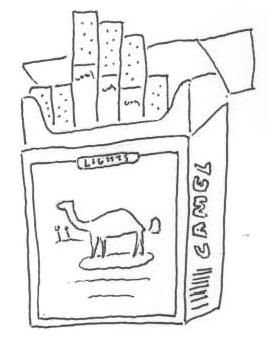
I lay on the black leather couch in my hot apartment, reading Artistotle’s Poetics. I fall asleep and wake up sweaty and light-headed. I need to do something with my life. I need to read, to write. I need to get out of this lonely apartment. I’m hungry. So I make a bowl of soup, watch the Simpsons, smoke a cigarette, pack my bag, get dressed and walk out onto the street.
It’s early evening and there are people eating dinner at Stadium Tavern. I watch myself in the windows of buildings as I walk. I’m losing weight. I pass a woman with a distance in her eyes and she asks me for cigarettes. I give her two. I walk to Starbucks, buy a tall tea and sit outside. Two homeless men are seated at a table and one asks me for change. I give him 85 cents. I sit, reading a Psalm, thinking about suffering. My mind aches--these four and a half years, this distance in my eyes. A young man tries to talk to me and my mind is so cloudy that I answer in short fragments. I don’t know what to say to people. My head is bothering me--the familiar, painful detachment, the depersonalization, the waking death. And so I pray, “Bring me back. Bring me back to life.” I wait for a girl to save me. I am trapped within myself. Still thinking about suffering, I look to my left and written on the wall are the words,
And from the darkness came the light.
I am waiting for the light.
Why can’t I ever write about anything except myself?
All alone in the apartment. No money. No cigarettes. I find myself digging through my drawers and clothes, looking for loose change, like a homeless person or drug addict. My loneliness intensifies my craving for a cigarette. From now on, I will really try to be more careful with my money. Bills this month:
$180--car registration
$160--car insurance
$90--therapy
$250--rent
$120--cell phone
total = $800 ! Fuck!
I’m walking back to my car, almost despairing because of the feeling in my head. I’m thinking about suicide. Then I hear a voice behind me,
“See you later, Jesse.”
I turn and it’s this pretty girl from my class.
“Bye,” I say weakly.
Walking to my car, I cry a little.
Standing at the intersection of State College and Yorba Linda Boulevard, reading Auden: “Something amazing, a boy falling from the sky.” The light changes, the walking man lights up, and, still reading, I step into the crosswalk. A car zooms past one foot in front of me.
“Holy Shit!” I say aloud.
A young man on a bicycle rides by, looks at me, and says, “That was close.”
I walk into my apartment and for some reason there is a rusty razorblade on the coffee table. No, not that thought. It would be so easy. To never feel anything again. Is there such a place as hell? Is this hell? If hell exists, there must also be a heaven.
I walk into my room, look at the map of the United States on my wall, and think, I can go anywhere.
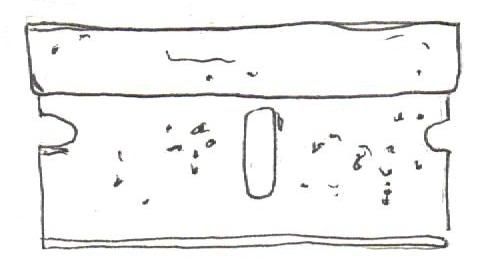
I sit alone in my apartment, nearly trembling with desire. I flip open my cell phone and scroll through the names. Why, why did I delete all those girls’ numbers? I try to remember, in vain, the number of a girl. Lauren, Heather, Maria, anyone. But I can’t remember any of their numbers. I put on my brown blazer, grab my pack of Camel lights, and walk out onto the rooftop of my apartment, which overlooks a street lined with bars. I look down, across the street, at the men and women drinking and talking loudly. I light a cigarette and stand staring at the talking people. Can they see me?
I go alone to a coffee shop because it’s Saturday night and I don’t want to be alone in my apartment. I want to see people and I want to see life, even if it’s only strangers.
At our Halloween party, I’m The Incredible Hulk, and I keep saying to people, “You wouldn’t like me when I’m angry.”
Being alone all day is not good. I don’t know what to do with this free time. I smoke too much. I call this girl Kristina, who I met last night, and leave a message. She doesn’t call back. I try to read The Sound and the Fury and I just can’t get into it. There’s a pretty girl inside Starbucks. Maybe she’ll come outside and talk to me. Probably not. There’s a 50-something man sitting alone, staring at his cell phone, probably waiting for someone to call.
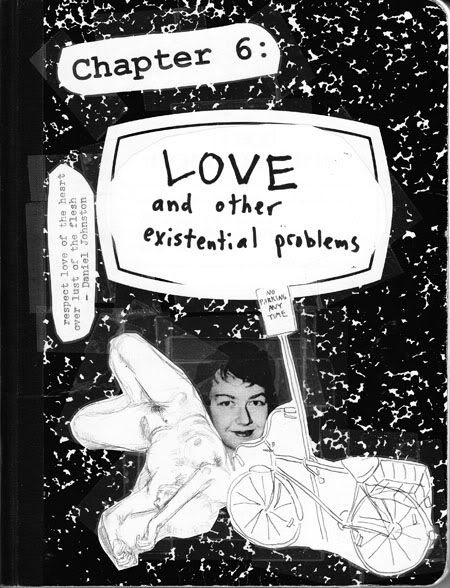
Dear Beatrice,
I don’t know what to do. I feel so restless. I sit on my rooftop and smoke two cigarettes and get a stomach ache. What do I do? I don’t want things to fall apart. Please don’t let them fall apart. I had this vision, this dream for my life. But now that dream has gone, or has changed. But what do I do? How do I proceed? How should I begin and how should I begin? O this life. I wander around my apartment, getting a drink of water, blowing my nose, feeling the countertop, looking at my reflection in a mirror. I am trying to orient myself in the world.
Sincerely,
Jesse
I sign onto myspace and there is a new message from a girl named Esther. It says, “Hi. Hello. How are you?”
I don’t know a girl named Esther, I don’t think. Most of the random messages I get from girls on myspace include a link that says something like, “Check out my sexy pics,” which is a link to a porn site.
I check Esther’s profile, and there are no links to porn sites. Just a picture of a bicycle, and lists of interests, some of which are similar to mine. I click on her pics, and none of them show her face. In one she is holding a strawberry shortcake ice cream bar over her face. In others, she is turned from the camera. She must be a dog. Or a burn victim.
.
“Hi, I’m Esther,” she says.
“Hi, I’m Jesse,” I say. And we shake hands..
I wake up this morning to a pounding sound downstairs. It’s like 3am, and it scares me. Probably some drunk person stumbling home. And then I get thinking about Esther, and I feel this feeling, this unfamiliar feeling—sort of like a weakness in my stomach and chest. A kind of pleasure that is almost painful. Is this love? Or is my ulcerative colitis flaring up again?
We are laying side by side on her bed, watching “Rushmore.” I edge my hand over so that it sort of brushes her hand. Then I grab one finger, and she grabs one of mine, and then we are holding hands. I do the “yawn technique” to put my arm around her. She rolls her eyes and then smiles. I kiss her cheek, then her mouth, and then we are making out.
“I like you,” she says.
“I like you too.”
“Does this mean we are going out?”
I hesitate.
“Yeah, I think.”
“So we are boyfriend and girlfriend?”
“Yeah, definitely.”
We are laying on her bed, watching “The Patriot.” I am sort of caressing her arm, and I feel these little bumps, like scars, on her forearm.
“What are these?” I ask, turning her arm so I can see them. There are all these little lines, like from cuts. She pulls her arm away.
“Nothing,” she says. I feel a heaviness in my chest.
Andrew and I are at a strip club called “California Girls.” We are drinking bottles of Bud Light and watching Sexy Sadie dance. It’s my first time at a strip club, and it feels pretty weird. There’s this middle aged guy with a moustache, sitting alone at a table, watching the show. This girl in lingerie walks up to our table and sits real close to Andrew.
“Hey boys.”
“Hello.”
“I’m Precious,” she says.
“Hello Precious.”
A man’s voice announces over a loudspeaker, “Right now, lap dances are two for the price of one!” Andrew slips Precious a bill, and then she takes my hand, and leads me to a chair in a semi-secluded part of the room. I sit down, and she starts dancing pretty erotically, sort of grinding her crotch and breasts against me. I don’t know if I’m allowed to touch her or kiss her, or even if I want to.
Andrew says that if you are interested in calling a girl, you should masturbate first, and then if, after masturbating, you still feel like calling her, you should. Because it means that you are probably interested in more than just having sex with her. But if, after masturbating, you think, “Wow, that girl isn’t even cool. What was I thinking?” then you shouldn’t call her.
“You have issues,” she says.
“Like what?”
“You need to figure those out for yourself.”
“I’m trying.”
“Are you?”
“You have issues too.”
“I know. But you’re worse off because you don’t understand your issues.”
“It’s funny how you turned out so good, when you’re the one with the messed up family.”
“Thanks.”
“I’m just saying.”
Okay. So. There are these two paradigms: God and no God. In the God paradigm, sex before marriage is bad. In the no God paradigm it’s okay. Could there be a God paradigm in which sex before marriage is okay? Hard for me to imagine. I could keep the God paradigm and the sex before marriage but then there’s all that guilt. I could chuck the God paradigm and keep the sex before marriage, but then there’s all that emptiness and existential shit. It’s a bind, no doubt. If I’m going to go ahead with the sex before marriage, I must be willing to suffer. Either guilt or existential shit. Probably both.
There is a mysteriously large hole in the sheet at the foot of my bed. I ask Landon about it, and he says, “You move your feet like crazy when you sleep.” Why do I do this? Why do I grind my teeth when I sleep?
“Are you sure?”
“I’m pretty sure.”
“Pretty sure?”
“Well I don’t know how it’s supposed to feel. I like you a lot. How do you know you love me?”
“I just know.”
“Well, I guess I’m a more uncertain type of person.”
“I guess so. I hate that.”
“I’m sorry.”
For me, sex is always associated with intense, almost unbearable, guilt.
I’m dancing on the rooftop, pretty wasted. It’s Brendan’s going away party (he’s moving to New York.)
“Take your shirt off, Jesse!” Andrew yells. So I take my shirt off, and dance, but then for some reason I feel really self-conscious.
“I’m embarrassed,” I say, and run inside.
I walk to Table Ten to see if Nikki is there, and she is there, but so is her boyfriend, so I walk home, drink more, throw up, and pass out.
I have a dream where I really miss Esther. But then I wake up and I don’t miss her as much. But then, driving to my parent’s house to do laundry, I miss her again.
“Another round, Kevin!” she says, and puts her hand around my waist, and slides it down toward my butt.
“Take a shot, baby.”
“Oh, I think I’m good.”
She hands me the shot glass.
“Well, okay.”
And then she starts kissing me, and I’m not really that attracted to her, but I’m so drunk and horny and lonely that I kiss back. Right in the middle of this crowded bar. We stumble back to her apartment and she does a line of cocaine. I refuse. I follow her to her room.
At 4am, I awake sneezing and barely able to breathe. Two cats lie snuggled in her bedding. I quietly leave and walk home through dark, deserted streets. It’s Sunday morning and I was going to go to church, but instead I sleep until noon. I go with this girl and her friends to brunch late Sunday morning. They drink mimosas and bloody Marys like water. I take two sips of a bloody Mary and almost puke, so I drink water. After brunch, I go home and collapse in bed. I can hear them across the street at the bar, drinking and laughing. These are people who can literally drink all weekend. As I lay alone in bed, feeling utterly depressed and sick, listening to their drunken revelry, I wonder if I will become one of these people.
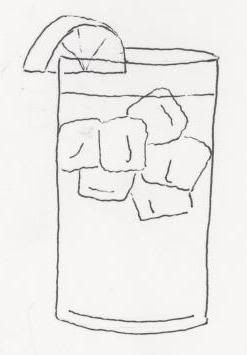
After seven vodka cokes, I stumble home, lay in bed, and send text messages to all the girls in my address book:
To Esther: “Hi.”
To Jenn: “Jenn!”
To Christy: “Watcha doin?”
To Erin: “Hello.”
To Courtney: “I miss you.”
To Laura: “If you are too drunk to drive home, you can crash at my place.”
To Esther: “You are in my novel.”
To Rachel: “Torture me in some other way, my dear fury.”
No one replies.
My friend Ryan once said, “Drunkenness is a lonely apartment.”
I text Christy: “Watcha doin?”
“Watching Sex and the City.”
“Do you wanna have sex in this city, with me?”
“omg”
The road to hell is paved with booty calls.
And in the morning, I feel like shit.
I’m sitting in Mulberry St with this girl I used to date in high school. My first kiss. Back in the days when a kiss was a rare and beautiful thing. This was like nine years ago. So she’s in town for Thanksgiving and we’re having a beer. She looks about the same. I look bigger and fatter.
“So when did you get engaged?”
“Last weekend,” she says.
“I thought you said you were never getting married.”
“Yeah, I thought so. But now I’m engaged.”
“I’m confused about things. I don’t know what the right thing to do is.”
“I don’t know either.”
“I mean, if you’re marrying someone, you should be certain, right? You should know that you want to marry them, right?”
“I think that’s how it’s supposed to go.”
“Maybe it’s just a problem with me. I mean, I’m not certain about anything.”
“Me neither.”
“What is love? Is it a feeling, or is it a choice, or is it both?”
“I think maybe both. But I’m not certain.”
“…”
“…”
“For most of my life, I’ve had this idea that I had to get married to be happy. Lately, I’ve been thinking that that might not be true.”
“…”
“But the idea of being like 50 and single, living alone in some apartment with cats, is kind of depressing.”
“And the idea of being 50 and married, living in some suburban home, leading a boring, ordinary family life, is also kind of depressing.”
“Why don’t we get married and agree to never let our lives get boring?”
And then we are lying on a couch in my storage room, head to toe, talking about sex and depression.
“We only talk about sex and depression.”
“What else is there?”
“When last I saw you, I had no experience with either sex or depression.”
“…”
“…”
“When I was younger, I remember feeling like head over heels for girls I liked. I don’t really feel that way anymore, which is why I don’t think I’ll get married.”
“That could just be the medication you’re taking.”
And now we are laying on my tiny Ikea twin bed, our heads resting on my Star Wars pillow.
“I can’t believe you live like this.”
I massage the knots in her back.
“Push harder. That feels good.”
“That’s what she said.”
I hold her thin body in my arms. I understand her sorrow. She is engaged to a man who no longer excites her. She feels unappreciated and lonely. How different we are from who we were. We have become sad.
“So we should meet again in another ten years.”
“Do you think we’ll be happy?”
“I hope you’re happy.”
I feel her foot against mine. I hold her, sort of cradling her head, and kiss her forehead, and I almost cry.
At Starbucks, I run into this guy Dennis, who I’ve seen around the bars. I’m writing in my journal.
“You a writer?” he asks.
“I’m trying.”
“You should write something about Fullerton. The ugliness and the beauty.”
“Maybe I will.”
You have to look hard for the beauty because there is so much obvious ugliness. But in this world, the beautiful, like the good, is humble, modest. She speaks in whispers. She is shy. But when you find her, even catch a glimpse amidst the loud ugliness, well then that is something.
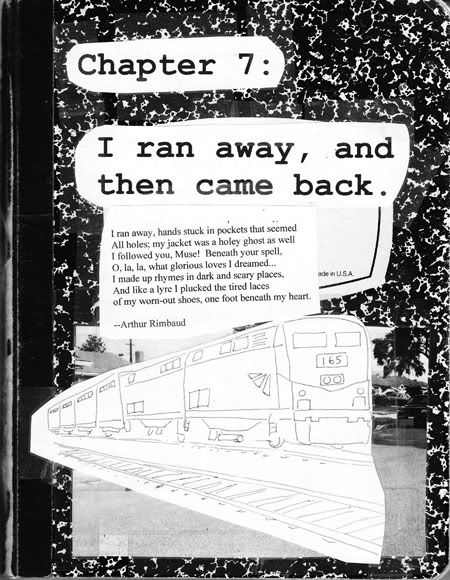
Dear Beatrice,
Fuck it. I will bear it, as I have borne everything else. And from this shitty mess, I will try to make something beautiful. I will get on a train this summer in search of America and an ending for my book. Will I find these things? I don’t know. Into the heart of a wounded country I go, with a notebook and a video camera, to tell of the things I see.
Sincerely,
Jesse
How to describe the California coast? It the south, it's mostly sandy. As you move north, from Santa Barbara to San Luis Obispo and on, it gets more rocky. The beaches become cliffs.
There are a lot of homeless people in downtown San Francisco. This homeless man is standing by a shopping cart shouting various platitudes at the people walking by:
To two women: "Life's a journey, not a destination. Remember that!"
To two men: "God made Adam and Eve, not Adam and Steve! Take your fag shit down the road!"
To a young woman: "Yowsa! Lookin' foxy!"
To the general public: "I'm an American hippie! I don't give a fuck about your money!"
To me when I refuse to give him money: "Fuck you!"
I arrive in Berkeley and the first thing I do is purchase an organic, fresh-squeezed orange juice.
The men playing chess in Union Square. I'm reading a book about Kafka. He suffered from digestive problems and headaches. He felt alienated from himself and those around him.
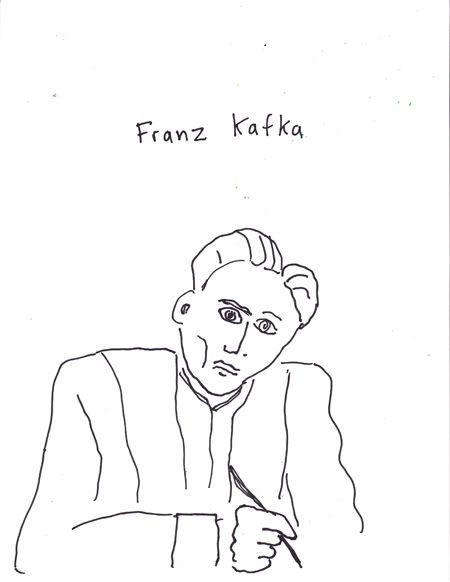
San Francisco’s Chinatown kicks LA’s Chinatown's ass.
In the Ferry building on Embarcadero, rich people sip wine, purchase expensive meats and cheeses from posh shops, and watch the boats. A few blocks away, on Market St., poor black men sell scented body oils for $4 a vial, and homeless men sleep on the steps of the United Nations building.
In the lounge car, a black man wearing a leather jacket and leather pants is singing a capella to three women in a deep, flat voice: "Some say loooove, it is a river..."
Living in Southern California, where virtually everywhere is paved and "developed," I forget that there are places like the Sierras and the Rocky Mountains--vast stretches of untouched, beautiful land--trees, mountains, and rivers.
I imagine there will be some lonely spells on this trip. On a train somewhere in a Nevada desert, I feel a little lonely, drinking a can of Budweiser and eating a microwaved cheeseburger. Riding through the wasteland of Nevada, I am amazed at how the early pioneers made it through this on horse-drawn carriages. I don't think I could make it. And how beautiful California must have looked after this vast white and brown desert.
On the train to Denver, I listen to an audio recording of The Wizard of Oz. Each character claims to lack something they actually have. The scarecrow claims to lack brains, but he's always devising clever ways to get out of tough situations. The tin man claims to lack heart, but he's always protecting small animals. The cowardly lion claims to lack courage, but several times he courageously protects his friends. And Dorothy claims to lack/miss her family, but the friends she meets in Oz are more like a family to her than her aunt and uncle in Kansas, who are cold and unfeeling. It's about how we get so preoccupied with what we think we lack that we don't realize what we have.
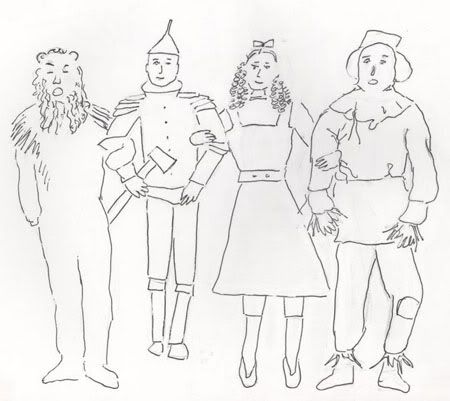
Coming down out of the Rockies, out of miles and miles of mountains into miles and miles of flat prairie as far as I can see. The sky feels bigger here, and I feel smaller.
In the historic Civic Center plaza in Denver, a young Latin couple is writing graffiti on a wall. When they see me, they stop.
"I don't care," I say, and they continue writing.
"They kicked us out of our home," the young man says.
On the fourth of July, I go alone to a pub by Coors Field to watch the fireworks, but there's this huge awning that obstructs my view. I have this text message conversation with Courtney as I get progressively drunker:
"I am the loneliest boy ever to drink a pint of beer."
"..."
"Pick me up and take me somewhere. Anywhere."
"You must be drunk & that is a bad idea. If things were different, id have spent the whole wknd with u."
"Why cant things be different?"
"How?"
"You can leave everything behind and come with me."
"go home. you are going to get too lonely on your trip."
"I can handle loneliness."
And in the midst of my loneliness, this happens:
I wander back to my hostel and my four roommates are drinking beer and laughing--a black man from Hawaii who is clearly high, a Mexican from Hollywood, a Mexican from New Mexico, and a young Japanese man. They offer me a beer and soon I am joining in the laughter.
We leave the hostel and wander downtown together--a motley crew. The black guy is talking to literally every girl we pass, and it is really funny. I want to take notes.
We wander into this bar called Croc's, where there are girls standing on the bar with dollar bills stuffed under garter belts. I feel self-conscious so I hang out with the black dude, who keeps introducting me to girls as his friend from Belgium. I wave and say nothing because I don't know what to say.
Outside on the patio, I get talking to this girl named Katie who is actually an English major and makes her own clothes and is actually is very cool and cute, like this is the one person I am supposed to talk to. So we talk and drink and I end up going home with her even though I have to catch a 5:40am train to Chicago.
She lives alone in this old loft downtown. We make out and crash into her keyboard because we are both a little drunk, and I decide to miss my train. As we're making out, I notice she has dirt under her fingernails and because I also have dirt under my nails, this brings me great comfort. since I'm always self-conscious about my dirty fingernails. Amy always commented on them, for example.
"I like how you have dirt under your fingernails, because I also have dirt under mine," I say.
"That may be the sweetest thing anyone's ever said to me," she says.
A very long and very strange bus ride from Denver to Chicago. The smells of a 24-hour bus ride--body odor, farts, strange human smells. Sleep-deprived, having not taken Paxil for three days, stuck in a seat for 24 hours, thinking about Katie from Denver mostly. I drift in and out of sleep and the night is a strange amalgam of dreams and waking. Once I think I see a train heading right for our bus, but I blink and realize I am dreaming. In my sleepy/lonely stupor I fear I am going crazy, seeing things, hearing things. But it is just the strange mixture of sleep and waking that accompanies a very long bus ride. I will be happy to reach Chicago.
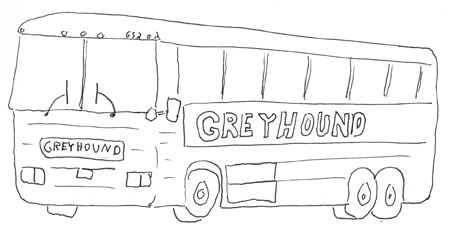
The midwest is mostly vast expanses of flat farmland occasionally interrupted by similar-looking small towns. Farms with their phallic grain silos dot the landscape.
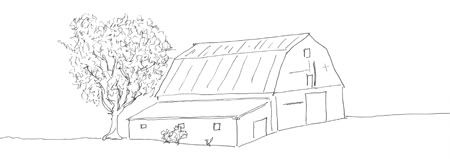
I wanna write this before I get to drunk. I’m writing on a bar napkin. At the Green Mill, a jazz club that used to be a speakeasy in the 30s where Al Capone used to hang, and possibly where my great grandfather used to hang out (He would leave his family for a week and go on bender trips to Chicago, a fact which both saddens and excites me). I think of my great grandfather Ted Morey being here in the 1930s during the Great Depression—the music, the times, the depression, contrasting with the vitality of the music—I get the chills. A blind man plays the Hammond Organ, a fat man plays the drums.
Behind the bar is a circle stage where stands an old organ. Atop the organ is a shrine to Al Capone—a black and white photo, a candle, a tattered American flag, some empty booze bottles. On the walls are these really old painting of pastoral scene surrounded by ornate frames. I image Ted Morey looking at these same paintings. I wish I knew him.
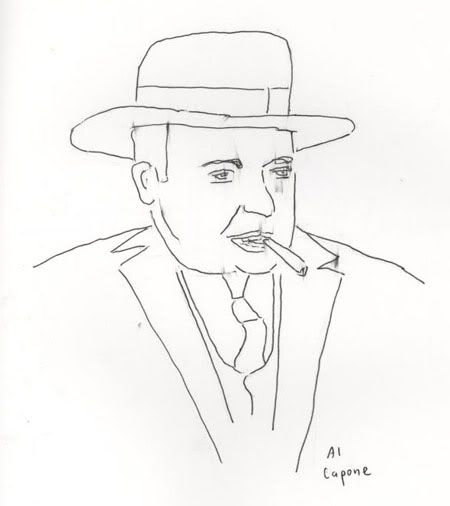
Oak Park, Illinois—birthplace of Frank Lloyd Wright and Ernest Hemingway. Wright wanted to “break the box” of Victorian architecture that was everywhere in America at the beginning of the 20th century. He invented the “prairie style”—open rooms, low roofs, wide windows, rooms within rooms. Some of his houses have trees intentionally growing through them. Walking down Forest Avenue, you can see some of the houses he designed, breaking the monotony of the Victorian homes. Hemingway did the same for the American novel—breaking the box of flowery Victorian style—inventing a simple, direct American style. On the tour of Hemingway’s birthplace, I learn that seven Hemingways have killed themselves. I guess it was depression.
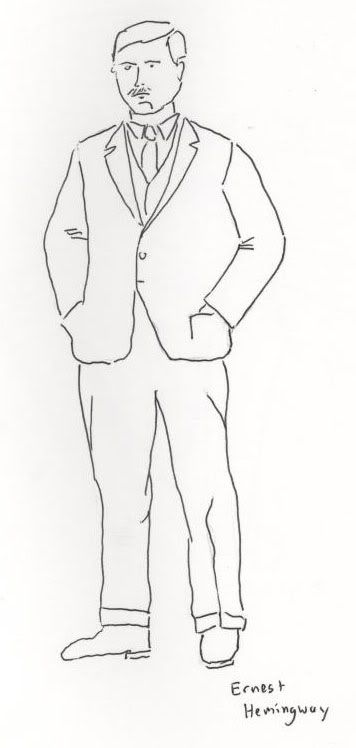
Sun Studios. Memphis, Tennessee. Sam Philips discovered Howlin Wolf, Johnny Cash, Elvis Presley, Carl Perkins, etc. He was a god. U2 recorded “When Love Comes to Town” with B.B. King at Sun Studio in 1987.
At the Rock and Soul Museum, I watch a short documentary about the Memphis music scene, and how record companies like Stax were integrated at a time when that was very rare. Isaac Hayes says, with tears in his eyes, “People said it can’t work—whites and blacks can’t make music together…One of biggest lies ever told.” I learn about a film called “Wattstax” put on by Stax records in Watts, CA in the late 60s. It was sort of like the black Woodstock. I wander the museum with my notebook in hand, writing down names of blues, folk, country, and rock artists I want to check out.
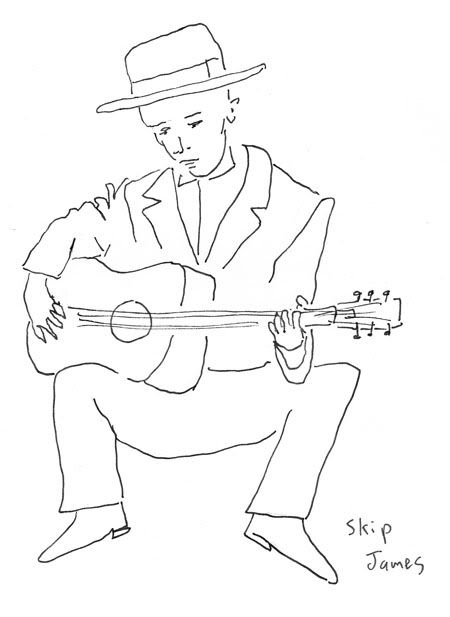
Beale Street, downtown Memphis. A strip of old blues clubs and barbeque joints. B.B. King is from here. It is unlike anywhere I’ve ever been. I want to linger here longer, listen to blues and eat barbeque, but my train leaves tomorrow, and I am exhausted. I shall return.
On the bus back to Graceland, I meet a young sociologist from Norway. He’s traveling on trains like I am. He tells me he visited Washington D.C. and calls it “a fake city, a dead city. The monuments are guarded by men with guns, and outside is poverty and crime.” He also comments on how Graceland is right next to a ghetto, which I also noticed. I say, “A lot of American cities are like that—separated by color, unofficially of course. He tells me he saw Tom Waits in Birmingham. I tell him I’m jealous.
In Greenwood, Mississippi, there’s a junkyard of old cars about a mile wide.
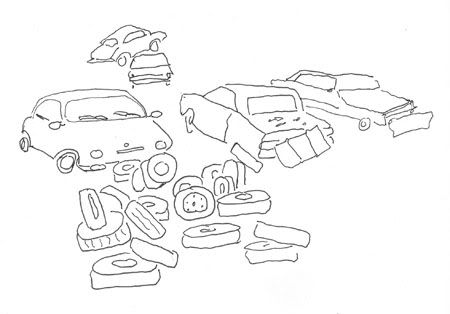
In the dining car, I get talking to the Rails ‘N Trails guides—and old white man and an old black man, both from New Orleans.
“What are those trees that grow out of the swamp?” I ask
“Those’r Cyprus trees. They use those to build houses in N’awlins, cus the wood is so strong and resistant to water.”
The black man tells me his house was flooded eight feet during Hurricane Katrina. He had to leave his house for two months. The white man remains quiet. I guess his house was okay.
Mississippi—swamps, small dilapidated towns, a blue watertower that says Lambert, fields of crops (tobacco?), trees so dense and gothic, growing out of water.
The French Quarter—wrought-iron railings, Larry Flynt’s Hustler Club (girls in bikinis outside beckoning us to come in), Barely Legal, 3 for 1 Drinks!, frat and sorority people getting shit-faced, old 18th century architecture, Voodoo shops, drag queens. Giles and I go into this old weapons shop.
“We should get rifles with bayonets,” I offer.
“Might be a bit tricky getting it through customs,” he says.
Drinking literally all day. The old locals have this haggard, bleary-eyed look—too much alcohol, too much humidity.
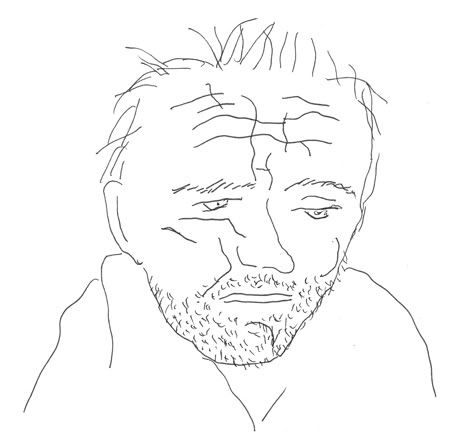
By a sleeping cat, I sit and read Rimbaud on a summer night in New Orleans. Nursing a stomach full of booze and jambalaya, eyes full of the French Quarter, the drunken debauchery of Bourbon Street. I wandered these old streets all day and night, these buildings haunted by too much history and culture and suffering and rebirth, I saw the fortune tellers and tourists and poor blacks and rich white frat boys and college girls, I see something complexly human in this wounded city, in the cast-iron railings, in the “Big Ass Beers” in plastic cups, in the muggy heat that clings to your skin and saturates your clothes, in the tombs that lie above ground, in the ghosts of plantation owners and slaves and General Beauregard and General Jackson. I see suffering and heaviness, yes. But I also see something beautiful. And now Mazzy Star sings sadly from an old radio and blends with the sounds of a TV show and a lone black man occasionally laughing. And me, alone, sitting by a sleeping cat and writing, a stomach full of booze and jambalaya and a heart full of something I struggle to name.
I’ve noticed that graffiti exists pretty much everywhere in the US, from Los Angeles to Chicago, to Bessemer, Alabama. The somewhat disappointing thing is that it looks about the same no matter where you go. It loses some of its uniqueness and shock value when it looks pretty much like every other graffiti I’ve seen. I wonder when graffiti artists will break the box of traditional graffiti.
I’m sitting in Kelly Ingram park in Birmingham, where in 1963 police released dogs and fire hoses on black children who were protesting for civil rights. There’s a stone walkway around the park, with several sculptures—praying ministers, fire hoses aimed at children, snarling dogs and two children standing with a plaque that reads, “I ain’t afraid of your jails.” Across the path is an upside-down jail cell with the inscription, “Segregation is a sin.” This old black man walks up and introduces himself as Juan. I shake his hand. It turns out he was here in ’63 when all this shit went down, or so he claims.
“You know why that jail is upside down?”
“Why?”
“Cus we turned the jails upside down.”
Juan guides me on a tour of the park, explaining various key players in the Birmingham civil rights movement.
“You see that circle in the center of the park that reads ‘Revolution and Reconciliation’?”
“Yeah.”
“That’s where Dr. King stood.”
We’re sitting down and I’m listening to this man tell his stories. The Civil Rights Institute is closed today, but this is better than any audio tour or museum.
I notice track marks on Juan’s arms, from needles.
After the tour, I shake his hand again.
“Thanks a lot, man.”
“Say, could you spare some money for my lunch?”
I give him $12.
At the other entrance to the park is a statue of Dr. King, and across the street is the Sixteenth St. Baptist Church, which was bombed in the 60s, killing four little black girls. The four-part fountain in the center of the park and the four pillars represent these girls.
“The fountain represents eternal tears,” Juan told me.
I sit on a bench writing and another old black man with a cane walks slowly by. We wave at each other and say hello and I almost want to cry. I am the only white person at Kelly Ingram park today.
Flipping through the channels in my hotel room in Birmingham, I find this story on the local news: Three paramedic trainees at a local hospital were fired for taking part in some kind of initiation ritual that involved dressing up like KKK members and holding a wooden cross. On a religious station, Texas mega-pastor Joel Osteen is giving a sermon that begins like this: “Morning, folks. I like to begin my sermons with a joke. So…in heaven God asked the men to form two lines—one line of the men who took their rightful place as head of the household, and another line of men who let the women take charge. Only one man stood in the first line (which I gather is the “right” line), and God said, ‘Well done. You obeyed me by being the head of your household.’ And the guy said, ‘My wife told me to stand here.’” Great laughter. Hahahahahahaha. I guess racism and sexism are alive and well in America.
I’m sitting in the center of Kelly Ingram Park, enjoying an iced mocha before I check out the Civil Rights Institute. Four police officers (three white, one black, trailing a little behind the others) approach me.
“Morning. What you doin’ here today?” one of them asks.
“I was just about to check out the Civil Rights Institute.”
“What you got in that bag?”
“Camera, dirty clothes, some books.”
“Mind if I take a look?”
“Not at all.”
He opens my bag and rifles through my stuff.
“Can I see some ID?”
I hand him my license.
“What you doin’ outside California?”
“Just wanted to see the rest of the country.”
“Mmmhmm.”
“Am I in trouble? I swear I just came to see the civil rights stuff.”
“I need you to stand up and lock your fingers behind your head.”
I comply, and he searches me.
“It’s ironic that you came to see the civil rights stuff, and now your civil rights are being violated.”
“Haha,” I laugh uncomfortably.
“Is this one of them video ipods?” the man frisking me asks, pulling my ipod out of my pocket.
“Yeah.”
“Thanks for your cooperation,” the big one says, and they all walk away.
Thus, my only confrontation with police was in Kelly Ingram Park in Birmingham, Alabama.
In a room in the Civil Right’s Institute, there are large images of black and white people on panes of glass. Someone, fairly recently, has scratched away the neck area of an image of a black woman, so that it looks like a rope burn. In another room is a black and white photograph of two young black men hanging in a public square, surrounded by a mob of white people. One man is pointing proudly. A young woman is smiling. Another display gives real sample questions on a “poll quiz” given to blacks before they could vote:
1.) How many grains of sand in a seashell?
2.) How many bubbles in a bar of soap?
I see a short film on the “Freedom Riders”—a group of blacks and whites who rode a Greyhound bus from Washington D.C. to New Orleans, to make a statement about integration. They were mobbed, beaten, and firebombed. It almost makes me cry.
Trying to get to the White House, I go the wrong way on Pennsylvania Avenue and end up in a poor black neighborhood. It seems strange to me that the president would live in a place like this. And when I get to 1600 Pennsylvania Avenue, it’s a McDonalds.
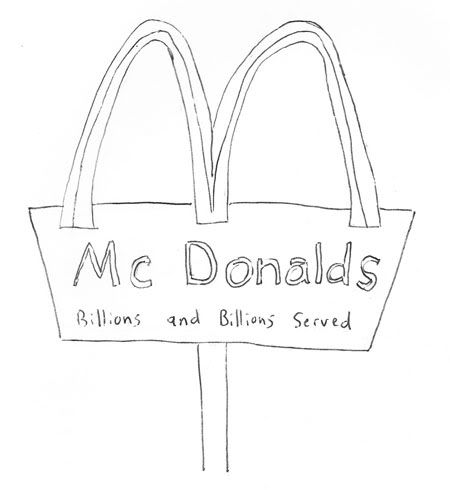
Washington D.C.—unreal city—giant monuments of marble and stone in Greek Neo-Classical style, expensive hotels, it’s all very clean and lifeless unless you wander from the city center to the poor neighborhoods which surround it. Outside the White House, I notice two black limousines pull onto the driveway. Through the windows I can see two Middle-Eastern looking men. I wonder what the president is up to. I bet the average American, myself included, doesn’t know half the shit our president does. Outside Union Station is a massive monument to Christopher Columbus. No mention is made of the indigenous peoples he enslaved and killed. Nar the White House is a massive monument of General William Tecumseh Sherman, the Civil War “hero.” He was known as the “meatgrinder” because he was willing to sacrifice enormous numbers of his own troops to win battles. Also, he would burn the southern cities he conquered. At the Washington Monument, no mention is made of the slaves General Washington owned. These are our heros. Wandering this unreal city (hot and sweaty and thirsty and tired, toting a large backpack) I feel perturbed.
Arlington Cemetery—acres and acres of graves, young men killed in America’s wars.
I go to the Philadelphia Museum of Art not to look at the art, but to run up the front steps, like Rocky. I pass up the Rodin Museum and instead decide to see the statue of Rocky. There is no inscription except for “Rocky” on his shorts.
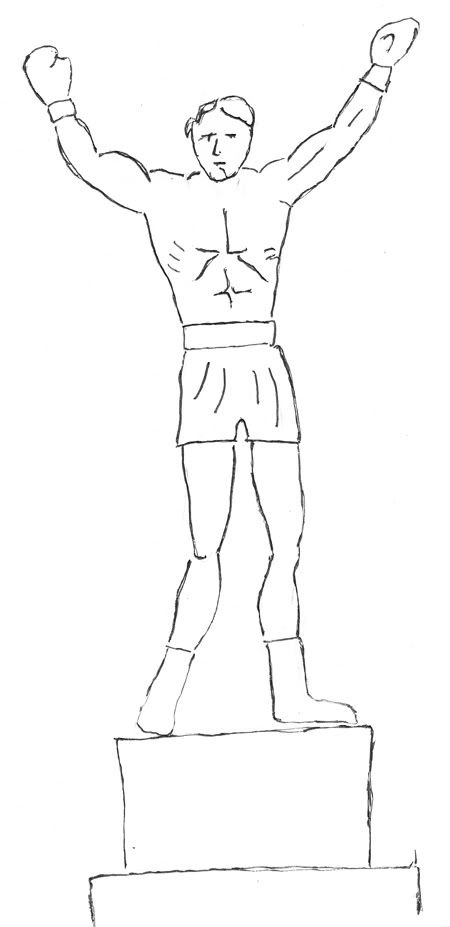
I see the Liberty Bell, Independence Hall, The Articles of Confederation, and the Constitution. I don’t know what I’m supposed to feel as I look at these things. I don’t really feel much. I don’t really think much except that now I can say I’ve seen these things. Is that a good reason to see something—just to say that you’ve seen it? I dunno.
Like the Gideons leave Bibles in hotel rooms, I leave my copy of Don Quixote in the bedside drawer of my hotel room in Philadelphia.
On a train from Philadelphia to New York, cramped in a four-seat alcove with an elderly black couple and some Euro kid, reading Rimbaud. The light through the windows plays on the pages of my book—orange, yellow, and shadows. It is a singularly pleasant experience and I feel the full weight (or lightness) of what I am doing. I am traveling..
I get a ticket for one of those double decker city tour buses, and cruise Manhattan. I go to the top of the Empire State Building. I probably wait in four different lines for like two hours to get up there. Also, it costs $19. How different this is, I think from Sleepless in Seattle. In that movie, Tom Hanks and Meg Ryan got zipped right to the top (for free) by an old elevator man. The reality is much different. I t would be funny if Sleepless in Seattle depicted this reality. Tom Hanks has to pay $19 and wait in long lines with a bunch of tourists. I take the ferry to Liberty Island (more long lines)—but it is actually pretty impressive. I go to Ellis Island and watch this short film on immigration. Behind me in the movie, one little boy says to another little boy:
“Christian, this is not a movie like Star Wars or Kung Fu Panda or Wall-E. This is a movie about real people who came here and lived here and died here.”
Maybe it’s because I’ve skipped my Paxil the past couple days, but as I wander Ellis Island, I keep getting choked up, like I’m about to cry.
Coney Island is totally amazing! A somewhat run-down amusement park with a ferris wheel (Wonder Wheel), a roller coaster (Cyclone), lots of old-fashioned carnival games, and of course Nathan’s hot dogs, home of the annual hot dog eating contest. I wander around filming everything—this decayed piece of Americana. My travel book tells me it used to be an upscale, exclusive amusement park, but that all changed when the subway lines opened it up to everyone.
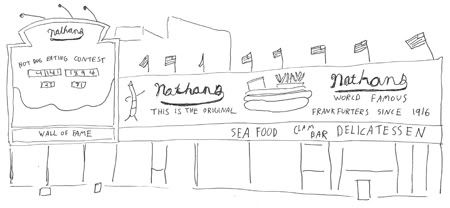
I wander Fifth Avenue past the designer stores—Louis Vuitton, Saks Fifth Avenue, etc. I make my way to St. Patricks cathedral, which looks like something out of medieval Europe—gothic spires, high stained glass windows, ornate masonry. It reminds me of Chartres cathedral in France. Above the arched doors is a bas-relief sculpture of Christ.
Directly across the street is the Rockefeller Center, with the large sculpture of Atlas holding the world on his shoulders, and it strikes me how these two landmarks different American worldviews. There is Christ and His call to humility and selflessness and surrender. And there is Atlas/Rockefeller—the capitalist icon, holding the world, the captain of industry. Christ and Atlas—two icons of the American character.
In Boston, walking the “Freedom Trail.” Outside the Massachusetts State House, protestors hold signs condemning the abolition of bilingual voting ballots. Sam Adams, Paul Revere and others are buried behind Park St. King’s Chapel, once an Anglical church, became the first Unitarian church in America in 1785. The pews are boxed. You used to be able to rent a nice pew if you were wealthy, like box seats for a sporting event.
The first public school in America is now a Ruth and Chris’s Steak House. The Old Corner Bookstore, one of the oldest publishing houses in America, is now a jewelery store called Ultra Diamonds. I go pee on the battle site of Bunker Hill.
A man dressed as a cowboy standing under and American flag, eating McDonalds, in a Greyhound bus station. This is America.
On the bus, a man removes the top of a can of Campbells “Fully Loaded” Chunky beef soup, folds the top, and uses it like a spoon, or a shovel, to eat the cold soup. A crying infant climbs and paws at the rounded stomachs of its overweight parents, as if to ask, “Why was I born into this?” The woman reaches her fat hand into a Pringles can, but her hand is too fat to reach the remaining Pringles, so she has to dump them into her mouth.

Now the overweight woman is eating a plastic pouch of cold pasta that is meant to be microwaved, and sharing it with her infant son. The man is into another can of Campbells “Fully Loaded” Chunky beef soup. These people are constantly eating. And they feed their infant son all the junk food they eat—Pringles, Coke, candy, etc. Whenever the infant of the overweight couple cries (which it does, very loudly, every hour or so) the way they get it to stop crying is by feeding it junk food—Hostess Donettes, Pringles, Coke. This technique works well—the child appears comforted and calmed by the mere appearance of the junk foods. This, I think, is how obesity begins.
Outside Chicago, we pass a middle-aged man in a white Corvette with this vanity plate: IM IAN.
In the train station, two old women pass the time by doing needlepoint designs.
“Well, we’re in Raton, New Mexico,” one of them says, “Was this on your bucket list?”
When you ride the train through the industrial outskirts of larger cities like, for example, Albuquerque, you see the backs of business buildings, you see what advertisers and marketing departments don’t want you to see—the unvarnished face of commerce—square, graffiti-covered buildings, acres of piles of products—stacks of refrigerators, pickup truck shells, machines and appliances whose function I cannot determine—piles of metal and plastic.
5:15am. Somewhere near Barstow, California. Thoughts on returning home, and on my train trip in general. On a literally surface level, I now know what a lot of our country actually looks like, which is good. But on a deeper level, I think I’m less afraid now. I made it on my own for a month all over the country, in strange cities and places. I’m not afraid of traveling alone, or just setting out on strange adventures. I want more adventures. I want to explore the whole world. Also, I think I’m less afraid of people. When you’re traveling alone, you have to talk to and meet new people. Most people I met were decent and interesting people. I’ll never forget Giles from Wales, Peggy from San Francisco, Katie from Denver, Frank in the Café car, the girl in New York who I danced with and then dry heaved, the police officers in Birmingham who searched me for drugs on the same spot where police turned dogs and fire hoses on black children in the early 1960s, Mike the jazz drummer who I met at a former speakeasy in Chicago called The Green Mill, the Swedish guy I talked to on a bus in Memphis who called Washington D.C. a “dead city”, and the Jewish father and son from Long Island who I got drunk with on bourbon on the train ride home…
I’ve never felt so comforted, relieved, and excited to see the suburbs of Southern California—Riverside, Irvine, Santa Ana, Orange, and finally Fullerton. I am home.
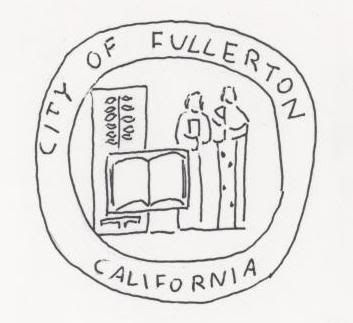
“Now I pray you, by that virtue
which leads you to the top of the stair,
think of me in my time of pain.
Then he hid himself in the refining fire.”
--Dante, Purgatorio
Book 3: Paradise
Chapter 1:
“We are all bitched from the start and you especially have to be hurt like hell before you can write seriously. But when you get the damned hurt, use it—don’t cheat with it. Be as faithful to it as a scientist.”
--Ernest Hemingway, from a letter to F. Scott Fitzgerald
Dear Beatrice,
I remember, when I first began writing this book, I imagined the story’s arc would be something like this: religious young man has traumatic illness/existential crisis, loses faith, gets severely depressed, begins long struggle to re-build his mind and his faith, culminating in his re-affirming his faith, getting married, living happily after. A touching fantasy.
This, however, did not happen. The story goes more like this: young man has traumatic illness/existential crisis, loses faith, gets severely depressed, begins long struggle to re-build his mind and his faith, discovers art and literature, gets a Masters degree, stops going to church.
The crisis did not end. Here I am, 30 years old, and more uncertain than ever. If anything, this is a story about being okay with crisis, of using it. The sparks of this crisis are the words in this book.
Sincerely,
Jesse
I scan my bookshelves alone in my apartment on a Saturday night, looking for something to read that will give name and form to this particular constellation of feelings, but I can find nothing. So I will try to write it.
Lonely. Said goodnight to a girl so I could go home, drink a beer, smoke two cigarettes, and watch internet porn. It’s easier to do those things than try to navigate the more complicated waters of dealing with and relating to a real person. I will settle for substitutes. I know it will bring long-term emptiness and pain, but I lack the strength and will to work toward something real with a woman.
So I lay alone in my cum-wet boxers and write with a broken pen. It’s like Oscar Wilde said, “We are our own devils.”
I’m sorry for the man I’ve become. I’m sorry. I’m sorry. But who can I apologize to? I embarrass myself. I want our lives to sing. I want to believe in God and not be afraid of dying all the time. I want to look my father in the eyes and say, “I believe.” Instead, I evade the issue and we both have sad eyes. I’m sorry, dad. I’m sorry, mom. I’m sorry, brother.
Remember when we all believed the same things and it made sense? Sometimes I want to be a child again, but I am an adult with all the accompanying pain and guilt and regret and difficulty saying what I really want to say.
How can I say it? 25 years of English study and I can’t even write it. Not all at once. I’ve gotta keep trying. The things that matter often take a long time to say.
...
TV or not TV. That is the question.
Whether it’s nobler in the mind to sit and passively, mindlessly receive sounds and images, or to take arms against a sea of passivity and fucking do something useful with your life, because your time is limited.
I refuse to waste my life.
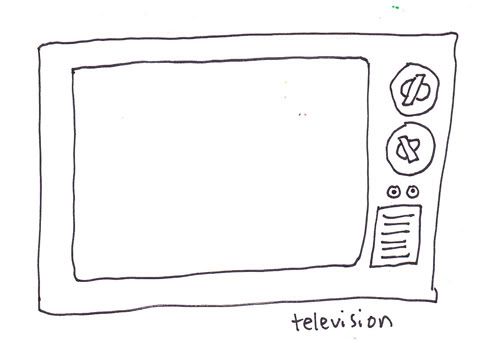
...
A restless afternoon. I wander. I get in my truck and just drive, wasting gas, hurting the environment. But I feel this restless compulsion. I drive, looking for a place to read and draw. A place to get a cup of coffee that isn’t Starbucks or The Coffee Bean and Tea Leaf. I’m tired of Fullerton. I drive to La Habra, pull through the parking lot of an enormous shopping center. The line for Hometown Buffet is around the corner. Obese America. The first of at least four massive shopping centers I’ll pass on my little journey.
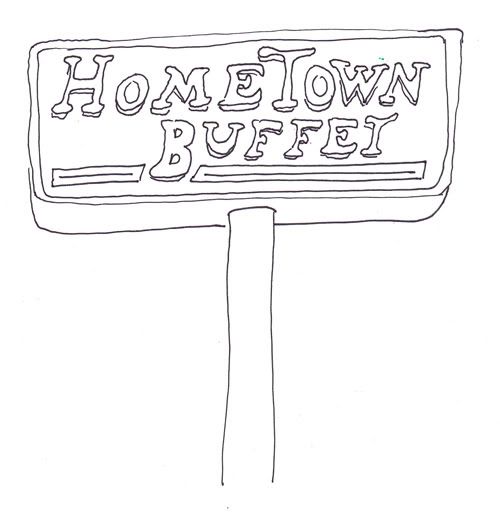
I am looking for a happiness that lies outside consumption. I consider stopping at A & W for a root beer float, but do not. I consider stopping at Tommy’s burgers for those chili cheese fries. But I do not stop at Tommy’s burgers.
Out of La Habra and into Whittier. Past a couple more massive shopping centers. Into Uptown Whittier. It’s older here. I could to to the Little Old Bookshop. But the Little Old Bookshop has moved and become the Large New Bookshop. I do not enter. I park on Greenleaf and wander, looking into store windows. Nothing looks good. Nothing feels right. I am looking for something I cannot find.
I feel like a fool sitting at a table alone in Mimo’s Café, writing. I miss the days where people would sit in cafes and write and draw and discuss politics and art. Like Paris in the 1920s. I was not around then. But I miss those days.
...
My parents suggested I buy a condo, that I “get in the market.” But that is not what I want. I like my old apartment downtown.
...
I’m at this breast cancer fundraiser tonight that my friend Nilo puts on every year at this super swanky club in Costa Mesa called Sutra. I feel totally uncomfortable, surrounded by very wealthy, fake-breasted, botoxed, bleach blonde manufactured people who inhabit South Orange County. I don’t mean to stereotype, but it seems as if all the Orange County stereotypes have gathered at this club.
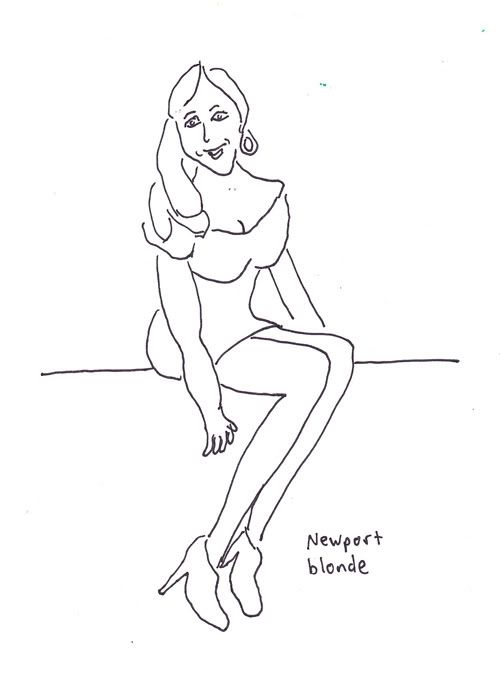
I stand with my friends, filling up on the free appetizers and nursing my $7 bottle of beer. I want to get the fuck out of there. Fuckin phonies.
But something happens that changes my mind.
My friend Chuck has put together a short film for the fundraiser, and my mom is in the film because she is a breast cancer survivor. Seeing my mom in that film is like seeing her with new eyes.
She exudes this strength and vulnerability and genuine emotion that cuts through the bullshit of that club like a knife. It is beautiful. There is nothing contrived about her, only a disarming truthfulness. And I feel proud to be here.
...
I lay in bed and feel like falling asleep, like disappearing. I lay on my uncomfortable, cheap mattress in my shared room, surrounded by ungraded papers, dirty clothes, scraps of papers, and I feel incapable of doing anything. I think this would make an interesting photograph or painting: “Depressed Young Man in Ridiculously Cluttered Room.”
...
The first day of summer. I lay in bed and watch a movie. Afterward, I have a headache, and I don’t feel like doing anything. I want to just lay around, but I know that will only make me more depressed, and besides I don’t want to waste my life.
In my room, my eyes catch the book Easy Day Hikes in Orange County. It was an impulse buy at Barnes & Noble a couple weeks ago. An hour later, I am standing in the Bolsa Chica Ecological Reserve, hiking through wetlands with seabirds flying overhead.
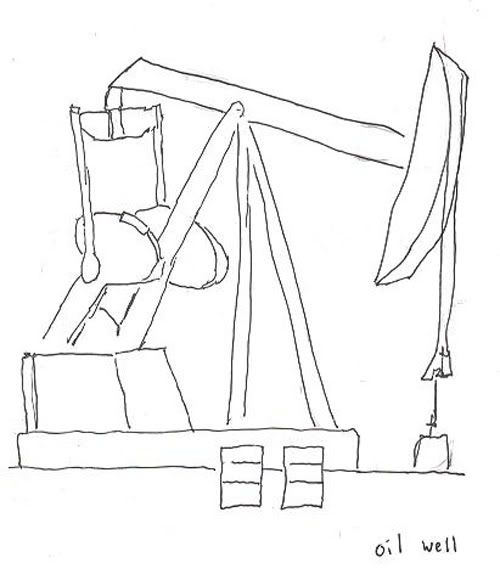
When I sit down to write, I notice that this area is surrounded by tract houses and oil wells. I bet the developers and oil companies were pissed when The Bolsa Chica Conservancy managed to preserve these 300 acres of prime coastal real estate.
I put in my earbuds, but quickly take them out because I realize—I would rather listen to the sounds of these birds.
...
I walk in and it smells of garbage. Instead of taking the trash out, my roommate has simply removed the old trash bag and leaned it against the stove, so now we have two bags of rotting garbage in our kitchen.
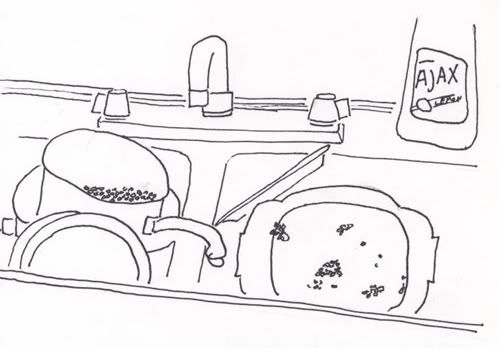
The kitchen floor is uncleanable. It used to be a yellowish linoleum but is now a blotchy brown. The refrigerator is a collage of random photos, clippings, magnets—family and friends and former roommates and places we’ve visited—Monterey, New York, San Diego. I have an extensive collection of American Express card magnets that they send me every month or so. I haven’t gotten any in a while. Maybe they realized I was just keeping the magnets and not opening an American Express account.
The living room is a mess of papers, books, loose change. There is a plate with the hardened residue of some food item. The floor is littered with little white pebbles that everyone tracks in from our rooftop patio. The dining room table has become a dumping ground for random stuff we’re too lazy to put away—computer speakers, old mail, a button maker.
We have no insulation and we are too cheap/poor to run the air conditioning or the heater, so in the winter it’s cold and in the summer it’s unbearably hot.
I have lived in this apartment above for four years.
...
I stand at my dad’s bookshelf, looking at his books, which are mostly Christian books.
I’m here on a Sunday night, house-sitting for my parents because my aunt Becky died three days ago, on Thanksgiving, of cancer. She was 56 years old.
It’s like 1:30 am and I’m not tired, so I’m looking for a book on my dad’s shelf. Certain books carry with them the weight of memories.
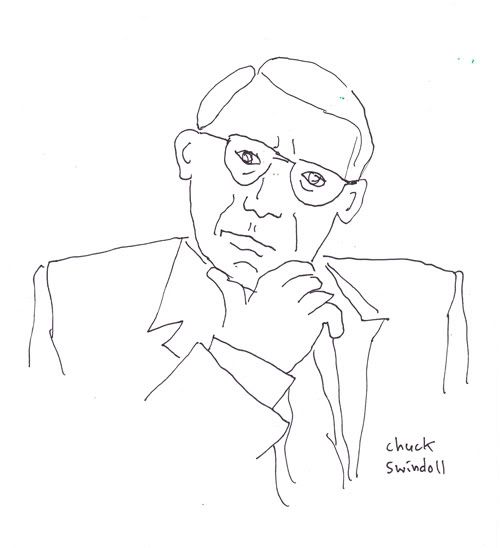
Near the top are books by Chuck Swindoll, the megachurch pastor whose radio ministry my dad took a job with in 1986, which is why we left Wisconsin. Chuck Swindoll is the reason I ended up in California.
There’s a book called The Prophecy of Isaiah that I remember my dad reading at the same time I took a college course on Isaiah and textual criticism, which caused me to question the Bible as a reliable source of truth.
There’s another book called The Myth of Certainty, written by an English professor at a Christian college, that my dad gave to me when I left school and came back home and was in a deep and dark depression and I had lost my faith.
I stand at my dad’s bookshelf looking at these books that, in a way, tell the story of my life and my dad’s life and I think about the person I used to be and the person I am now and the sorrows my family has known and I wonder what my dad thinks of me, really, in his heart, and I wonder if my dad knows what I think of him, and I think about how our lives have not turned out like we thought they would, but I guess that’s okay. I think about these things, alone at 1:30 am in a house in Brea, CA, and I cry a little.
I pick up a copy of St. Augustine’s Confessions, read a few lines which are translated from the Latin into a flowery King James-style English, and I wonder if the original language is as flowery as this translation. I doubt it. So I put it back and pick up a copy of The Story of Christianity, by Justo Gonzalez, which I’ve read before and actually liked. So that is the book I will read as I fall asleep.
In his introduction, Gonzales writes:
“If we are to break free from an undue weight of tradition, we must begin by understanding what that tradition is, how we came to be where we are, and how particular events in our past color our view of the present. It is then that we are free to choose which elements in the past—and in the present—we wish to reject, and which we will affirm.”
...
I feel depressed today. A certain lethargy which makes it difficult to do anything
but lay around.
And I certain sickness in my stomach that I associate with depression.
I drink beer and smoke cigarettes, thinking these things will make me feel better, but they make me feel worse. The beer tastes like battery acid. The smoke feels like poison going in my body.
I don’t know what to do so I grab a book (Either/Or by Kierkegaard) and my journal and walk to Starbucks and now I am drinking water and writing and I think I feel a little better.
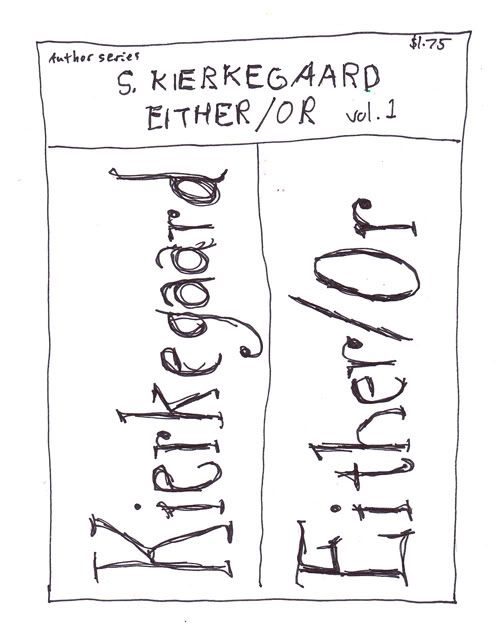
I rush about, trying to occupy myself, trying to be in different places than I normally go. I heard that is how you break habits. I wander through Guitar Center, Mervyn’s, Video Dollar. I take pictures with my dad’s 1984 Minolta film camera. I wander suburban neighborhoods. I ride a blue beach cruiser.
I eavesdrop on a conversation between a man and a woman outside Starbucks. For some reason, her question, “Are you mad at me?” infuriates me.
I feel a hollowness in my chest, a need that is palpable. I want to tell someone about this, but I don’t know who to tell. So I write it down, because I honestly don’t know what else to do.
...
Tonight I played music with some friends and then I walked home at 2:45 am, past some kids toilet-papering a house, and it was like I remembered a part of who I used to be, a good part.
It was not a memory of concrete events, but more like an emotional memory.
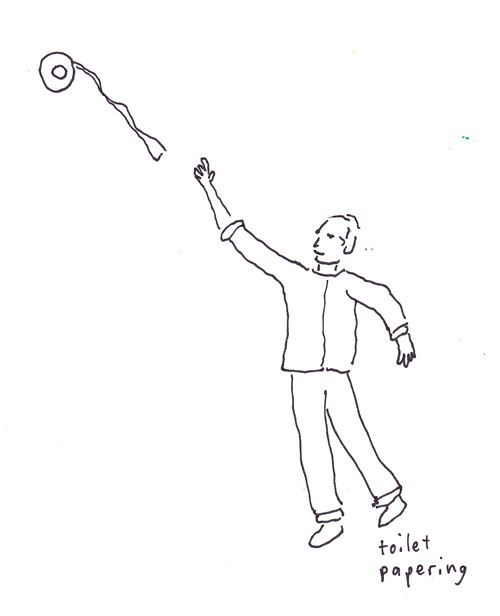
My dad and I have a deal. I will read a Christian book with him if he will read a book of my choice with me. So we are reading “Everything that Rises Must Converge” by Flannery O’Connor together.
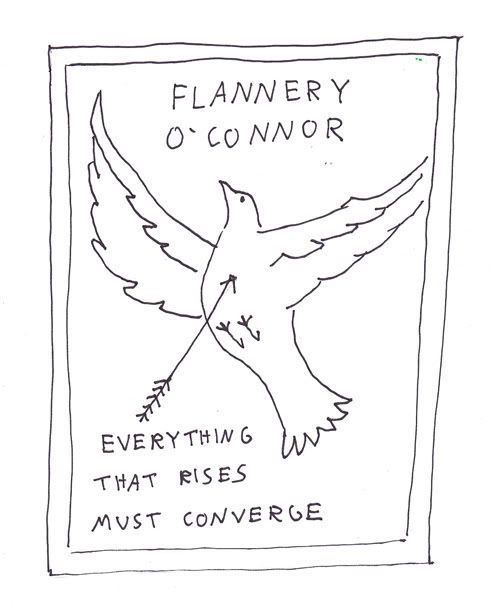
At some point, I tell my dad something I haven’t told him ever, “Dad, I need you to be okay with me not being a Christian right now.”
I drive home, listening to an interview with the writer T.C. Boyle on NPR. Boyle says that it was Flannery O’Connor who inspired him to start writing. He said, “She can make you laugh, and then she can make you squirm.” Amen.
...
I stop at Michaels to pick up some new brushes and there are all these women buying Christmas decorations—fake flowers and like wreaths and shit. No one seems to be buying actual art supplies. It makes me so goddamned depressed. I imagine blowing my brains out right here in Michaels so it covers the fake flowers with blood and brain matter.
...
It was probably a reactionary-type thing. Most of the decisions I make are, at core, a reaction to being hurt in some way. This applies to religious decisions too, if there is such a thing as religious decisions.
It was probably (though I hate to admit it) because of a girl. Girls tend to drive me either toward or away from church, depending on the situation. For example, I was once in a relationship with a girl when I was also suffering from a major clinical depression, and perhaps I put unrealistic expectations and hopes on the situation with this girl, like she could “save me” etc.
But what happened was this girl ended up falling for the music leader at church, and not exactly dumping me, but more like ignoring me (i.e. not returning calls), which is, of course, a crueler and more cowardly thing to do than actually dumping someone, in my opinion. So this girl left me for the music leader, and it was at that moment that I began to become hyper-aware of all the reasons why church is stupid and backward and hypocritical and retarded. Like, for example, how the aforementioned music leader seemed more like he was performing at a pop concert or musical, instead of leading churchgoers into some kind of “worship” or “praise” experience when he was “leading worship.”
And so shortly after being dumped/ignored/let down by aforementioned girl, I made a personal decision to never again set foot in that stupid fucking church again.
If you asked me why I stopped going to church, I would give you a laundry list of perfectly justified-seeming reasons: the conservative closed-minded ideology did not “gel” with my particular intellectual/artistic values, the Bible was a flawed and not too reliable basis for an entire worldview. I had studied textual criticism and often pointed out the fact that the so-called “messianic” prophecies in the Old Testament (a term I found offensive from a Jewish perspective) that Christians liked to point to as “proof” of the Bible’s divine authority actually referred to socio-political events from Israel’s history and therefore not to Jesus Christ. Plus there was the whole philosophical problem of knowing anything with certainty, especially non-physical spiritual things. It seemed to me that the appropriate response to the question “Is Christianity true in the capital-T True sense?” was a shrug of the shoulders.
These are some of the reasons I would give if you ever asked me why I stopped going to church. What I would not tell you was this: “My heart was broken.”
And so it was that seven years later, the night after a girl I may have loved (a different girl—the aforementioned girl from church was now married to aforementioned music leader and had a couple kids and lived in a house in Fullerton with a 30-year mortgage and a minivan) told me, “I don’t think we should date. I think we should just be friends” that I found myself waking up at 8am on a Sunday morning and walking to church--a time when I would normally be passed out after a night of moderate to heavy drinking, perhaps passed out semi-naked in the bed of a girl I did, or did not, really like. Another one of the reasons I did not go to church those days was because I’d been up very late the previous night drinking large amounts of alcohol and/or engaging in casual (as opposed to committed/serious) sex and was therefore so tired and hungover and demoralized that the possibility of waking up for church was not a possibility.
I was, in fact, a little hungover on that particular Sunday morning. The previous night I’d imbibed three cans of Budweiser beer and three vodka cocktails. But still, I awoke alone with a profound (albeit conflicted) desire to go to church.
What the girl had said to me was this: “I don’t think we should sleep together anymore.”
To which I replied, “Do you mean ‘sleep together’ as a euphemism for ‘have sex’ or that we should never literally sleep in the same bed?” The reason I required this clarification was because we had only slept together in the euphemistic sense one time (the previous night) whereas we had literally slept in the same bed together (a little cuddling, kissing, but no funny business) maybe five times.
To which she replied, “I don’t think we should literally sleep together,” and then added, “I think we should just be friends.”
To me this was a crippling blow, because I really did like (maybe love) her and since the night of our first and only “sleeping together” I had felt a slew of emotions ranging from guilt and sadness to excitement and anxiety, to other feelings I could not name—feelings I interpreted to mean, “I like this person in a more than casual/friendly way.” There was also fear, because I had neglected to use a condom and had instead used the “pull-out” method, which at the time seemed like an okay idea, but in retrospect seemed like a really fucking stupid idea. And I’d spent a whole afternoon on the internet, reading about the ineffectiveness of the “pull-out” method, the sperm count of pre-ejaculate, etc, and basically convincing myself that the girl was pregnant, an occurrence I felt totally ill-equipped to deal with—emotionally, psychologically, financially. Would I want her to get an abortion? Is abortion wrong? What about adoption? Was it as fun and quirky as that movie “Juno” depicted it to be?
It was in the midst of this silent, internal, anxious worrying that I’d had an epiphany of sorts, which eventually led me to church.
The epiphany was this. I came to actually accept the idea of this girl being pregnant and having the child and me caring for the child and loving him/her. Maybe I would marry the girl and my life would change completely. I would be less free, but I actually began to be okay with and embrace the idea of having a family and real familial-type responsibilities and commitments and all that, like I almost wanted this to happen.
And one other thing happened. That very same week, the writer David Foster Wallace (my favorite writer) committed suicide, which really affected me, so much so that I’d written a eulogy for the man and read it to my parents and cried as I read it.
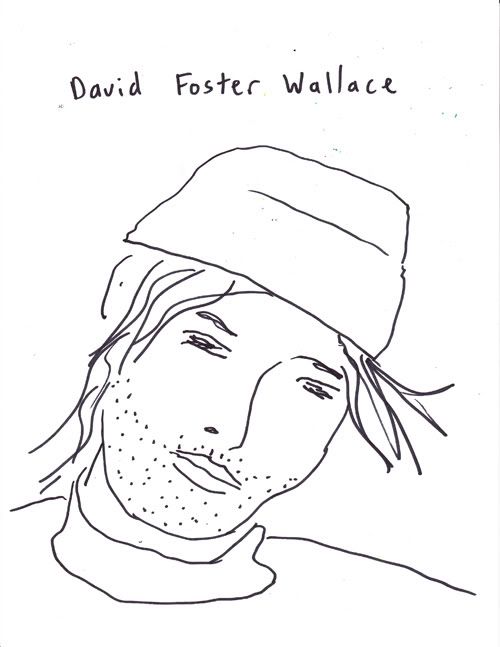
And but so all of these things: the (probably unfounded) pregnancy fears, the idea of family, the death of David Foster Wallace, all of these things created a matrix of thoughts in my mind that amounted to something of an existential crisis: Who am I? How do I relate to other people? Am I basically a selfish person? What does it mean to love someone? What is family? What is my purpose? These types of questions.
These questions, combined with the growing sense of emptiness I felt about living what was basically a self-centered, pleasure-seeking life, and the bankruptcy of such a life—all of this compelled me to wake up on this particular Sunday morning and walk to church, despite my long-held reservations.
I did not continue going to church for long. In a sentence: it was too cheesy for me. But I think all of this was the start of a new direction in my life, one it would take me a very long time to explain.
...
In Seattle, visiting my brother and his family. I walk downtown, feeling the weight of memory. These Seattle people with pale faces. The people of the rainy weather. This skinny, pale-faced kid on 3rd Avenue is playing a pretty depressing rendition of Pink Floyd’s “Wish You Were Here.”
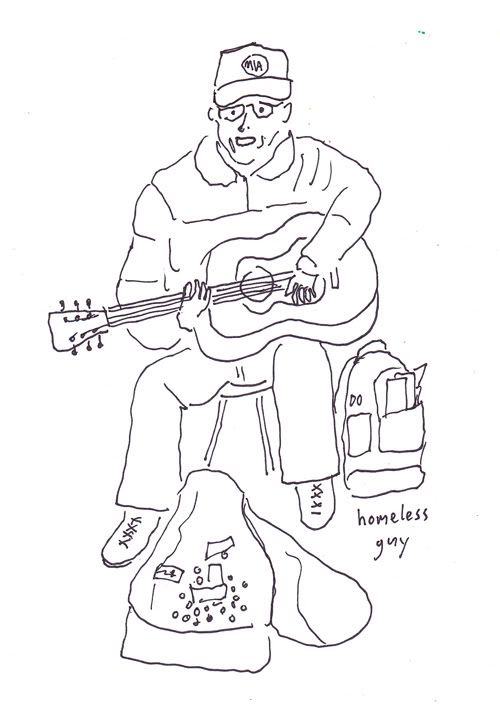
I sit on the ledge of the Fremont boat canal. The same ledge I sat ten years ago, when my life was falling apart. I am listening to hopeful music by Mason Jennings, smoking a cigarette. I have survived. I am here. I am okay.
Chapter 2:
Dear Beatrice,
In this life, half of paradise exists as an unrealized dream, and the other half consists of the struggle to bring it about.
Sincerely,
Jesse
“And I can recall our caravel:
a little wicker beetle shell
with four fine masts and lateen sails,
its bearings on Cair Paravel.”
--Joanna Newsom
Tony and I are walking past the retail space underneath our apartment. It used to be a photography studio that also sold scooters and was never open.
“We should do something with that space.”
“Like what?”
“I dunno. Maybe like an art studio.”
“I could do publishing.”
“Yeah. We could do anything really.”
“I wonder how much it costs.”
“I’ll call Dennis.”
I call Dennis, our landlord, who owns the space and our apartment.
“It costs $1500 a month.”
“That’s pretty steep. I don’t think we could afford that.”
“What if we got some other people involved. Maybe Landon, Chuck, Ben, RJ.”
“Let’s see.”
Over the next couple days, we talk to about ten different people. Landon is skeptical, RJ is pumped, Chuck and Ben are interested.
...
I’m eating pizza with my parents at their house in Brea.
“Tony and I had the idea to open an art studio underneath our apartment.”
My parents give me quizzical looks.
“Hmmm. That sounds interesting. Opening a business is hard.”
...
Over the next week or so, the idea of the gallery starts to materialize. We get enough people who are interested, so we can afford it. We go back and forth on the name. Someone suggests “Hibbleton,” which is the name of Tony’s bike club. I send a mass text. Hibbleton it is.
Meetings. Details. Getting a business license. Getting a DBA. Setting up an LLC. Getting insurance, a phone line, security. These are things I never thought I would be doing. Like standing in line at the County Clerk’s office in Santa Ana. I don’t have a business degree. I don’t know shit about this. But Landon does. Landon is a good resource. He is warming to the idea.
We have meetings, e-mails, phone calls. It occurs to me that we are like a powerhouse of abilities, like The Avengers, or the Thundercats. Landon knows business. I can write. Tony and Ben know art and design. Chuck knows film. RJ is a schmoozer and he knows the internet. We can do this.
I spend a few weeks visiting other art galleries in LA and Santa Ana. I meet gallery owners, ask them questions, talk about the gallery we are opening. Nothing like we are doing exists in Fullerton. It is May of 2008.
We are all here together. Landon painting the walls. RJ cleaning the floor. Chuck and Mark building a moveable wall. Tony sanding wood. Ben setting up the internet. I am recording this with my handycam.
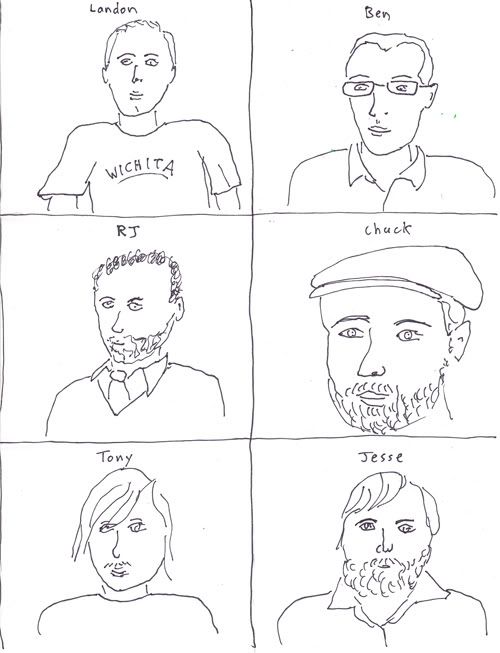
And then the day comes when the artists bring their work. The show is called “To the Fifth Dimension!” The art is of a style Ben calls “lowbrow.” It is comic book influenced, funny, strange. When I took painting classes, I learned about the masters. I don’t know anything about “lowbrow” or “pop surrealist” art. But I like it.
We spend the night hanging the show, and it looks amazing. It looks like an art gallery. Surrounded by bars and restaurants, we are a little cultural anomaly right in the middle of downtown.
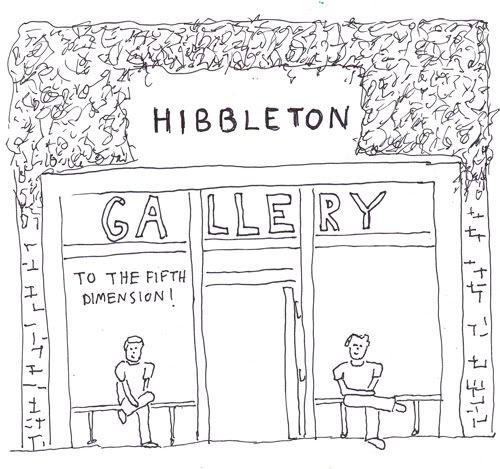
And then the opening reception. It is packed. It confirms what we expected. Artists and creative people live here—they just had no place to gather. Our little gallery reception brings them all out. And people actually buy stuff. They buy art. I have lots of little conversations with artists and people from the community, people I know from living down here a few years. My parents are here. They tell me they are impressed.
It feels like the beginning of something.
After the opening, we head next door to Mulberry where our friends Mark and Casey are spinning records. It is more packed in Mulberry St. on a Friday night than it ever is. Packed with young people—people in their 20s and 30s.
The music Mark and Casey are playing is unlike anything you might hear in the surrounding bars, who mostly play top 40 hits. They are playing soul, garage, and punk music. This too feels like the beginning of something.
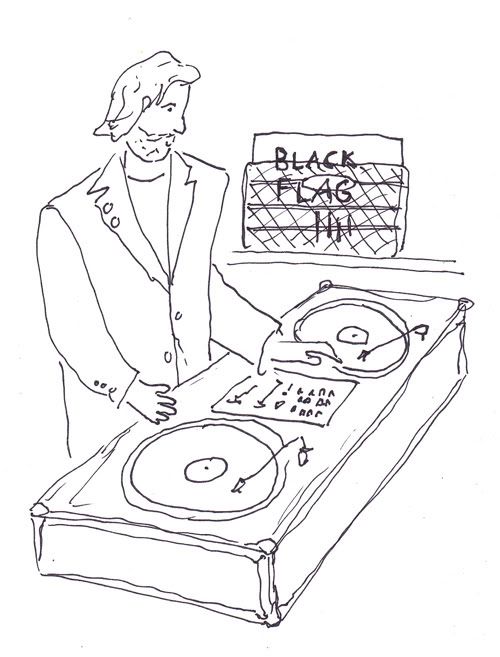
I wander from conversation to conversation in a haze of euphoria. We did this. If nothing lasts, we can say we did this.
...
Today they are having the annual Brewery Art Walk, where all the artists open their studios to the public.
I took the train by myself to LA and have been wandering around through these studios, meeting artists whose work I like, and telling them about Hibbleton.
I can’t believe something like this exists 30 minutes from where I live.
I meet an artist by the name of Venancio Tan, a retired chemical engineer from the Philippines, who does intricately detailed photo collages, mainly of professional tennis players from the 90s.
“When I was chemical engineer, this was my hobby,” he explains, “Now it’s all I do.”
He points to a photo collage of Andre Agasi.
“That took me 30 hours to do.”
“My work is exceptional,” he says, and it doesn’t feel arrogant..
“I agree.”
I meet an artist named Nancy Chavez. She has pink hair and tattoos on her arms and chest. She looks like a teenager. I like her drawings more than anything I’ve seen so far. I introduce myself and she seems very nervous and shy.
Now I sit at a table and write, watching the people drift in and out of the studios. Some look pretentious and say pretentious things. Some just look curious. If I had to guess, I would say there are about 500 people here.
...
Drove out to LA to see my friend Steve’s band at the Silverlake Lounge. This other (more popular) band plays before him. Apparently the singer toured with Beck or something. While the popular band is playing, the place is crowded with hipsters. Most people leave before Steve’s band goes on.
I stand there watching Steve play drums and thinking—I am watching one of the great artists of our time and I’m one of like eight people in the world who knows how brilliant he is. This thought saddens me at first, but then makes me feel sort of special, privileged.
I begin to wonder how many brilliant artists, artists whose insights would make the world a better place, have toiled in obscurity, unrecognized by the world.
This brightly lit sign that says “Salvation” hangs above the stage. It hovers above Steve like a halo as he pounds those drums. His eyes are closed. There could be two people in the room and it wouldn’t matter. He would still be pounding away.
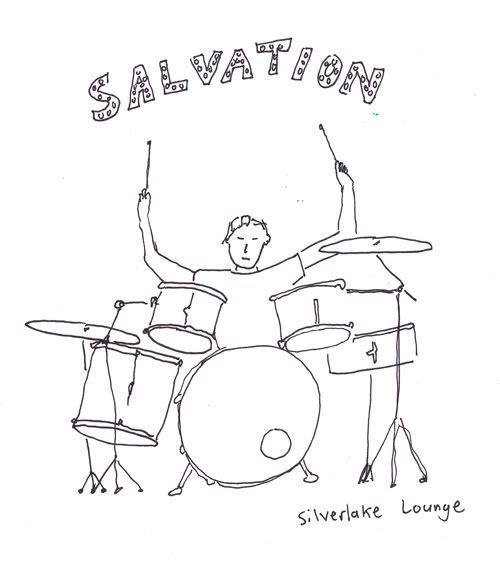
...
I have this idea for a literary/art magazine, put out through Hibbleton. It will feature artwork, interviews, poetry, stories, essays, comics—everyhing that we are all about. But how do I do this? I have never done anything like this before.
I meet with Steve Westbrook, a colleague at Cal State Fullerton who runs the Creative Writing Club and is advisor for the annual literary journal at Cal State—DASH. Steve helped start DASH.
We get coffee a few times. He shows me some journals. We talk about putting out calls for submissions of poetry and stories. We get a couple more people involved and form a mini editorial board.
I start interviewing artists.
We put out a call for submissions.
I give Tony the material and he lays it out.
I look for a printer we can afford.
We find one in Anaheim. It’s gonna cost about $400 for 100 copies. I can’t afford that, but I convince the other gallery owners that this is something we should do. We pool our money and pay for printing.
They day comes when I get to pick them up from the printer, and as I look over this thing I helped make, I am again overcome with euphoria. I helped do this.
...
A cordless microphone rests against my chest. I’m standing in a warehouse full of people watching my friend Ryan’s band playing. It’s the release party for Hibbleton Independent—our new magazine of art and writing that I envisioned and, with the help of friends, made.
I organized this party in this art studio/warehouse that very few people, prior to tonight, even knew about. And now it is full of people, listening to music, looking at art, new magazines, listening to poets read. This community I helped incarnate.
(As I write this, I’m sitting in Hibbleton Gallery, and two of my students walk in, with pens and notebooks in their hands, jotting down notes on the artwork, for the extra credit I assigned.)
I look around at the faces surrounding me—friends, family, artists, writers, musicians—everyone here together. We are not alone.
Earlier, I talked to Mike (who owns this warehouse) about taking over the abandoned juice factory across the street, and turning it into an artists colony with studios, a common garden, etc.
And now the music stops and everyone is clapping and I walk up to the stage and speak through the cordless microphone:
“Let’s hear it for The Waltz, everyone!” Everyone claps.
I remember, a year or two ago, when I was walking down Wilshire Ave. wearing a KPFK t-shirt with a microphone on it, and I noticed in the reflection of a store window it looked like I had a microphone over my heart. And, a few days later, I was in my kitchen making spaghetti and I looked out the window into our storage room and I could see both my reflection in the window and through the window and my reflection was superimposed over the micophone stand in the storage room so, again, it looked like I had a microphone over my heart.
And now I speak though the cordless microphone: “Thank you all for coming out tonight and supporting local art, writing, and music. I’m happy you all came. Good night.”
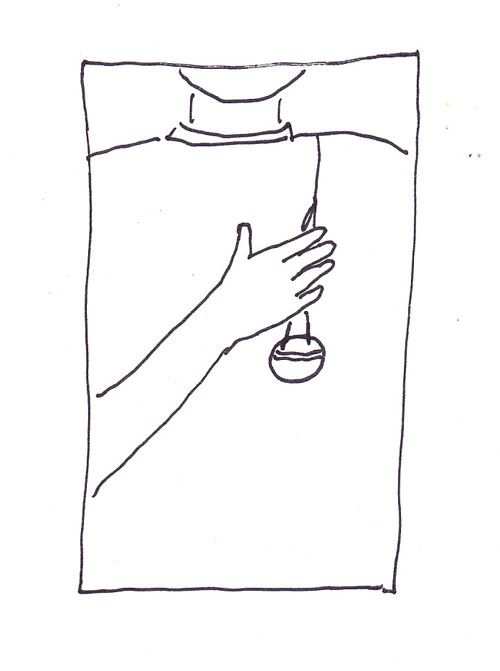
...
Tom Waits. Tom fucking Waits is at Hibbleton. He walks up in his little hat, with his haggard face. This art opening features artwork by his daughter, Kellisimone Waits. We didn’t think Tom would show up. But we hoped.
He walks up real nonchalantly, walks past me into the gallery.
“Hello,” I say.
“Hey,” he growls.
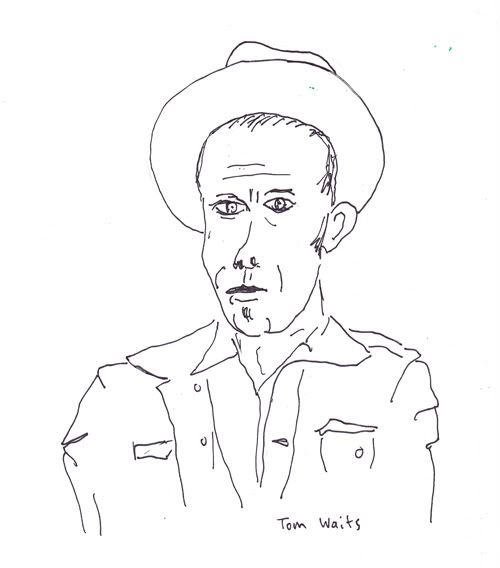
There are a handful of people I would pay money to meet in my life. Crispin Glover, the members of Belle and Sebastian, a few others, and Tom Waits. I didn’t have to go see him. He came here. To our little gallery on Wilshire in downtown Fullerton.
He looks around at the artwork. I watch the faces on the people in the gallery. A lot of double takes. Some people boldly go up to him, ask for his autograph, to take a photo with him. I kind of feel bad. He probably gets this all the time. Though I can’t say I blame them.
A little later, standing outside, I introduce myself and shake his hand. I shake hands with Tom Waits.
“How do you like Fullerton?” I ask.
“Oh, it’s a nice little town,” he growls.
I’m not sure what else to say. I’m a little star-struck, like the time I met Drew Barrymore. I walked up to her and said, “You’re Drew Barrymore.”
“Yep,” she said. And that was it.
A bit later, Bill Pullman shows up. Bill fucking Pullman. Independence Day, Lost Highway, Spaceballs.
I walk up to Bill, introduce myself.
“I loved you in the movie Zero Effect,” I say.
“Thanks a lot,” he says, “That’s not one people mention too often.”
“I had this friend in high school who had your entire Independence Day speech memorized.”
He laughs a little, and smiles his signature Bill Pullman smile. He’s a cool guy.
I want to ask him what it was like to work with David Lynch, but I don’t.
I watch as the gallery gets more crowded. People are sending out facebook messages, tweets, texts...Tom Waits is at Hibbleton!
...
I have this idea for a Downtown Fullerton Art Walk. It occurs to me that we cannot survive as a gallery if we don’t get more people involved. We have to literally change the culture of downtown. How can we do this? One day, I walk around downtown with a clipboard and a pen, talking to local business owners, asking if they would like to put art on their walls once a month and be a part of this.
After a week or so, I get about 20 interested venues—coffee shops, salons, vintage stores, galleries, the Fullerton Museum.
Meetings and more meetings. It will kick off the first Friday of next month. We make posters, a web site, a facebook page. And then the day comes.
It is a huge success. Thousands of people are walking around downtown Fullerton on a Friday night for the purpose of art, not to get drunk. There are families with children walking around.
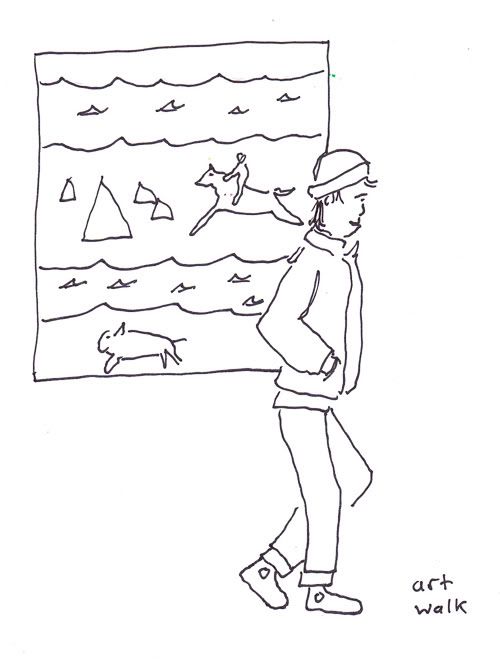
I wander around thinking “I did this.” I think, “Maybe this is the meaning/purpose of my life.” If I died tomorrow, I would be happy knowing that I helped contribute this to the world.
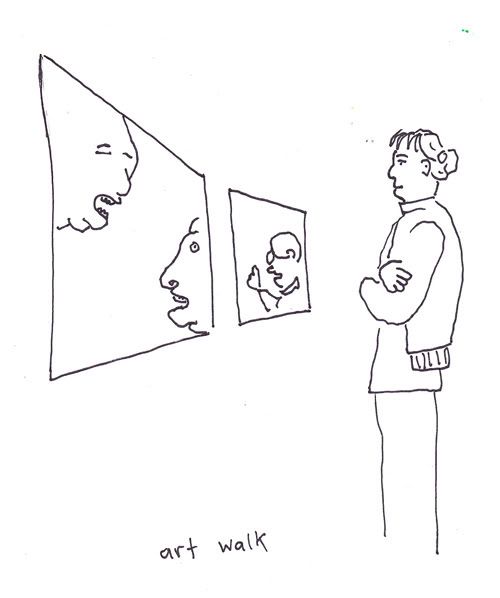
Chapter 3
“Show the man it’s not about the money.”
--The Arcade Fire
Dear Beatrice,
I still imagine this book ending with a reunion with you, but this time it’s different:
You are the young girl in my English 100 class who writes an essay about how worthless she feels and who, though writing, I am able to convince is actually very smart and worthy.
You are the young man, so cynical and despairing at the emptiness and fucked-up values of Orange County, who wanders into our art gallery on an open mic night and reads a poem that expresses exactly how he feels, a poem people listen to with rapt attention.
You are the faces I saw as I traveled across American by train.
You are the silly drawings I make.
You are the words I write every day in this Mead composition book.
Sincerely,
Jesse
Hibbleton is in the hole. We are unable to pay our artists or make rent. I’m in a position where I can put in extra money, but I don’t know how long that will last. We have to make money somehow. It is scary. I don’t want to go out of business. I believe too strongly in this. God help us. We need help.
I feel this burden/passion. Like, how the fuck am I teaching six classes, organizing two art shows, weekly film nights, open mic nights, a possible film festival, author readings, editing an art magazine, writing press releases, organizing gallery meetings, all at once?
I feel this burden/passion to devote most of my “free” time to do these things. One thing I have learned is the value of giving real time and effort to something that will bring me no instant financial success. To get outside the selfishness/childishness that demands immediate gratification/reward. To instead work toward larger, more distant, but more worthwhile goals—fostering a community of artists and writers in Fullerton, giving a home to these things. To maybe have a real and lasting impact on my community. To be a force for good. I feel I have a clearer sense of what I’m supposed to do with my life.
...
"Hey Tony, I had the absolute shittiest thing happen today."
"Your truck got towed. Kevin told me."
"Yeah, my truck got towed because I had five unpaid parking tickets. They impounded my truck."
"That sucks."
"So not only did I have to pay the $350 worth of parking tickets (which is like double what they originally were), but I also had to pay the city $170 to "release" the truck and I had to pay the tow yard $125 for towing and storage. $700 dollars later, I got my truck back, a truck I hardly ever drive in the first place because who can afford gas these days?"
"Word."
"I asked the girl at the police station what the $170 was for."
'Administrative costs,' she said, 'Like typing up the report.'
'That's some expensive typing,' I said, 'Does that $170 include a ride to the tow yard?'
She gave me a look that communicated, 'Gimme a break.'
'They didn't impound the books I had in the truck, did they? That copy of Midnight's Children is signed by Salman Rushdie. Are you familiar with Rushdie's work?'
etc.
"And all of this couldn't have happened at a worse time. All my rents are due and now I'm not even sure if I can afford them."
"Dammit."
"I'm sick of being poor, Tony. I want to be rich."
"We will never be rich. Our brains don't work that way."
"My brain can't compute capitalism. The thing is, I feel like I contribute to society. I'm an English teacher, I run a basically non-profit art gallery, I help organize a monthly community art walk, I own a book store, etc. I just don't contribute in ways that society deems worthy of reward. If I was some kind of banker or real estate mogul or politician, I could be rollin' in the dough, especially if I had no conscience or moral compass or imagination. Then I could really be ballin'."
"Maybe we should become bank robbers. We could knock down a Wells Fargo."
"Didn't they get bought out in the whole economic crash?"
"No, that was Washington Mutual. They got bought out by Chase."
"Oh yeah...like a year ago all those Chases popped up everywhere."
"Like CVS. Those drug stores sprouted up like flowers a few years back."
"Normally, you would think a business grows slowly, but in the business of banks and drug stores...those shits explode."
"I wonder why."
"I imagine it has something to do with the billions of dollars the government gave them in 'bailout' money. Sometimes I think it's the corporate executives who are the real robbers and criminals. They have learned how to steal money from people and make it legal. I imagine them sitting around in some board room, discussing price fixing and lobbying and other shady corporate shenanigans, and some junior partner asks, 'But is that legal?' And the CEO cackles and says, "I will make it legal. Once more the Sith will rule the galaxy!"
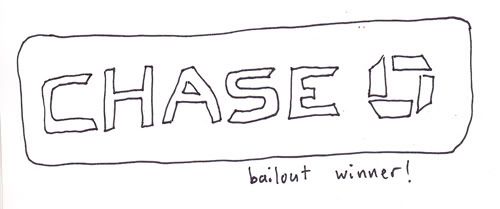
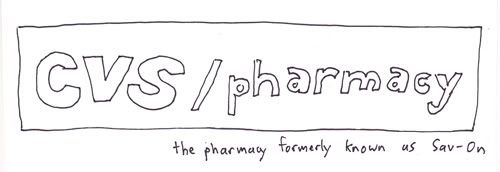
Tony told me this story tonight. And older woman came into the gallery. She kept talking to Tony about Jesus. She took his hand and prayed that the gallery would be blessed with great fortune.
Then she went and looked at some books. She picked up a book that was priced at $5 and she said, “Can I get this for fifty cents?”
I am certain she was totally unaware of the irony of her actions.
...
I went to a book release party tonight for a book that probably not very many people will read because it is a book of poetry put out by a small independent publisher and who really reads poetry these days?
But the party was nice—it was at the Long Beach Aquarium and it was pretty crowded and I’m convinced that this book of poetry is very good and it gets me thinking about how if everyone in America read a book of poetry tonight instead of watching television—how much better that would be. Maybe it would even solve our current economic crisis somehow, because maybe it would make people care less about getting rich and more about being human beings. And then those people with money would help the people without it. And people would buy things like art and poetry books from small independent publishers, and the poets and artists of America could make a living too, instead of scraping by on scraps.
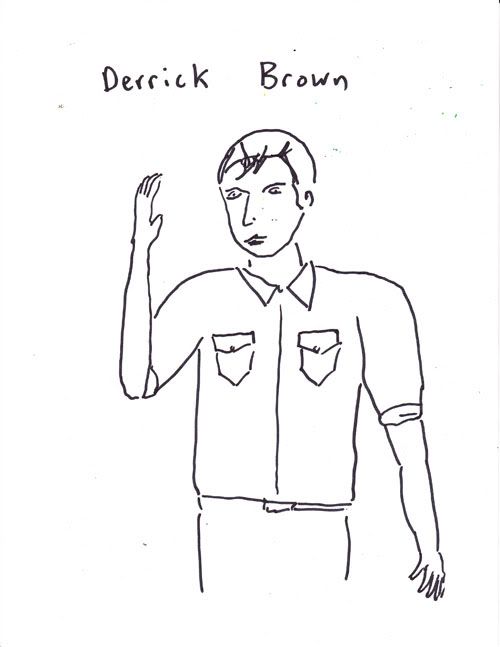
I’m struck by this fact—that the people who make art and write poems and make music and organize cultural and community events often don’t get paid for it. Often in actually costs them great effort and time and money. But they do it anyway because they believe in it. They believe in making the world a more interesting and beautiful and compassionate place.
I want to be one of these people. To go against the tide of greed and selfishness and give and give of myself for others, for my community. This is good.
...
If money is not your primary motivation, you get to do some pretty fucking awesome things. Landon and I are driving to Los Angeles to interview Mark Mothersbaugh for Hibbleton Independent.
“Dude, Mark Mothersbaugh!”
“Mark fucking Mothersbaugh!”
“DEVO, The Life Aquatic, Pee Wee’s Playhouse!”
“No big deal.”
We arrive at his studio, a large green circular building on Sunset.
We meet Mark and shake hands. We shake hands with Mark Mothersbaugh.
Before the interview, he gives us a tour of his studio.
“This is one of the original ‘Energy Dome’ hats.”
“Here are some paintings I did.”
“This is where I record music.”
“Here are some of my synthesizers.”
We sit down in one of his recording rooms and do the interview. He talks about the Kent State Massacre, about DEVO, about Pee Wee’s Playhouse, about working with Wes Anderson, about his artwork.
After the interview, I say, “You know I really love the music you did for The Life Aquatic.”
He walks over to one of his synthesizers and starts playing the music for me. A private concert by Mark Mothersbaugh. No big deal.
If money is not your primary motivation, you get to do some pretty fucking awesome things.
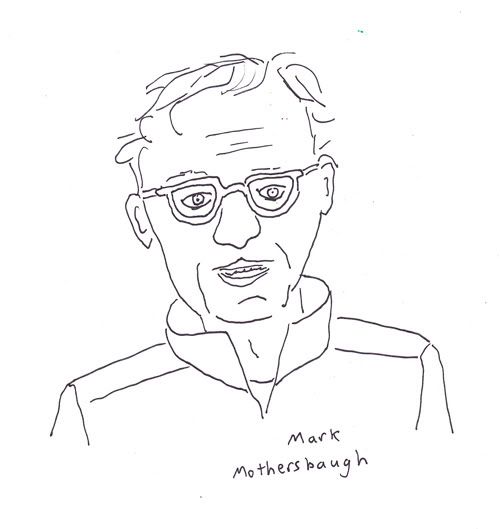
...
I’m at the Unemployment office in Anaheim, at a mandatory interview with a man named Raul. He has a tiny rug tacked to the inside of his cubicle that has a stitching of a llama and reads “Peru.” I scan the photographs on his desk: one of him in Army gear, holding a big rifle, one of his dancing with a woman who I think might be his mother. Raul has a pleasant demeanor. He shows me some web sites where I can look for jobs. I get talking to him about teaching and he says, “I can tell you love it. I can feel it.” He tells me he wants to be a social worker, that this job is only temporary. I shake Raul’s hand and we both say goodbye and good luck. I feel I have made a friend, one who I will probably never see again.
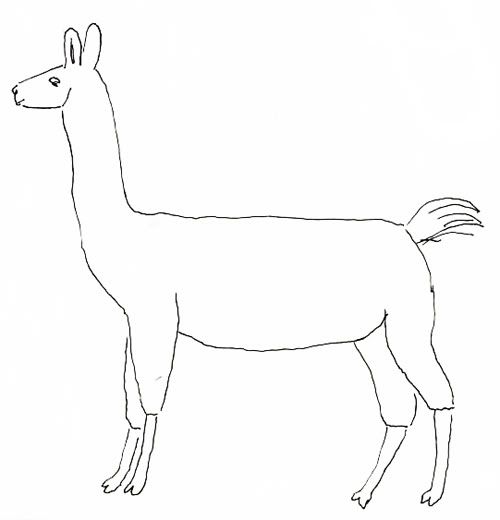
It's Easter Sunday, approaching midnight. I'm in The Continental Room, sipping a vodka coke. Troy is inside on the turntables, playing a Misfits song. I'm sitting next to my friend Reuben.
"Happy Easter, I say.
"I'm Jewish," Reuben says, "We don't celebrate Easter."
"Happy Passover," I say.
"I heard a joke the other day. You know how Jews don't eat bread that rises? Well, we don't like anything that rises."
"Haha. Like Jesus."
"Yeah, it's a resurrection joke."
"But Jesus was a Jew."
"True."
"You know," I say, "I'm something between an agnostic and a Christian."
"I'm something between an agnostic and a Jew," he says.
"The thing that really bothers me about Christianity is that it is such a colonizing religion. The conquistadors, the crusades, the missions, the inquisition. All that oppression and injustice, done by Christians. It's embarrassing," I say.
Reuben sips his drink and says, "Yeah, us Jews are not proselytizers. We have just kept to ourselves and gotten fucked in the ass for a few thousand years."
I sip my drink and say, "Yep."
"Someone who tells you to believe something or die...I can't understand that," he says.
"Nor can I, my friend," I say as I hold my fingers to his head like a gun, "Now say the Lord's Prayer! SAY IT, motherfucker!"
"You're gonna have to kill me," he says.
"Alright, have fun in HELL with the other non-believers. BANG!" I say, pulling the pretend trigger.
"Hell...now that's a concept I can't get behind," Reuben says, as Troy puts on a new record, "According to Christians, all someone has to do to get into heaven is to accept Jesus into their heart as their personal Lord and savior. So, someone like Jeffrey Dahmer, who fucking ATE people, could theoretically go to heaven if, on his deathbed, he accepted Jesus into his heart. But someone like Gandhi, who actually did a lot of good in the world, goes to hell because he believes different things. I dunno...that whole schema sort of undermines the idea of personal responsibility."
"I know. I sometimes think the Christian concept of hell is morally absurd," I say.
"It is. It's fucking absurd," he says.
"I went to a Christian university for my first two years of college," I say, "By my second year, I was having this full-blown crisis of faith, where I was questioning everything. I remember talking to one of my professors in his office, telling him about my doubts. I told him I was having trouble believing in hell. And do you know what he said?"
"What?"
"He said, 'I stopped believing in hell ten years ago.' A professor at a Christian university! I'll never forget that."
"That's awesome. So, if hell is out, what about heaven? Because it seems like a lot of believers think, 'Okay, I've accepted Jesus into my heart. I believe the right things. So it doesn't really matter, ultimately, what I do now, in this life," Reuben says.
"Totally. Especially in Orange County. Whenever I see some conservative Republican Christian, living in some nice well-furnished home, driving an expensive car, working some corporate job, pulling down six figures a year, I think...You are living NOTHING like Jesus lived. He was poor. He railed against the rich and the conservatives of his day. He said, 'It's easier for a camel to go through the eye of a needle than for a rich man to enter the kingdom of heaven.' In other words...impossible. But then he said, 'What is impossible with man is possible with God.' So I guess there is hope for rich people too, if they sell their stuff and give it to the poor. If anything, you'd think Christians would be liberal, not conservative."
"That's a weird metaphor," Reuben says, "A camel through the eye of a needle."
"I think about heaven a lot, "I say, "What is it?"
We sip our cocktails in silence for a while, and Troy plays a new song.
I say, "Jesus said, 'The Kingdom of heaven is within, and the kingdom of heaven is at hand.' Meaning, I think, heaven is possible here, now, in this life. Maybe it has to do with love, and how we relate to one another, and what we contribute to the world and to other people, and community. For me, the first night of the Downtown Fullerton Art Walk, I remember thinking, 'For me, this is heaven.'"
"I've thought about that too," Reuben says, "Sometimes I'll get bummed out because I feel like I haven't yet contributed what I want to contribute to this world. Maybe, when we're old, we'll look back and understand...that time when I was in the band, when I was poor and struggling...that was my heaven."
I look at my cell phone. It's almost 1am.
"Hey man, I gotta go," I say, "I have early class tomorrow.
"It was good talking to you. Happy Easter," Reuben says.
"Happy Passover," I say.
We shake hands and I pay my tab and give Troy a high-five and walk out onto quiet streets thinking, 'Was that heaven?' That conversation, a skeptical Christian and a skeptical Jew, drinking in a bar on Easter Sunday, feeling more alike than different, to a soundtrack of punk music.
...
It's funny that right now, when I am as poor as I've been in a while, when I should be like freaking out about money and bills and stuff, I am as happy as I've been in quite a while.
7am: Wake up
8am: Teach English 99 class
9am: Eat breakfast at Del Taco ($2 Breakfiesta)
9:30: Drive to Goodwill to get frames for drawings for art show on Sat.
11am: Teach another English 99 class
12: Office hours—meet with students, reply to e-mails, blog, create facebook event for City Council campaign
2:30pm: Teach another English 99 class
4pm: Frame drawings, drive them to gallery in Costa Mesa
7pm: Art Walk meeting
9pm: Dinner. Tombstone. Watch an episide of “The Ricky Gervais Show”
10pm: Grade papers
12: Sleep.
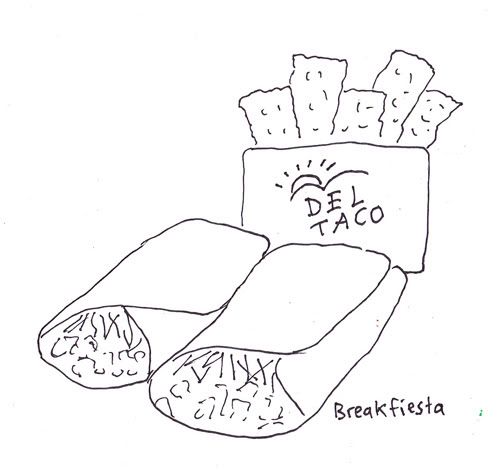
Repeat.
Chapter 4:
“Why settle for some know-it-alls despair when the dead may dance to the fiddle hereafter, for all anybody knows?”
--Wendell Berry, “Testament”
Dear Beatrice,
I have a tattoo of Dostoyevsky on my left arm. When I show people, they sometimes ask, “Why?” I tell them, “Because he is my favorite writer.”
If they ask me, “Why is he your favorite writer?” I tell them, “Because he understood that beauty is not possible without pain. Because I read The Brothers Karamazov when I was at the lowest point in my life and it taught me that suffering can have meaning, that suffering need not be the end, that it can also be the beginning of something astonishing.”
Last night Landon asked me to describe what depersonalization feels like. And still, after all these years, I could not describe it. Strange. This is the wound I still carry, and may carry for the rest of my life. This is the wound that has driven me to become what I am—for better and for worse.
Sincerely,
Jesse
It’s easy to confuse depression and fatigue. Tonight I was laying on my couch, after watching a mediocre legal thriller on Netflix, and I wanted to do nothing, and that made me kind of depressed.
So I made myself get up and walk to Ralphs and buy groceries to make dinner. As I’m walking, I listen to Daniel Johnston on my ipod, and it’s inspiring. When I get home, I feel compelled to write. Sometimes all it takes is a walk and some good music to get me out of a funk.
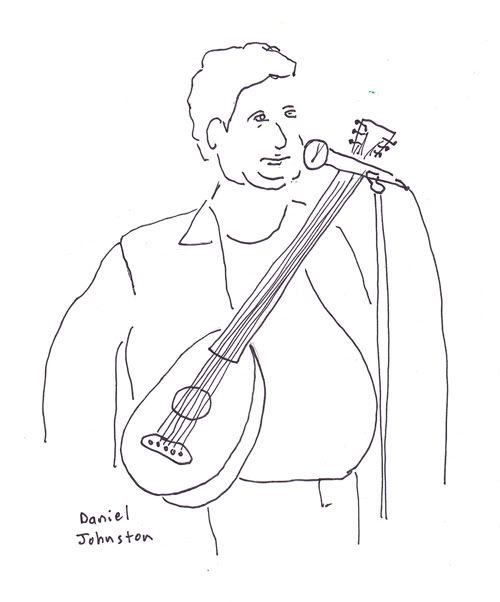
I am tired. Do most people think about these things? I sometimes wonder how my day-to-day suffering compares to the average person. I heard today that one in six people has some kind of mental illness.
I suppose that’s another thing I want this book to accomplish—to help erase the stigma, the fear of mental illness. To bring my experience to light with the hope that it might help people talk about the pain they hide. To bring it into the light, and have a conversation about it. I think that might make people less lonely.
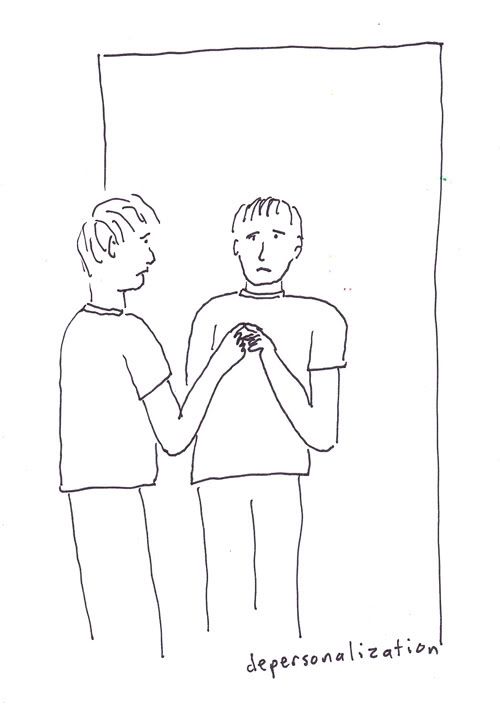
Depersonalization. Walking along Harbor Blvd, I look at my reflection in passing building windows.
Depersonalization. Standing in my doorway, looking out at overcast, rainy skies. A lone seagull beats against the falling rain.
Depersonalization. I take these medications, I go to therapy just to be functional. I have passions and I follow them, but sometimes it is like a striving in the dark, like a fight to be here fully. But I don’t need to be happy all the time. I just need to mean something.
Depersonalization. I tell myself that I want to feel these things, but some of them are so potentially painful that I don’t know if I can bear them. If I felt the full weight of unbelief, of loneliness, of fear, of general bewilderment at life. What is hard is surrendering control, letting the feelings pass over and through me like waves, knowing I will survive.
Depersonalization. Two years ago, age 29, when it was so bad I wanted to die, and I broke down and sobbed and wailed like a baby in my parents’ arms.
Depersonalziation. We think that, as adults, we are so composed, so mature. However, beneath the surface, there are all these leftover childhood fears, insecurities, selfishness, anger, loneliness. It gets buried, but comes out in our dreams, our actions, our relationships, our mistakes.
Depersonalization. I feel a compulsion to write. I feel writing will help alleviate my suffering. I understand something about myself—writing is my bridge to reality. Sometimes when I write something, I feel a compulsion to read it over and over again, as if to prove to myself that I am here, that I exist.
...
“Lisa, am I incapable of feeling?”
“What do you think?”
“I mean, I feel things. I feel frustation, loneliness, joy sometimes. But I guess my question is this—if all this pain and detachment and anxiety and depression is a defense mechanism against really feeling, how will I ever really feel?”
“You will feel how you will feel. There are no templates. There’s no right way to feel. You will feel as you learn to feel. I think you learned to hold things inside for so long that feeling is scary for you.”
“Growing up, I did not know how to feel, or to let it out.”
“Let me give you a scene. You are at church.”
“I don’t like church.”
“But this is different. This is not a big mega-church. This is a little catholic church in Mexico.”
“Why Mexico?”
“Just go with it.”
“There is a little old lady in the church and she is praying for you.”
“I hate it when people pray for me.”
“But this is different.”
“She is not praying that you will feel better. She is just praying that you will feel. She is there with you, holding your head. Her prayer is very short. You don’t even understand the words. The real prayer is her presence. She is there with you, in your feelings. And then they come.”
“I don’t want them to come. I am afraid. I am afraid I will lose control. I am afraid I will go crazy or die.”
“But this old woman stays with you. She gives you permission to feel and she gives you a promise—you will not die. You begin to feel.”
In Lisa’s office, I begin to cry.
“No. No. I don’t want this.”
“It’s okay. I am here.”
“Oh Jesus. Oh God.”
And then I really come apart, wailing, weeping.
“Oh Jesus. Oh fuck. This fucking hurts.”
Lisa puts her hand on my shoulder.
“I am here. I am here.”
...
When we first meet, it will be wonderful. We will have so much to talk about, like ideas for special dates we can go on and it will be fun.
The first time we attempt sex, I will have erectile dysfunction and I will blame it on the alcohol and the Paxil.
But the second time it will be great.
We will hang out all the time and be a real couple and we won’t feel lonely.
But then you will get a little “clingy” and, being an essentially introverted person, I will feel uncomfortable. When you grab my arm in public all the time, I will secretly think, “I don’t want to be your crutch.”
And after a while, our phone conversations will be replaced by texts, and you will text me way more than I will text you, and you will want to hang out every day, and I will actually start to kind of resent you, and I will feel guilty about this.
I will send texts to other girls sometimes.
I will tell you I need space.
It will take me a while to work up the nerve to actually break up with you, and I will get anxiety and stomach pains and I will be afraid you will try to kill yourself or something.
And after we break up, I will go on a two-week bender and get drunk and chain smoke and have sex with two other women who I’m not really even interested in and I will feel guilty about this too.
One night I will see you at a bar and get drunk and end up having sex with you on my couch and I will feel like a piece of shit in the morning. And we won’t talk for a while and my bender will continue until I think I have an ulcer that will turn out not to be an ulcer.
And every night, I will send increasingly desperate drunk texts to every girl I’ve ever liked, and some I didn’t, whose number I still haven’t deleted. I will text lines of sad poetry, and sometimes they will respond in the morning with responses like “What the hell?” or, more commonly, “WTF?”
I will not cut my hair or beard for a long time.
I will consider visiting a girl in Arizona, but I will not.
And eventually my life will settle back into it’s normal routine of writing and teaching and loneliness and an ever-deepening cynicism about love.
...
In a dream, I had a wrestling match with my id.
This guy walked in my room, kicked in my mirror, and started wrestling me. I was trying to explain to him about how, in society, people agree to follow certain social contracts, where they don’t do things, like kick in peoples’ mirrors.
I tried to reason with my id, but I got the clear impression that he didn’t give two shits about reason or social contracts. He wanted to do what he wanted to do. That was all.
I grabbed his pinky and began to bend it back, like I was gonna break it. But then I stopped, and tried to explain how, by not breaking his finger, I was following a social contract, to not randomly hurt people. He seemed disinterested.
It was really frightening to meet someone who has zero sense of morality. But, according to Freud, that person lives inside us all.
...
“When you look at the sky, what do you see?”
“Blue. Clouds.”
“I see blue, but I see it as millions, billions of tiny points of light. If I look at anything in a sort of unfocused way, that’s what I see. Even the night sky.”
“That’s kind of weird.”
“It’s called photosensitivity. For some reason, I can’t stand fluorescent lights. They give me anxiety.”
“Hmmm.”
“So like when I look at things and see these tiny points of light, I’m consciously aware that what I’m ‘seeing’ is really just my brain’s interpretation of things. Cones and rods and shit.”
“Are you sure you’re okay?”
...
Tonight I sat alone on my rooftop and cried to myself and said aloud:
“I want to feel normal.
I want to stop hurting.”
...
I’m sitting at Maclain’s next to a group of five men and one woman who seem to be friends from either AA or NA or both. That’s what I gather from bits of their conversation.
This guy with a shaved head and goatee tells a story about “The best seven days of his life,” which he spent on a beach in Costa Rica with these women whose sole function seemed to be to bring him beer, carry his surfboard, and have sex with him.
“Girls were like that in ‘Nam,” another guy adds, “Submissive.”
The first guy tells a story about how he saw and took a picture of a demon in the jungles of Panama.
“You wanna see a picture of a demon?” he says.
A bit later, I overhear the woman say, “So that’s when I found out I was pregnant. I was drinking tequila at the bar and kept throwing up and didn’t know why. Turned out I was pregnant.”
...
When I come to class, I am tired and my voice is scratchy. I think of cancelling class, but I stick with it. I start teaching and, as the class goes on, I feel my energy increasing and my voice getting clearer. Sometimes you have to just do something even if you feel powerless to try. The strength comes in the doing.
...
Dear Astrazeneca,
I take your medicine Seroquel so that I won't slip into suicidal depression. I was wondering why it costs me $280 every month. Because I have pre-existing conditions, I am unable to get health insurance, and so I must pay this exorbitant price every month out of my own small paycheck. I just feel like I'm getting ripped off. $280 for 30 pills seems a bit steep. I am aware of your "research and development" costs, but still. Come on, guys.
Sincerely,
Jesse La Tour
English Instructor
Fullerton College
My car is a mess of papers, water bottles, fast food wrappers, books. My room is strewn with ungraded papers. My kitchen is full of dirty dishes. My storage room is a mess of photographs, canvases, paints, and artworks in progress. Weary yet inspired, I move forward.
...
I’ve just finished showing my English 101 class the film “Dancer in the Dark” and we get talking about tragedy and I say,
“Yes, it’s tragic. But the Greeks had this idea called a catharsis, which suggests that a watching a tragedy can cause you to reflect on your own life, on your relationships, and release the negative emotions you feel, and so a tragedy can actually be good for you.”
I look out on a sea of blankish stares.
“That’s what the Greeks thought, anyway.”
...
At the Continental tonight, I feel out of place. Don’t feel like drinking, smoking or meeting girls.
Instead, standing alone outside, I meet a young man in the Army, about to be deployed to Afghanistan. I can see the fear and bewilderment in his eyes. He says joining the army was the worst decision he ever made. He says he joined because he had a drug problem and wanted to do something productive. But what he has seen and what he has done makes him want to do more drugs. I think of my cousin Steve, who came home from the Gulf War and got addicted to meth and now lives with his grandmother.
I feel like crying.
I put my hand on the young man’s arm. I want to pray for him, but I don’t know if he believes in God, so instead I say, “I’m sorry. I feel for you, man. It’s gonna be alright.”
If I wasn’t so damned depressed, I would stay and drink with the guy, just so he’d feel better, less alone, more normal. But I have to get out of this place.
On my way out, I pass Laura dancing with some weird dude who looks like he’s in Marilyn Manson—the same guy I once saw her kissing, the first night she invited me to hang out and she got drunk and made out with this same dude and I told myself, “This girl is not for me.”
...
An evening alone. English 100 essays, facebook, Stouffers lasagna, cigarettes, porn, George W. Bush’s facebook page, e-mail, old Nintendo games, loneliness, ignored texts. Tomorrow will be better.
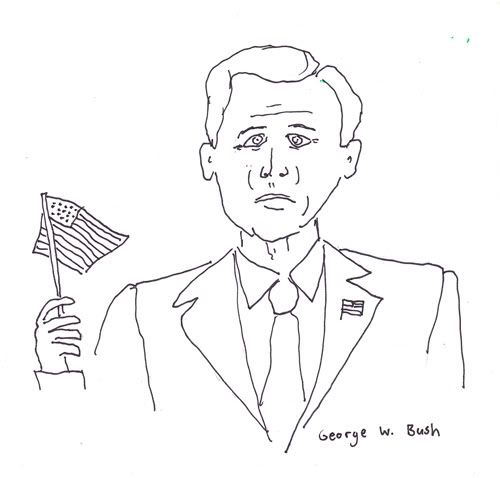
I am riding in the back seat of my grandpa’s old Buick, sitting next to my grandma Sally. My brother sits in the front seat, filming my grandpa as he talks about this place. Reedsburg, Wisconsin. The place he grew up. The place he will be buried. My grandpa has acute leukemia and has less than a year to live.
He is leading a caravan of cars through this green, hilly countryside. It’s a little pilgrimage he leads once a year. Much of the Midwest is flat farmland, but this land rolls on for miles, hills and valleys and streams, little farmhouses dotting the landscape. It reminds me of Ireland.
We stop on a little dirt road and get out. Down a winding gravel driveway sits an old wooden house. This is where he lived. Down the road a bit, a man is driving a tractor. He pulls up to the house and grandpa greets him warmly. It is his nephew.
We take pictures outside the little house and grandpa tells stories about how, during the Depression, his mom and dad used to make moonshine and sell it at local dances. He talks about walking miles to get milk from a local farmer. There is a solemnity and a nostalgia to his words, as if he is looking into the past, to a time before agro-business and development pushed the small farmers off the land.
We continue to another little wooden building that looks abandoned. The wood is rotting and the paint is peeling, but it still stands.
“That was my school,” grandpa says, “I used to walk two miles every day, except in the winter, when I had to take care of my brother and sister.”
At age 9, grandpa had the responsibility of keeping his house warm and his brother and sister fed and clothed. His step-dad worked in a factory. His mom was grieving the death of her father and husband in an auto accident.
The last stop is Big Creek Cemetery. There are grave stones bearing the names of my ancestors, dating back to the 1800s. Steffen. Poff. Miller. Atop a big rock is a metal placard with the names of my grandparents, aunts and uncles. This is where grandpa Glenn will be buried in less than a year. This is where I, too, may be buried.
We take pictures together. The little kids run around looking at gravestones. I am taking photos of my grandpa. I try to name what I am feeling. It’s not sadness exactly. In little towns like this, cemeteries are a part of the landscape. Death is a part of life. These stone monuments remind us of who we are and where we came from. I feel the weight of the past, present, and future. I feel my mortality. I don’t want my grandpa to die, but he will die. We all will. And yet, there is a certain solemn comfort in knowing that this place exists. Even grandpa does not look sad. He carries his usual husky swagger, a softness in his eyes, and a pride in his homeland. This is where we all come from, and it is beautiful.
...
My father does not have a middle name and neither did his father, so I don't have one either. Sometimes I wonder if that is why we are so restless. We are searching for our names, as if to say to our fathers, "Why did you leave me this emptiness?" And I imagine saying to my future middle name-less son, "So you would learn to fill it. Go, my son, and find a name for yourself because no one, not even your father, can tell you who you are."
Chapter 5: Music
“So bury me in wood, and I will splinter.
Bury me in stone, and I will quake.
Bury me in water, and I will geyser.
Bury me in fire, and I’m gonna phoenix.
I’m gonna phoenix.”
--Smog
Dear Beatrice,
In many ways, this is a book about suffering. For me, writing has been one of the ways I deal with pain—I write about it.
But I find myself in a bit of a conundrum. As I read over my journals, even through the “good” seasons of my life, I still find the same old themes of depression, anxiety, fear, cynicism, loneliness. I know, in my mind, that there were amazing things happening right alongside the pain—good and beautiful things. But those are not the things I wrote about.
So I am presented with a challenge, as I near the end of this project. Can I write about happiness and beauty with the same passion and clarity that I wrote about suffering? This is new territory for me, but I will try. There is only the trying.
Sincerely,
Jesse
I’m at the Tropics Lounge, a dive bar out by the municipal airport, watching a punk band called The Bellhaunts. I feel like there’s this whole underground world of awesome punk bands. The great musicians today are playing at random dive bars for drink tickets, while the shitty bands play big concert halls for big bucks. Everything is backwards.
...
Driving in my car, listening to KROQ, to some over-produced “song” by Linkin Park that the DJ informs me is on the soundtrack of the upcoming Transformers movie. And then he plays some piece of shit Weezer song , which really bums me out because I remember when Weezer was good.
I get thinking about how a lot of our cultural objects (music, film, etc.) are created or produced by corporations with these massive advertising budgets, so people are inundated with sub-par content—empty shit.
And then good stuff, the music and films and art made by humans with the simple goal of self-expression—this is the stuff you really have to seek out, because it exists under the radar of the corporate culture machine.
So I flip over to NPR and listen to someone reading poetry. In a better world, the artists (not the business men) would have the wealth and resources. In a better world, a lot of things would be different.
...
I walk in, past Matt the friendly bouncer and am greeted by the roar of many conversations, the sound of some drunk guy doing a horrible rendition of “Achy Breaky Heart,” which isn’t a very good song to begin with.
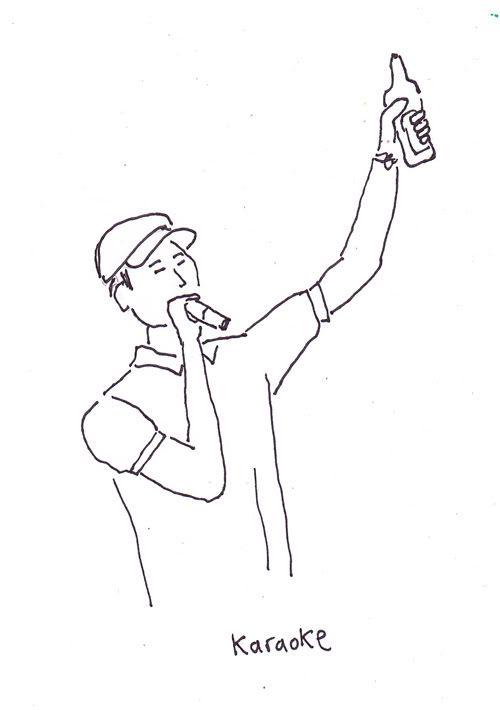
Mike the bartender seems busy, but he gets me my usual.
Smells waft from the kitchen—pizza and burgers—greasy bar food for the late night karaoke crowd. It smells delicious.
I find a seat between my friend Kevin and this young woman with bright red lipstick and Chanel Chance perfume. I am able to identify this perfume because it is what my ex-girlfriend wore. Catching the scent makes me think of her and feel a little sad. They say the scent of smell is the scent most linked to memory. I’ll forget her after a couple drinks , when I am up there singing pretty sloppy and loud rendition of “Anarchy in the UK.”
,,,
Some of my friends and family think it strange that, at age 30, I am starting an old school, hard-core punk band. Punk, it is commonly thought, is a genre of the young—angry teenagers rebelling against their parents, against school, and whatnot. Also, I am a pretty mild-mannered guy. I like Simon and Garfunkel, the Beach Boys, Belle and Sebastian. I was never really a “punk” kind of a guy. Once, in high school, my friend Matt played me a Dead Kennedys album and, frankly, I couldn’t relate. All that anger, that frantic, abrasive sound. Who would want to voluntarily listen to that? Not me. But something happens around age 30, actually a lot of somethings, that plunge me deep into a genre I had avoided like I avoided horror films.
I start hanging out at The Continental Room (hands down the coolest bar in Fullerton), where DJs play old school punk records—bands like Stiff Little Fingers, The Misfits, The Cramps, The Dead Kennedys. Plus, local punk bands play there—not washed-up drug addicts—but young, cool kids in bands with names like The Audacity, Death Hymn #9, The Cosmonauts, and Cum Stain. A lot of these bands are on Fullerton’s own Burger Records label (hands down the coolest record label in Orange County). The music is wild and abrasive and frantic and, frankly, exhilarating. Here I am, a 30-year-old English teacher, finally “getting” punk music. It’s as if a curtain has been rolled back, and I am astonished.
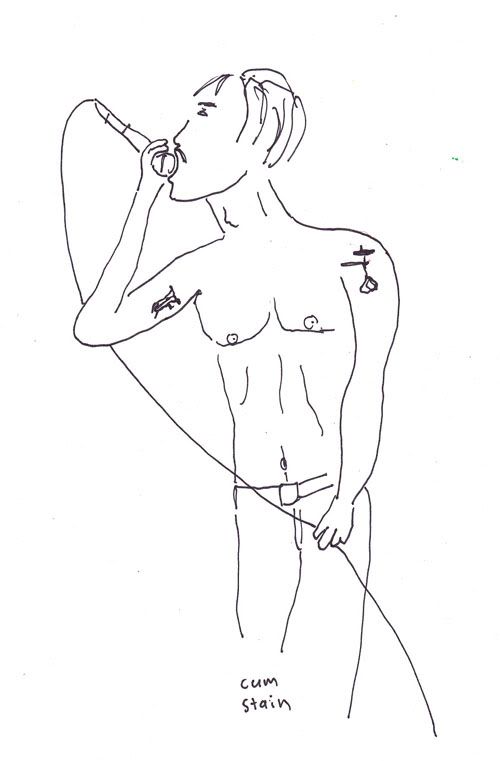
So I dive in head-first, loading my ipod up with both old school and new school punk. It’s an education, and my teacher is Casey, a DJ from The Continental Room, a college dropout who could easily teach a graduate-level seminar on garage, punk, and soul music. I begin with the classics: The Clash, Dead Kennedys, Sex Pistols, The Ramones, and then move on to the more obscure (or, at least, obscure to me)—Cock Sparrer, The Gun Club, X, Flux of Pink Indians, The Screamers, The Germs, The Weirdos, and on and on and on. There is so much amazing underground punk music that it is literally impossible to know it all. I absorb this music like a sponge.
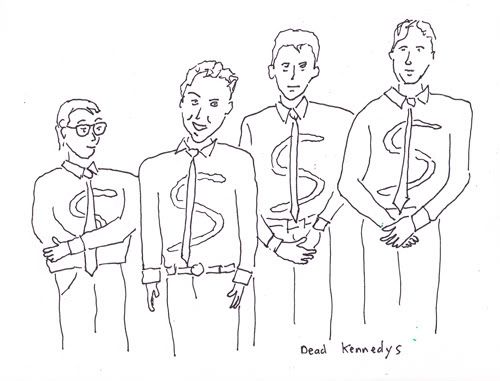
So what is the appeal of punk? For me, good punk is about things. In the 60s, music was about things that mattered. Artists like Bob Dylan, Joan Baez, and Pete Seeger used music as protest and inspired social change. After the 60s, music that meant things seemed to go away, and was almost thoroughly replaced by mindless pop. Or so I thought.
When I discover underground punk, I am like “Aha! This music is actually about stuff!” The Dead Kennedys, The Clash, and a host of other underground punks, used their music to speak against injustice, against war, against oppression. It was loud and abrasive because they were angry, they were outraged, and they wanted to change the world. It was art as protest, against Reagan—era economics, against religious hypocrisy, against American imperialism. The Dead Kennedys were Bob Dylan on steroids.
Don’t get me wrong. Not all punk music is serious. Some of it is downright silly, even gross. GG Allin is a good example of “gross-out” punk. But even the silly and gross stuff seems meaningful. It’s part of a lifestyle of rebellion, of saying “fuck you” to corporate pop culture sameness, and making a culture of freedom and unfettered expression.
So I find myself dusting off my old electric guitar and starting to write music again. When I was younger, in high school, I always had great difficulty writing songs. I was beset by perfectionism, which led to constant frustration and “writer’s block.” Punk music sets me free, creatively. I can write a song with three or four chords, played super fast. I can write about the things in the world that made me angry—corporate greed, health care, mega-churches. I find myself writing lots of songs. It is cathartic and fun.
I convince a couple friends to start a punk band with me: my roommate Landon borrows a bass guitar from a friend, my friend Christie (who has never played drums before), buys a drum set. We start practicing once a week in my apartment. We call ourselves Chicken or Fish. At first, we are terrible. But we keep practicing, writing songs that are angry and funny and fast and sloppy. After a few months of practicing, I convince my friends at The Continental Room to let us play a show. It is one of the most exhilarating experiences of my life.
I think punk music, and the punk mindset, has a lot to say to this generation, to this time and place in modern America. The economy sucks. We are involved in three wars. Corporations have most of the power. Politicians suck. Punk rock still speaks to these horrors, speaks truth to power, gets angry at injustice, beckons us to question authority, to rebel, to not accept things as they are, to make our voices heard, to do it ourselves, to be badasses.
Is punk dead? Hell no.
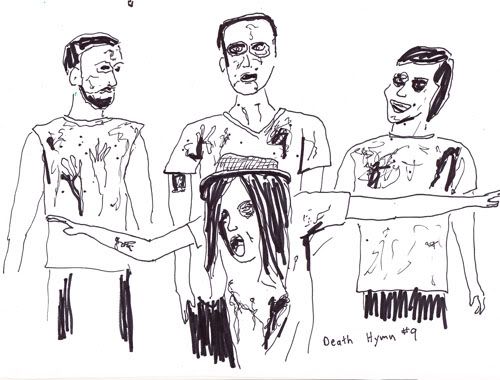
Here we are. Our first practice. Christie takes a very long time setting up her new drum set because she just got it. She started playing drums last week.
Landon’s borrowed bass guitar is slung over his shoulder by a leather belt. He has never played bass.
I am playing a really shitty Fender Squier 2 guitar plugged into my amp that I got in high school. The stickers are a bit dated—Sunny Day Real Estate, Ben Folds Five. Landon and I share this amp.
For the vocals, I bought the cheapest microphone I could find at Radio Shack. When you shake it, you can hear things rattling inside. I have plugged it into Landon’s tiny practice amp. The mic stand is a lamp stand that I duct taped the microphone to.
We are in the storage room behind our apartment. This place has history. This is where Cold War Kids started. Five years later, here we are. Our first practice.
“Any ideas for band names?”
“Last week, I was at this Vietnamese food truck and I heard someone say, ‘Chicken or Fish?’ I thought that might be a good name—Chicken or Fish.”
“It’s not very punk.”
“Neither are we.”
“Speak for yourself. I’m punk as fuck.”
“Alright. For now, we are Chicken or Fish.”
“Let’s jam.”
I start playing the chords for “Hard Travelin’” by Woody Guthrie.
Christie bangs along. Landon thumps along. It sounds pretty bad. We are not skilled musicians.
I step up to the microphone and yell these lyrics:
I been havin’ some hard travelin
I thought you know’d.
I been havin some hard travelin’
I thought you know’d.
Heavy load and a worried mind
Lookin for a woman that’s hard to find
I been havin some hard travelin, Lawd.
“That was okay.”
“Was it punk?”
“Sort of.”
“You know what? We have potential.”
...
I’m on the small stage of The Continental Room, wearing a tank top I made. It says, written with bleach, “Chicken or Fish.” That’s our band. We are all cramped on this little stage: Christie on drums, Landon on bass, Brian and Mike on guitars. This is our third show. Last night, I watched a bunch of old Dead Kennedys videos, so I am trying to channel Jello Biafra. The music screams and thumps behind me and I scream into the microphone and twist around and make weird faces and the crowd, and sometimes spit, just for fun.
I look over at Landon and he bobbing and watching the fretboard, making sure he’s playing the right notes. Christie is slamming away on the skins. Brian is like kicking his leg out at the crowd. Mike looks a little drunk. I am a little drunk too. How else could I do this, I think, or don’t think, as I lift my tank top, exposing my hairy pot belly. I fucking love this shit.
I’m sweating like crazy and out of breath and my head is fuzzy and my throat is hoarse, but this only makes me sing louder! Mike is jumping up and down, wearing his skin-tight Robin costume. I hope he doesn’t fall. Actually, that would probably be pretty funny. Someone knocks a drink off the stage and it shatters on the floor. Fuck it. We keep playing. I scream out: PUNK ROCK, BITCHES!
You wouldn’t think it by looking at us. We are pretty mild mannered. We wear cardigan sweaters. But when we get up here, we are punk as fuck. We are GG Allin. We are The Germs. We are uncorked rage. We spit hot fire into the darkness. We are the underbelly of suburban America. And we’re gonna burn this bitch down.
...
Tonight, the Back Alley bar was full of people, and next door, at Mulberry Street, I was spinning records, and like ten people came in. I was playing good music: Captain Beefheart, The Smiths, Bob Dylan, John Lennon, Audacity, The O'Jays. And yet people chose to go to the Back Alley, where they play top 40 music. Blarg.
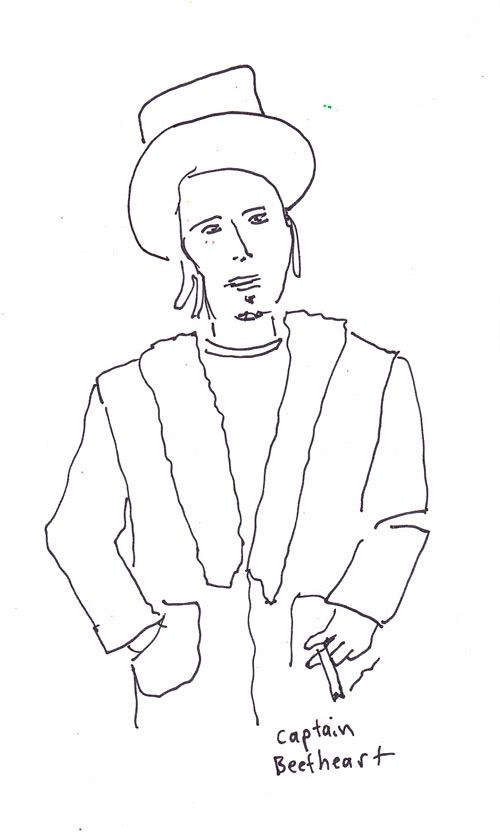
Mike and I are drinking beers on my rooftop. It’s a break during band practice.
“I’m working on a new song called ‘The Average American Male.’ It’s basically about how I have never been in love.”
“How old are you?”
“30.”
“How have you never been in love?”
“I dunno. I just haven’t. Have you?”
“I’ve been in love like 15 times.”
“But how do you define ‘in love’?
“You can’t really define it. You just know it.”
“That sounds a little vague for me.”
“We need to talk about this. If you have gone this long without being in love, you have problems.”
“I mean, I love my family. I love my friends. But romantic love—nada. I have dated girls. I have liked a few girls a lot. But I could never really say ‘I love you’ with any conviction. I always felt like a phony. I guess that’s why I usually break up with someone. Maybe I have like Aspergers or something.”
“I don’t think you have Assburgers.”
“I just read this book called ‘The Average American Male’—it was like the inspiration for the song. And it’s about this guy who has lots of sex with women and looks at porn a lot, but never really loves the women he’s with. It got me thinking—maybe this problem with love is, like, a pretty common problem for American males.”
“Maybe.”
“I once watched this interview with David Foster Wallace, the writer, and he was talking about how his grandparents, by the time they were teenagers, had seen a pretty limited number of kisses—maybe their parents, maybe a couple movies. A kiss was kind of a rare thing. But how our generation, with TV and the internet, by the time we are teenagers, have seen tens of thousands of kisses, and probably sex too. And so, for us, a kiss is not rare. It’s almost cliché. When I think about kissing and romantic love, I automatically think of some fucking movie. It’s not that interesting or rare or beautiful.”
“That’s sad.”
“Yeah. It’s really sad. Maybe the problem is the media.”
“But that is also kind of cliché—blaming things on the media.”
“Yeah. Everything is cliché.”
We drink our beers and watch a seagull fly overhead.”
“How do seagulls get here? We’re pretty far inland.”
...
I’ve got the downtown Fullerton Tuesday night blues. First off, I’m broke, so going out isn’t really an option. Second, I live above Back Alley bar, where this terrible cover band is playing. By “terrible” I don’t mean that they are terrible musicians. They are playing their songs just fine. What I mean by “terrible” is their lack of imagination. They are playing top 40 songs. Radio hits. Music that communicates to the lowest common denominator. Mindless radio drivel. Corporate music.
I don’t necessarily hate cover bands. I wouldn’t mind seeing a Kraftwerk cover band, or a Daniel Johnston cover band, or even a Kinks cover band. But 99 percent of the cover bands I hear at Back Alley, and other bars in downtown Fullerton play top 40 music. I suppose that’s what drunk college kids in Fullerton want to hear. They don’t want anything too experimental or creative or independent. They want the same shit they listen to in their cars. And so that’s what they get.
I consider going out, just to escape the noise of this fucking cover band, buying drinks on credit, maybe breaking my piggy bank. But where can I go? The one bar left in Fullerton that plays interesting music, The Continental Room, has been taken over by this knucklehead who is really into dubstep and, like, house music. And people flock to hear this bullshit. Again, it’s music that communicates to the creatively lazy. If you are looking to get drunk and grind on someone, there you go. But if you are looking to have a conversation, to hear something interesting or moving or creative, you are shit outta luck on Tuesday nights in downtown Fullerton.
So I sit alone in my apartment and drink a couple beers and write. I take consolation in the fact that tomorrow I will help install an art show, and then my band (not a cover band) will play a show in Long Beach, with other non-cover bands. We may not be terrific musicians, but at least we are creative. We make our own sounds. And then on Thursday, there’s Nerdy Thursday, which I started because there was nowhere else to go in Fullerton on Thursday to hear something other than corporate music. And then on Friday we have the Art Walk.
Sometimes I feel like there is a war going on, a war for the soul of Fullerton. On the one side, you have the bar owners and promoters who are making bank selling people the same comfortable shit. And on the other side there’s me and my friends and all those who are poor but resolved to prop up creative music, art, reading, thought, conversation. It’s a war I will keep on fighting. No retreat! No surrender!
...
I walk up to the bouncer and say, “How’s it going?”
He just stands there huskily and asks for my ID. He has this cold, business-like and sort of condescending attitude that immediately makes me want to leave. But some friends from high school are here, so I walk in, and am immediately hit by the smell of stale beer, like someone poured a beer on a towel and then left that towel on a bathroom floor for a week.
A terrible cover band is playing an uninspired rendition of “What I Got” by Sublime, and the singer has spiky hair and baggy shorts and I want to say, “Hey man, 1995 called and it wants its hairdo and clothes and music back.”
But I suppose he could come back with, “1975 called and it wants its hairdo and clothes back.” Touche.
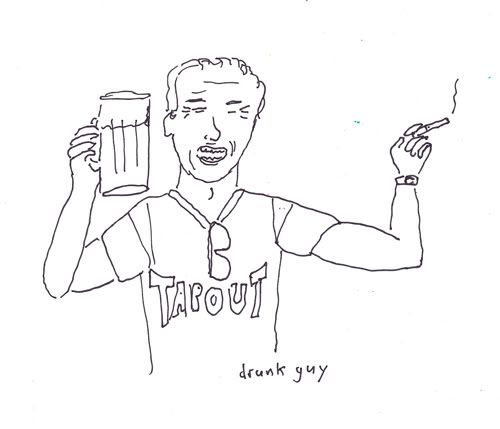
This place depresses me, with its scantily-clad women and “bros” so clearly looking to get laid tonight. This place is uninspiring. So after one beer, I leave and head to another bar where Casey is spinning 60s soul records and I feel at home.
...
I am poor and my throat is hoarse from two punk shows in two days. Awesome!
I am a La Cita Bar in downtown LA, drinking a beer, sweaty as a wrestler. Our band just finished our set, and I am tired and light-headed and my voice is hoarse. I feel great!
“Hey, I really liked your set.”
“Thanks.”
“I like your political songs—that one about health care.”
“Yeah, we try to write about things that make us mad.”
“I get so frustrated sometimes because things are so fucked up, but what can I do?”
“You can write about what makes you mad, talk to people, make art, write a song, blog about it!”
“I’m not an artist, and I’m not a very good writer.”
“I bet you’re a fine writer. I teach writing and so many people get told they are not good writers because of grammar or some other bullshit. If you have passion and things to say, you can be a good writer. You can teach grammar, but you can’t teach passion.”
“Yeah, maybe.”
It is a conversation similar to many I’ve had in the past few years. So many people understand the problems of the world, they see injustice, but they feel powerless to do anything meaningful. Whenever I meet someone like that, I try to make it my mission to convince them that they can change things if they persistently speak the truth and share it with others in whatever medium they want—music, writing, art, blogging, facebook, whatever.
“If you have knowledge and education, I think you have a responsibility to share it. To put it to use for the greater good.”
“I agree.”
“So go do it!”
Chapter 6
“What are words, anyway? If you tell a lie with words, you cause all kinds of people to get sick. If you tell people the real truth, they get together and they get well.”
--Woody Guthrie, Bound for Glory
Dear Beatrice,
A little depressed today. I didn’t get much sleep last night. I was up til like 4am editing Hibbleton Independent because it goes to the printer today.
I am in a weird place, like, mentally. On the one hand, I am fulfilled by all the creative projects I’m involved in—our band playing more gigs, the art opening on Friday, plus the zine show at Bookmachine, the magazine being released in a couple weeks. I feel like I am really rolling, creatively.
But then I am sort of overwhelmed and depressed by my financial situation—I have like $400 in the bank and rent is due. I don’t have health care or car insurance. I feel, as always, like I am dancing on the edge of the abyss of financial ruin.
But I get paid today, and I can probably afford everything—just barely, like always. I hold my possessions loosely, and I am supported by a community of friends and family.
I will survive, as I have always done. I’m a survivor. There are many things I am willing to do without, and a couple things I am not willing to give up, things I will fight tooth and nail for-- the gallery, the book store. These are things I refuse to let go of, because I believe in them so fiercely. And so each day I teach my classes for very little pay and I figure out a way to hold onto what I choose to hold onto. It is a struggle, but one that brings me great joy, and sometimes great anxiety.
And each month a miracle happens. I survive.
And I’m encouraged by something else. Last night, as I was waiting for Tony to finish laying out the magazine, I started writing. Just writing, by hand, in this notebook, and it was like jazz. It was flowing. I was inspired. I was “in the zone” like I haven’t been in a long while. I was an artist using words, blending passion and knowledge and experience into story. I mean, I was REALLY rolling. I was describing an art opening and trying to transform the mundane into the sublime, which I usually try to do when I write, and last night it was just clicking.
One thing I have struggled with, as a writer, is the tension between showing and telling, like the difference between journal writing and story writing. That is the struggle of a memoirist. But last night, I swear, I found such a perfect balance. Around 3am I was writing and I was in a state bordering on the ecstatic.
As an artist, you can’t always be in that state. But, when it comes, let it come. Ride that wave. If you let it take you, you might end up somewhere really beautiful.
So, despite my financial woes and occasional depression, I was inspired last night to continue the task I have done my whole life—to write. I don’t know what will happen with my book. I only feel compelled to complete it. I think it will be done soon.
So I’ll hang in there, through my depression days and lonely nights. I will embrace my friends and my family and my passions, and I will be okay. I will be okay.
Sincerely,
Jesse
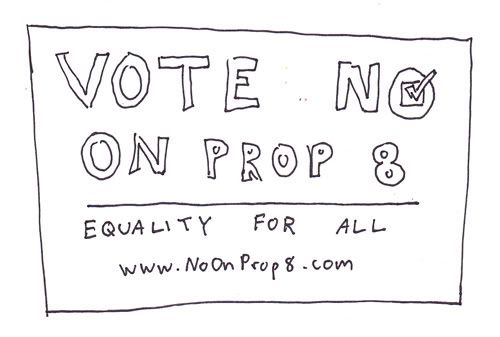
Two men at Subway see a newspaper that mentions Prop 8. One says, “They’re trying to take something unnatural and make it natural.” He has this smug certainty about him. If I am to be a Christian again, it must be of a different sort than what I have experienced.
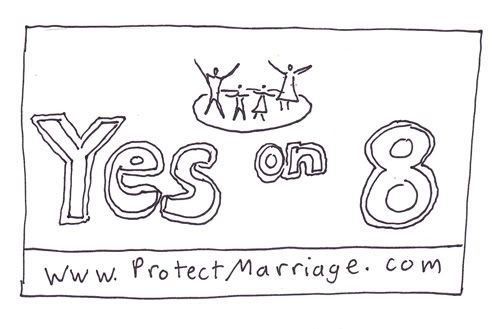
I spend the afternoon reading the Fullerton Observer, the local paper. I have a newfound interest in local politics—in the sometimes murky waters of government budgets and development and corporate interests and propositions and elections.
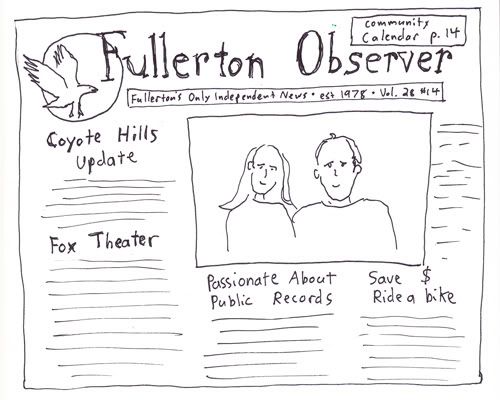
I am unhappy with the corruption I see in politics—corporations basically bribing lawmakers to promote their own interests, regardless of how it will actually affect peoples’ lives.
I have to believe that there are honest politicians, true public servants who feel passionately about the people and community they serve, and are not out to make a buck—people whose reward is the better world they help create.
I am beginning to understand the complex systems that govern my life—bureaucracies and agencies and corporations. Once you sort of understand the system you are in, once you are aware of it, you can perhaps try to change it.
There’s that joke about the wise old fish who swims up to some younger fish and says, “Mornin’ boys. How’s the water?” And they younger fish reply, “What the hell is water?”
It’s about being aware of the culture and society that surrounds you, pulling the curtain back, understanding what exactly you are swimming in.
...
As I drive to my therapist’s office through Brea, through this ugly suburban sprawl that no one else seems to mind, I think about these things and feel a little scared, a little lonely.
Because if you understand the system, and disagree with it, where does that leave you? What can you hold onto? What can you do?
One of the last, large, natural open spaces in north Orange County is Coyote Hills—a 510-acre patch of land in Fullerton. It is currently owned by Chevron, because they used to drill oil there. They stopped drilling years ago, and have spent the last 20-30 years trying to get Fullerton City Council to approve a massive housing/retail development.
Having lived in Fullerton for most of my life, I have watched as development companies (often subsidiaries of big oil) have developed nearly every inch of natural open space. The story of Orange County land use in the past 50 years is one of massive development of open space.
Chevron wants to develop Coyote Hills, and there is a community group, Friends of Coyote Hills, that is trying to protect it from development, to preserve it as a natural open space. I begin following this issue in the Fullerton Observer. I begin attending City Council meetings, listening to Chevron’s proposals, listening to the Friends of Coyote Hills, listening to Don Bankhead and Dick Jones, who preside over those meetings with a kind of Godfather-esque condescending attitude that is, frankly, repellent to me. They do not seem sympathetic to the Friends of Coyote Hills.
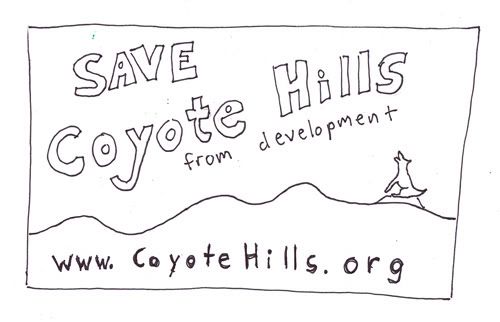
And so, when the meeting comes when the City Council is to vote on the Coyote Hills development, I invite my friends to show up in support of the Friends of Coyote Hills. I prepare a speech. As part of my preparation, I visit the city clerk’s office to look at who had made large campaign contributions to the city council members’ campaigns. I find what I expect. Every member of City Council has taken large campaign contributions from development companies.
When my turn comes to give my speech, I am shaking like a leaf. But I stand up and read what I have prepared. I point out that the only folks who seem to support the development are those with a vested financial interest, including City Council. I point out the obvious—that the vast majority of those present at the meeting are opposed to the development, ordinary residents of Fullerton who care enough about their community to show up in protest. I urge the council to do what is best for Fullerton, and not for the developers. I close with this question, “Will the fact that you have taken large campaign contributions from developers affect your decision on this issue?” There is an awkward silence, which Don Bankhead finally breaks with, “We’re not here to answer your questions.” When I finish my speech, the crowd cheers. I feel a calling.
I am pleasantly shocked when the City Council votes down the development proposal 3-2.
...
About a week later, after an Art Walk meeting, I’m talking to Mike Magoski, a fellow gallery owner, and he says, “A lot of people want you to run for City Council.”
The next day, I walk to City Hall and file my papers. I feel ill-prepared, ill-equipped, but I am compelled by a passion I cannot deny. I am afraid yet resolved. I have learned, in my life, not to be motivated by fear. Instead, I have tried to follow my heart.
I’ve never run for public office before, I am not wealthy, and I am not “well-connected” with local politics. But I have passion, I have creativity, I have a community of supporters, and I have conviction that I can make a positive difference, even if I lose. I am inspired by figures like Harvey Milk, who showed me that, with passion and persistence, you can change the world.
I am actually on unemployment when I file my paperwork to run for City Council. Such is life for adjunct (part-time) faculty in California—you rarely get health benefits, and often don’t get paid over the summer, so many of us go on unemployment for a few months, so we can pay our bills. Suffice it to say that I do not have a big budget for my campaign. I figure I can afford to spend $1000 on my campaign. A typical City Council candidate in Fullerton spends between $15,000 and $50,000, most of which comes from contributions.
I decide not to take campaign contributions from corporations because I am disgusted with the shady relationship between big business and politics, even at the local level. I want to be a true independent, in nobody’s pocket, beholden to no one except my conscience and my constituents.
At first, I don’t want to take any contributions, but when some of my friends offer to kick in a hundred bucks here, fifty bucks there, I take it. I need it.
Because I do not have much money, I have to get creative with my campaigning. My friend Brian Prince designs me a web site and teaches me how to manage it. My friend Casey McCann silkscreens t-shirts for me that my friend Christie Noh, a local artist, designed. The shirts are a hit. I want to make t-shirts that people would actually want to wear, even after the election. Christie does a line drawing of my face with my big beard. Inside the beard, it reads “Jesse La Tour Fullerton City Council.” I probably give away 200 shirts. I also draw inspiration from street artists like Shepard Fairey (who designed the Obama poster) and Banksy. I host poster-making parties at Hibbleton where I invite people to make their own posters from stencils, markers, whatever. I know that if I am going to stand any kind of chance, I am going to have to get lots of people to help me, and they do.
Like Obama, I use Facebook as a free campaigning tool. I make videos of campaign events, of my friends and I making posters. I make little infomercials and post them online. It’s a lot of work, but it’s fun. I enlist photographer friends to document my campaign and post the pictures online.
After a month or so, people start stopping me on the street and saying things like, “Hey, you’re running for City Council.” People I barely know see me and say, “I’m voting for you.” It feels like a true, grassoots-type thing. This makes me really happy because I feel like I am helping people of my generation care about local politics. Young people don’t usually pay much attention to a City Council election, but they are starting to pay attention. Some of my friends who have never voted in a national election, let alone a local one, begin to get excited about the Fullerton City Council race.
Again, I feel like a part of something larger than myself. It’s scary and exhilarating. No longer am I the bookish loner. I am a part, a leader, in a growing community movement.
Through my campaign, I meet a lot of other community leaders. I attend “Meet and Greets.” I meet the Friends of Coyote Hills, the airport manager, the City Council and other city staff. I meet groups like Neighbors United for Fullerton (NUFF), The Chamber of Commerce, etc. At these meetings, I always feel like a bit of an oddball, with my beard and thrift store clothes. The other candidates are clean-cut guys in suits, usually decades older than me. But here I am. I show up and talk to people about the art walk, about Coyote Hills, about affordable housing, about my vision for downtown. For the most part, people are receptive to my ideas. I love talking to people and breaking down generational and cultural barriers, exchanging ideas. For me, that is the heart of democracy—people from different walks of life sharing ideas, concerns, hopes, and dreams.
I take part in candidate forums, which are informative and fun. A candidate forum is sort of like a debate at City Hall, where each candidate is given the chance to answer questions form the community. These forums are great because I am given the same amount of time as everyone, including Don Bankhead, to voice my ideas. I do my homework on local issues, and present my ideas in a way that I think makes sense, and people seem to respond well.
I also have the chance, at these forums, to call out Mayor Bankhead on some bad decisions he made. For example, I point out that, in 2009, he voted to spend six million dollars of Redevelopment funds (taxpayer dollars) to move a McDonalds 150 east. I also call him out on his vote for the Coyote Hills development, pointing out the negative environmental impact it would have on Fullerton. I’m also able to hi-light the issue of campaign contributions. I am the only candidate who can claim he hasn’t taken contributions from corporations. At the end of one of the forums, I overhear an elderly woman say, “Let’s give the young guy a chance.”
In the weeks leading up to the election, my mailbox is flooded with glossy mass mailers from the other candidates—physical evidence of their big bucks. One of the other candidates even buys commercial time on Fox News, during the Glenn Beck Show.
Signs for my opponents sprout like flowers all over Fullerton. What my friends and I lack in mailers and number of signs, we try to make up with creativity. My hand-painted signs stand out, and are physical evidence that my campaign is not corporate-funded, but grassroots.
The Fullerton Observer does a good job of following and publicizing the City Council race, including campaign contributions, which every candidate is required by law to file with the city clerk and the state. One of the lessons I learn from this experience is that an informed voter must pay attention not only to a candidate’s professed views (talk is cheap), but to who is bankrolling their campaign, as this will likely influence the decisions they make in office. The issue of campaign contributions doesn’t get discussed as much as it deserves. In my view, it should be at the forefront of every voter’s mind, and every candidate debate.
As expected, Chevron and other developers contribute thousands to Bankhead and the other front-runner, another former police chief in his mid to late 70s named Pat McKinley.
I am also shocked and disappointed to learn that Political Action Committees (PACs) are spending thousands of dollars on negative attack ads and mailers against the only other “liberal” candidate, Doug Chaffee. I learn that politics, even at the local level, can be a dirty business, especially with the involvement of some of the more aggressive PACs.
Before running for City Council, I did not know what a Political Action Committee was. Shortly after I file my papers to run, I receive a succession of e-mails and letters from various PACs. These usually contained a questionnaire meant to determine if my political views matched with their financial interests, and if they would give me money/endorsement or if they would vilify me. Thankfully, I am enough of an unknown that I sort of fly under the radar of the PACs. Doug Chaffee, however, does not. He is ruthlessly attacked with mud-slinging mailers and robo-calls.
I do not receive any money or endorsements from PACs. In Orange County, they are, for the most part, frighteningly conservative entities. However, the PAC questionnaires give me insight into their values, and consequently into the values of the candidates they endorse and contribute to.
Here’s a good question: If local politicians like Don Bankhead and Pat McKinley take thousands of dollars from PACs and corporations, whose interests will they represent in office: their constituents or the corporations and PACs? (That is a rhetorical question). It is an established fact that there is a direct correlation between campaign contributions and how these men have voted on issues in Fullerton.
I want to shine a light on the (frankly) fucked up way politics works in Fullerton. And I don’t think this situation is unique. In fact, I know it’s not. This is, I think, basically how politics works in America. Money talks.
This is another reason I choose to run for office. I choose to put my faith in the ordinary voters of Fullerton and not in the corporations and PACs. I choose to still believe in democracy, in government of, by, and for the people, not the highest bidder. I choose to view the job of a city council member as a public servant, and not as a status symbol or a cash machine. I choose, despite everything, to believe in the people of Fullerton, in the community I have grown to love.
On the day of the election, I recruit a group of volunteers to stand at the busy intersection of Harbor and Chapman downtown, waving signs and wearing t-shirts.
On election night, I host a party at Mulberry St. to follow the election online at www.ocvote.com. I have put together a few “Thank You” videos for my supporters. It’s a nice culmination of a great community effort.
When the results come in, I do not won the election. The usually suspects win: Don Bankhead and Pat McKinley. However, I did receive almost 5,000 votes.
The Orange County Register runs a story on money spent per vote. The winners spent almost six dollars per vote. I had spent about 20 cents.
I am not disheartened by my loss. Rather, I am inspired. I made a statement. You don’t need corporate bankrollers or PACs or high-level endorsements to make a good showing in a local election. You just need good ideas, passion, and community support. If I could get 5,000 votes with so little money and resources, what could I do with more planning and organization and resources?
There is another City Council election in two years. I will be on the ballot.
...
This is what I will do today: teach two classes, grade 15-20 student essays, create four facebook events, work on getting Hibbleton ready for the opening on Friday, prepare for three classes tomorrow, write a letter of recommendation, prepare for a candidate forum, plus reply to many e-mails.
I think, in America, the cultural tendency is to "look out for number one." To feel content if you have a job and a place to live. But I have found that the more things I do that benefit people other than just myself, the more fulfilling and rich (not money-wise)I find my life. That is the great irony that John Lennon nailed: The more you give the more you get.
Chapter 7
“Here force failed my high fantasy; but my
desire and will were moved already--like
a wheel revolving uniformly--by
the Love that moves the sun and the other stars.”
--Dante, Paradiso
Dear Beatrice,
In this book I have spent the past ten years or so writing, the last section is called “Paradise.” It’s not about heaven (not necessarily), but about what makes for a good life here, in this world. I have, I think, caught glimpses of paradise.
Sometimes, Beatrice, I wish you could see me here. See what these hands, compelled by sorrow and passion, have helped create. Would you recognize me if you walked in here tonight? Would you see, in my eyes, the same scared boy you met in Seattle, the boy who was afraid to take your hand, afraid even to speak? Or would you see something new, a spark in my eyes now. A sadness still, but also a fire, a fire built by a man in a frozen wasteland. A fire I have learned to share. Would you see this, Beatrice? You are married now. I think you work in a hospital in Minneapolis. I have seen your facebook pictures. You seem happier now. I wonder—do you still carry the wounded loneliness I saw in you? I am still lonely, but I have friends. I have learned how to be with people and not to be afraid.
The loneliness is okay. I sometimes wonder if I will meet the woman I will marry at one of these openings. For so long, I was very very desperate. I ached for a companion, anyone who would have me. Sometimes, these days, that ache transforms into a quiet resignation—I am alone, but that is okay. My soul walks with me. My lonesome fiery heart. The ache is part of the beauty.
This is the part of the story where I let you go. Where I step out of the realm of abstraction and idealization, where I step into my skin as a living, breathing human being, and I let you go. I have carried you in my heart through hell and purgatory and now I, flesh and blood, step into paradise.
Sincerely,
Jesse
“What do you do for a job?” Jonas asks.
“I’m a teacher?”
“Why do you do that?”
“I dunnno. I like it.”
“You should have a different job.”
“What should I be?”
“A truck manager.”
“What does a truck manager do?”
“He manages trucks. And then you could let me drive the trucks.”
“I’ll consider it. What are you gonna get at Yogurtland?”
“Oh dude. I’m gonna get a huge one.”
I walk through this suburban neighborhood in Brea, trying to keep up with Jonas on his scooter.
We arrive at Yogurtland and Jonas runs in ahead of me. He grabs one of the big dishes and starts filling it with yogurt.
“I think that’s enough, buddy.”
As I’m filling my own dish, I notice Jonas at the topping bar, dumping spoonfuls of gummi worms into his dish. I think of stopping him, but I do not.
We get to the register, and Jonas’s dish is spilling over with gummi worms.
“Dude, I think you got more toppings than yogurt.”
Jonas laughs, a little mischievously.
“This is what I always get,” he says.
“Yeah right.”
His yogurt weighs three times mine on the little scale.
We sit at a table and dig in.
“So how’s school, buddy.”
“Fine,” he says, but he seems more interested in the music playing in Yogurtland—the song “Dynamite.” He’s kind of bobbing his head to the music as he shovels spoonfuls of yogurt-covered gummi worms into his mouth. Suddenly he gets up and does a little dance and sings along to the song:
“We gon light it up
Like it’s dynamite!”
He keeps dancing and singing for a while, and then returns to his Yogurt.
“Nice moves, buddy.”
We sit in silence for a while, eating. I get the sense that Jonas is way more interested in what song is coming on next than any small talk we can make. So I sit and listen to these pop songs that Jonas knows way better than me, and enjoy the yogurt. It’s kind of refreshing—no pressure to talk. Normally, if you go out for coffee or yogurt or dinner with somebody, you are expected to talk. Not so with me and Jonas. We eat yogurt and listen to pop songs, and we are cool with that.
Afterward, we walk outside, and Jonas sees the big sign for the 99 cent store.
“Dude, we should each get a toy.”
“It’s like you were reading my mind.”
So we head into the 99 cent store. Jonas keeps grabbing things—candy, spoons, cards.
“We should get this! We should get this!”
I feel like a real baller in the 99 cent store with Jonas.
“I don’t think we need spoons, but you can get a candy for later.”
“I wanna get this for my sister,” he says, grabbing a bag of M&Ms.
“Good call.”
We find the toy aisle.
His eyes light on a dart gun.
“We should both get these and then have a dart fight!”
“Yes!”
“I think we should also get a snake.”
“Grab one of those king cobras.”
He stands there holding candy, two dart guns, and a rubber snake, looking like he has found the lost treasure of the Sierra Madre.
“Alright buddy. Let’s roll.”
...
We are together in this old warehouse on the edge of downtown. The walls are pretty beat up, and the back is cluttered with junk—old cars, washing machines, tires, microwaves, scrap metal and wood, tools, records. It looks like a particularly intense episode of Hoarders.
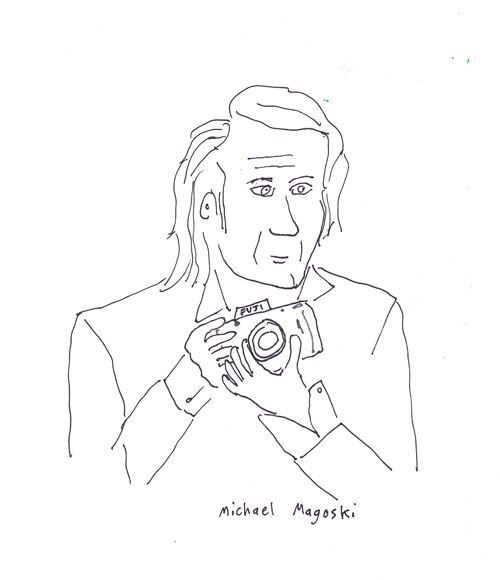
“This is it,” Mike says.
“This is awesome,” I say, “It’s enormous.”
This is the future home of our new gallery. Landon, Tony, Chuck, Steve, Brian and I look around.
These beat up walls with holes, this grungy concrete floor stained with decades of oil and paint and rust—this is beautiful. This is a start.
We stand outside on Santa Fe, looking across the street at the old Donald Duck juice factory, long abandoned.
“Man, imagine if that was an art colony, like The Brewery in LA.”
“We can start here,” Mike says.
Mike’s dad, an aerospace engineer who worked on Apollo missions, who designs spacecraft, owns these warehouses. He has for years. I have no idea why. Developers have for years tried to buy these old buildings to build condos or apartments, but Pete never sold. So here we are. We have stumbled onto this treasure. A blank canvas.
I once read a book called “Neo-Bohemia: Art and Commerce in the Post-Industrial City” about how artists and musicians in Chicago took old industrial warehouses and re-purposed them into studios and galleries and music venues. From the ashes of old school manufacturing, we will make things again. New things. Andy Warhol called his studio “The Factory.” They didn’t make tires or washing machines—they made art.
When we started the gallery two years ago on a corner downtown, people thought we were crazy. An art gallery in Downtown Fullerton? And not just an art gallery—but a contemporary art gallery—a lowbrow/skate/punk/outsider gallery. We showed weird shit we thought was cool. And people came. From sleepy suburban neighborhoods, people came into something new, something different.
At the time, parents and friends asked, “What do you know about running an art gallery?”
Nothing really. We just like art.
I think conventional wisdom is that you need grants and funding and bureaucratic blessing to do something like that. You need some big museum to say, “You can do this.” But I have seen what bureaucracy can do. I have seen the City of Fullerton talk about renovating an old movie theater for years, and nothing happen. I have attended the city museum openings, and been underwhelmed.
Our ethos is DIY—do it yourself. That’s how this shit gets done. So we will do it ourselves. We will patch the holes in this old warehouse. We will do the drywall and painting. We are not contractors. We are people who figure things out and do them.
We will bust our asses. We will get home from a full day of work, and then do some drywalling.
We don’t get paid. We don’t have grants or bureaucratic blessing. We have only our hearts and hands. We will have help from friends who share our dream. John says, “I know how to patch a wall,” and he does it. Chuck says, “I know how to do moulding” and does it. That’s how this shit gets done.
In one month, we accomplish more than any redevelopment agency or historic foundation can do in a year. We create the beginning of an art colony. It is human beings coming together, doing things with their hands, each according to their abilities and knowledge.
Mike walks through with a big Polaroid camera, taking pictures. We have to document this. This feels important. It is something bigger than any of us individually. I wander through with my camera. Landon cleaning old windows, Chuck nailing wood, Tony sanding a wall.
Vince, the semi-homeless guy who lives out back, pushes a mop around. Vince talks to himself, but his conversation is very down to earth. He is narrating his thoughts aloud.
“I gotta clean this floor. It’s filthy. That place hasn’t been cleaned for years. I gotta clean this floor. I better change the water. This mop is pretty old...”
Vince looks a little beaten down by life, but his eyes reflect a sincerity. You never have to wonder what he is thinking—he says it all the time.
Part of me wishes everyone was like this—that I could wander around with my video camera, filming Chuck hammering nails, Tony sanding the wall, Landon cleaning the window—each saying aloud exactly what is on their minds.
If I had the courage of Vince, I would say something like this:
“I am filming this. I am tired. This is amazing. We are tired. But this will be amazing. Mike, I can’t believe you made this happen for us. Landon, I know you get sad about the fact that we don’t make money, but trust me, we can do this. Tony, you are a little irresponsible, but you are one of the coolest artists I know. Chuck, you can’t spell very well, but you are good at making things, and you have an eye for beauty. You have a vision with your moulding. Steve, I hope you understand what you got yourself into. Prepare to lose money with us, and to be okay with that. Fuck money! Fuck business plans and all that capitalist bullshit. This is real! This is real! We are doing this! I’m sorry we don’t make money, I’m sorry about that, but do you know how rare and beautiful this is?”
I wander around filming, with these thoughts in my head. My head a little cloudy from fatigue. I think I will sleep well tonight.
I walk home and make some soup and watch Where The Wild Things Are. Max and his Wild Things build a fort together, and for some reason it really moves me. This idea of people creating something together. Making things as we want them. Not accepting things as they are--making them new. I feel like that's what the gallery is all about, and this whole new Magoski Arts Colony. It's like we're a bunch of kids building a fort together. Making something in this world that we want to make, not because we have to or because anyone is telling us to, or because it's gonna make us lots of money or anything stupid like that. We are doing it because it's fun, and we want to.
Maybe that sounds cheesy, but it sounds good to me.
...
I sit in the CSUF cafeteria, eating a bean and cheese burrito, watching students rushing about and eating and talking. I watch these young people and I wonder what they will do with their lives. Will they be ordinary or extraordinary? Will they take the safe road—boring job, family, house? Or will they take the more difficult road into unknown territory? Will they follow their childhood dreams, or let themselves be pressed into a boring mold? They are at such an important age, these young people, when they can choose the path of their lives. I wonder—what will they choose?
...
It’s 1pm on a Friday afternoon. I’ve just finished teaching an English 101 class at Cal State Fullerton. I’ve feeling a little overwhelmed by the number of papers I must grade over the weekend. But I have more immediate concerns.
I stop at Ralphs to buy sugar and flour to make wheat paste, which I will use to put up a big poster outside our gallery. We have an opening tonight, and there is a lot to be done. I text Chuck to ask him to pick up a couple cases of wine. Now I’m in line at Kinko’s, waiting to have the big poster printed. When I pay for the poster, I have this familiar internal debate: should I use the gallery credit card or my own credit card? Technically, I know, I should use the gallery card. That would be the fair thing to do. But, as usual, I use my own credit card, because I know our financial situation. I know that we can’t really afford this, but I can.
Back at home, I make the wheat paste and send out a facebook message about our show.
I zoom over to the gallery, where Brian and a few artists are installing the show at PAS Gallery, our neighbors. We hung our show last night, but there’s still lots to be done, like the labels. Shit. I gotta make the labels. But first things first...the wheat paste poster.
Putting up wheat paste posters is actually one of my favorite things to do. There is a rich history of street artists who have used the medium of wheat paste posters. Normally, wheat pasting would be a felony, like any other type of “graffiti.” But this is MY business, and so I can wheat paste the hell out of it.
While the poster dries, I start typing up the labels. Dammit. One of the artists forgot to give us prices, so I call her and for the 84th time I have the semi-awkward conversation about pricing artwork. I ask her to price it as low as possible because our patrons, in general, are not wealthy. Our patrons are other artists, students, families, neighbors. In this economy, not many people have a thousand dollars lying around to buy a painting.
Nick arrives, eager to help. Trying to sound as un-bossy as possible, I ask him to set up the DJ station.
Steve arrives. I ask him to fold t-shirts.
On art opening days, I usually have a mental checklist scrolling through my head all day, a checklist that usually doesn’t get completed until around 6pm, when the opening begins. Wheat paste poster? Check. Labels? Check. Wine? Chuck. Facebook? Check. Sweeping? Damn. Still gotta sweep. I bet Landon will do that.
Tony cruises in on his skateboard, wanders around taking pictures.
5 o-clock. Crunch time. Oh shit. The vinyl sticker. The show title for the front wall. I feel bad calling Casey, our vinyl sticker guy, because every month we give him the design super last minute and we’re like, “We need this in two hours!” As I’m texting Casey, he walks in with the vinyl sticker. Phew. I give him $40, and then Tony and I put it up. Alright. The show is ready.
As I drive home for a quick shower and an even quicker dinner of cold pizza, I start thinking about a playlist for tonight. What do I want the vibe to be? Punk? Dance? Everything! We will improvise, like we always do.
As I’m finishing my pizza, I get a text from my dad, “We’re here. Where r u?”
I head back over, a little tired and anxious, but ready. What I really want is a cup of Candace’s sangria and a cigarette. After the stress of the day’s preparation, it usually takes me about three sangrias before I can actually start enjoying myself.
I hug my parents and grandma, warning them that some of the pieces are, as usual, “a little risqué.” They don’t seem to mind. They smile and eat their cheese and crackers and look at the art.
The people are starting to come. When we first opened the gallery, our crowd (being mostly in their 20s, like us) wouldn’t really show up until 8 or 9. But now that we have a full-blown Downtown Fullerton Art Walk with over 25 venues, people come earlier, and the crowd is way more diverse—families, old people, middle-aged people, people of all ethnicities and socio-economic levels. A good cross-section of the Fullerton community. I like it better this way. The young people still come out later, ready to party, but this feels more like a community art event, which it is.
Nick is on the turntables (actually only one turntable—the other one broke), playing New Wave. He digs the New Wave. I’m more of a punk.
Lots of little conversations. Leah from the Chamber of Commerce. A super old artist describes his work as “magical seascapes.” He wants a show at Hibbleton, and I don’t have the heart to tell him that seascapes are more of a Laguna Beach thing. I take his card, which has a watercolor seascape on it.
A few sangrias in and I’m feeling good. I hop on the turntable and play some punk classics: Dead Kennedys, Toy Dolls, Stiff Little Fingers, TSOL. Setting the vibe.
Landon takes over. He plays more rock n’ roll—The Kinks, electric Dylan, Cash, Howlin’ Wolf.
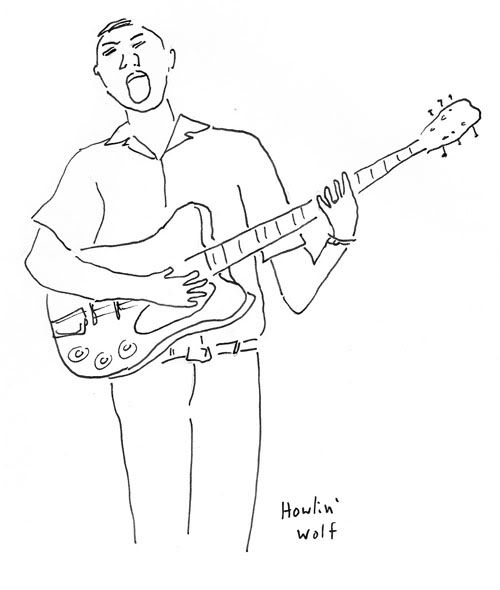
I wander over to The Violet Hour, Mike and Candace’s studio. Mike is at his DJ station, playing ambient music with spoken word stuff layered over it. He kind of looks like Andy Warhol. Candace is at the bar, pouring sangria. She is wearing a big pink wig and a nurse’s hat.
“You need another one, Jesse?” she asks.
“Indeedy.”
More little conversations. City council member Pam Keller. The weird skinny dude who used to play at our open mic nights and make everyone feel uncomfortable.
“When you gonna bring back open mic nights,” he asks, a little aggressively.
“I dunno. We kind of stopped doing those. Have you checked out Max Bloom’s open mic nights?”
I wander over to the photo booth, where John Keller, one of my favorite people, is making buttons.
“Wazzup, JK?”
“Hello Mr. La Tour.”
“I’m like halfway through that Richard Feynman book you loaned me. It’s awesome!”
“I love the way his mind works.”
“Yeah, he’s this total physics genius, but he writes in a way that anyone can understand what he’s talking about.”
“Genius.”
I bump into Landon.
“Any sales?” I ask.
“I think we sold a t-shirt,” he says, a little bummed.
“That should cover the rent. One t-shirt.”
“We are rollin’.”
What can we do but make jokes about our utter financial failure? But this place is packed. An art gallery on a Friday night in downtown Fullerton is full of people. If you said that three years ago, people would have thought you are were fucking insane. Maybe we are a little insane for doing this. But it feels good. It feels right. Money don’t make our world go ‘round. Music and art and people and love. That’s what makes our world go ‘round. And this place is full of those things. And it is beautiful. In this little warehouse in suburban America, we have found a kind of paradise.
I walk around, my head a little cloudy now from the sangria, drinking all this in: the art on the walls, the faces familiar and unfamiliar, the music. Now that the checklist has faded from my head, I drink all this in, and all this is beautiful.
End
Appendix A:
A Love Letter to Fullerton
Dear Fullerton,
I know we have had our disagreements. For a long time, I hated you. I hated your 30 bars in 5 blocks. I hated your fighting. I hated your jay walking tickets. I hated the vomit on your sidewalks.
I hated your segregation: whites north of Chapman, Mexicans south of Valencia, Koreans west of Euclid, blacks almost nowhere.
I hated your politicians bankrolled by corporations like Chevron, your conservative political action committees, your cushy pensions, your short-sighted bureaucratic buffoonery, your closed sessions.
Yes, my dear Fullerton, we have had our disagreements. I'll admit, sometimes I wanted to walk out on you--move to Long Beach, San Francisco, Portland, even LA. Somewhere more beautiful.
But I stuck around. I stayed because, despite your ugliness, I see potential beauty. Despite your stubbornness, I see change. Fullerton, I stuck around because, in my heart, I love you. I love you for the city that you are and for the city you might become.
I love your artists, your writers, your teachers, your volunteers, your non-profit arts and education programs. I love your arboretum. I love your open spaces, your trails and hills.
I love your architecture, your WPA buildings, your El Camino Real, even the Fox Theater, though I wish they would hurry up and open the damn thing.
I love that, every day, walking downtown through my neiborhood, I see people I know, I see my friends.
I love that you accept the homeless and don't bus them away like they do in that soulless corporation town of Irvine.
I love your mom and pop shops, your delis and restaurants. I love Taqueria de Anda late on a Friday night.
I love your music--Burger Records, The Continental Room, Troy Bootow, Casey Melton, Adrian Rodriguez, The Audacity, Sean Starling, Becky Holt, and all the people making music for love. I love your punks and angel-headed hipsters and all the lovely sounds they make.
I love your schools--Fullerton Union High School, Mr. Kopacki who showed me I have a voice, Fullerton College, Deborah Davidson, who showed me I can be an artist, Cal State Fullerton, Cornel Bonca, who showed me writers can be badasses too.
I love your galleries, your downtown Fullerton Art Walk, The Magoski Arts Colony, Out of Vogue, Max Bloom's Cafe Noir, and all the other venues. You are the faces of Fullerton's bright future.
Fullerton, if at times I seem angry, know that it is only because I care. Oh Fullerton, one day you will be glorious.
Love,
Jesse La Tour
Appendix B:
Advice for Teachers
Having taught college English for almost four years now, I feel I've learned a thing or two about how to be a good teacher. Granted, many of my colleagues have been at it for longer than me, and are much better at it than I am, but here are a few things I've learned, for anyone who is interested in teaching English:
1.) Teach what excites you. I often tell my students, "You write better when you write about things that matter to you." The same goes for teaching.
2.) Change your syllabus every semester, to avoid stagnation. There is so much amazing stuff to read and write about. Why make your students read the same things every semester? You will get bored with it, and if you are bored, your students will probably be too. It's your job to help your students see that reading and writing are anything but boring.
3.) Let your personality shine through. I have had teachers who were almost robotic with how they presented information and conducted their classes. Be yourself! Swear! Share things you've written, what you're reading, what you're involved in with your students. Let them see that you are a human being with thoughts, opinions, and passions.
4.) Be flexible. Don't get enslaved to your syllabus or course outline or lesson plans. Some of my best classes took place when I decided to change a lesson at the last minute. You need to prepare, of course. But a good class is like jazz. There is preparation and improvisation.
5.) Be a constant learner. It is literally impossible to know everything about your subject. Thus, we can never stop learning. Don't be afraid to let your students know that you are still learning, that you are not a Jedi master, that mastery of anything is an illusion.
6.) Be inspiring and empowering. Some of your students will come into class with the mindset that they are "a bad writer." I tell my students that anyone can be a good writer, that writing, like anything, takes practice. But, if you have passion and ideas, you can change the world with your words.
7.) Don't be lazy. I hear teachers complain all the time about how students are lazy. But no one talks about teachers being lazy, but they sometimes are. I have had teachers who gave me little or no feedback on my writing. Just because you have tenure doesn't give you the right to be lazy.
8.) Be accessible. Some teachers put up this intimidating, authoritarian front, to the point of being scary. Don't be scary. Think of your students as co-learners, as friends.
9.) Don't be boring. Boring people are not interesting or inspiring. If you notice that your students have glazed expressions or are falling asleep, don't blame them. Blame yourself, and change.
10.) Have fun! Teaching is a job, but if you are teaching from your passion, from your heart, it can be extremely fun. Young people are so full of ideas and passion. If you can tap into that, your classes will be awesome!
There you go, future teachers of the world!
